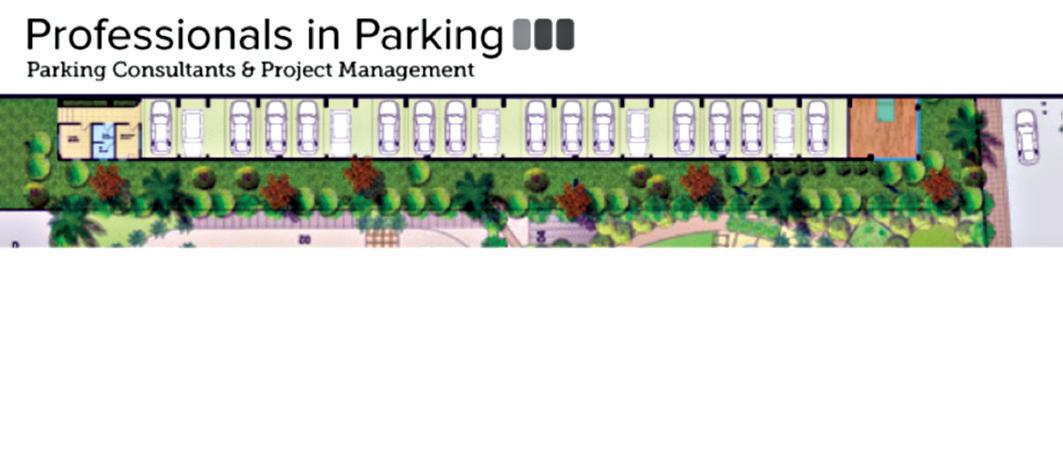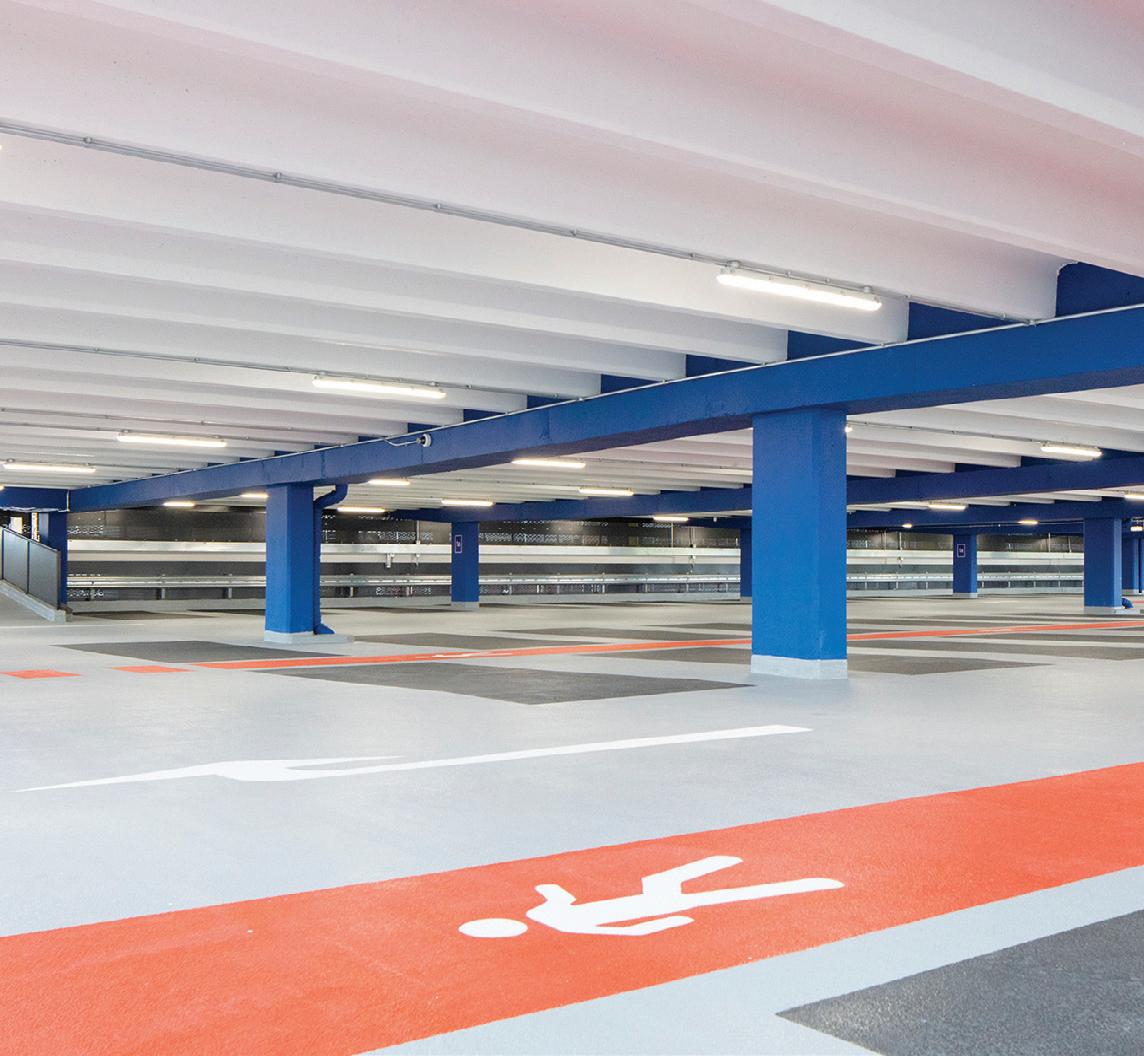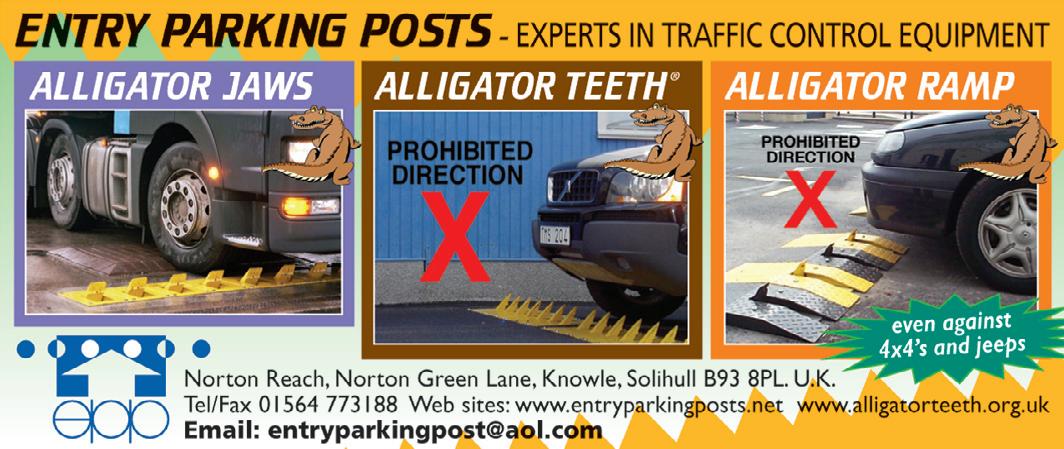T HE POWER OF PART NERSHIP







Chimes playing Greensleeves. Parents and children lining up to buy a Fab or a soft cornet, preferably topped with a Flake (well, who can resist a 99?). Ice cream vans are a colourful symbol of summer guaranteed to raise a smile. That is, unless, you are a cyclist trying to cross Westminster Bridge. Ice cream vans have been illegally parking on the bridge this summer, their customers blocking the dedicated cycle paths.
The problem was flagged up by cyclist Travis Nelson, who travels with his deaf cat Sigrid in a front basket. Nelson videoed himself trying to use the cycle path. “Cycling through there is a complete nightmare when the ice cream van is parked up on the double red lines,” he said.

Nelson tweeted Lambeth Council and Metropolitan Police asking them to do something, saying that accidents had been caused by the obstructive vans. The Met Police roads and transport account replied: “We are aware of this issue and the vehicles are issued with red route TfL fines. We are working on a longer-term solution as this enforcement clearly does not deter them.”
The fact that the ice cream van keeps coming back suggests that enforcement alone no longer works. Transport for London, which shares responsibility for the cycle lane, said the van is fined whenever it is spotted, but was looking at fresh approaches. Lambeth Council said it had been working with partners to tackle unlicensed street trading on Westminster Bridge. A spokesperson said: “In May the council secured fines against two unlicensed street traders at Croydon Magistrates’ Court, as well as being awarded costs. We work on this with the police, the South Bank Business Improvement District and Westminster Council.”
An interesting observation was made by leading transport economist John Siraut at Landor LINKS’s Enforcement Summit 2022. In his keynote talk, reproduced in this issue, Siraut suggested: “The problem recurs because the profits made by the ice cream vans are far higher than the fines. It’s just a cost of doing business.”
But what does Travis Nelson’s feline co-pilot think? “Sigi’s pretty indifferent to it,” he reports. “She likes people and she’s not that interested in ice cream –and most of the customers are considerate and eventually let us through.”


 Mark Moran Editor
Mark Moran Editor


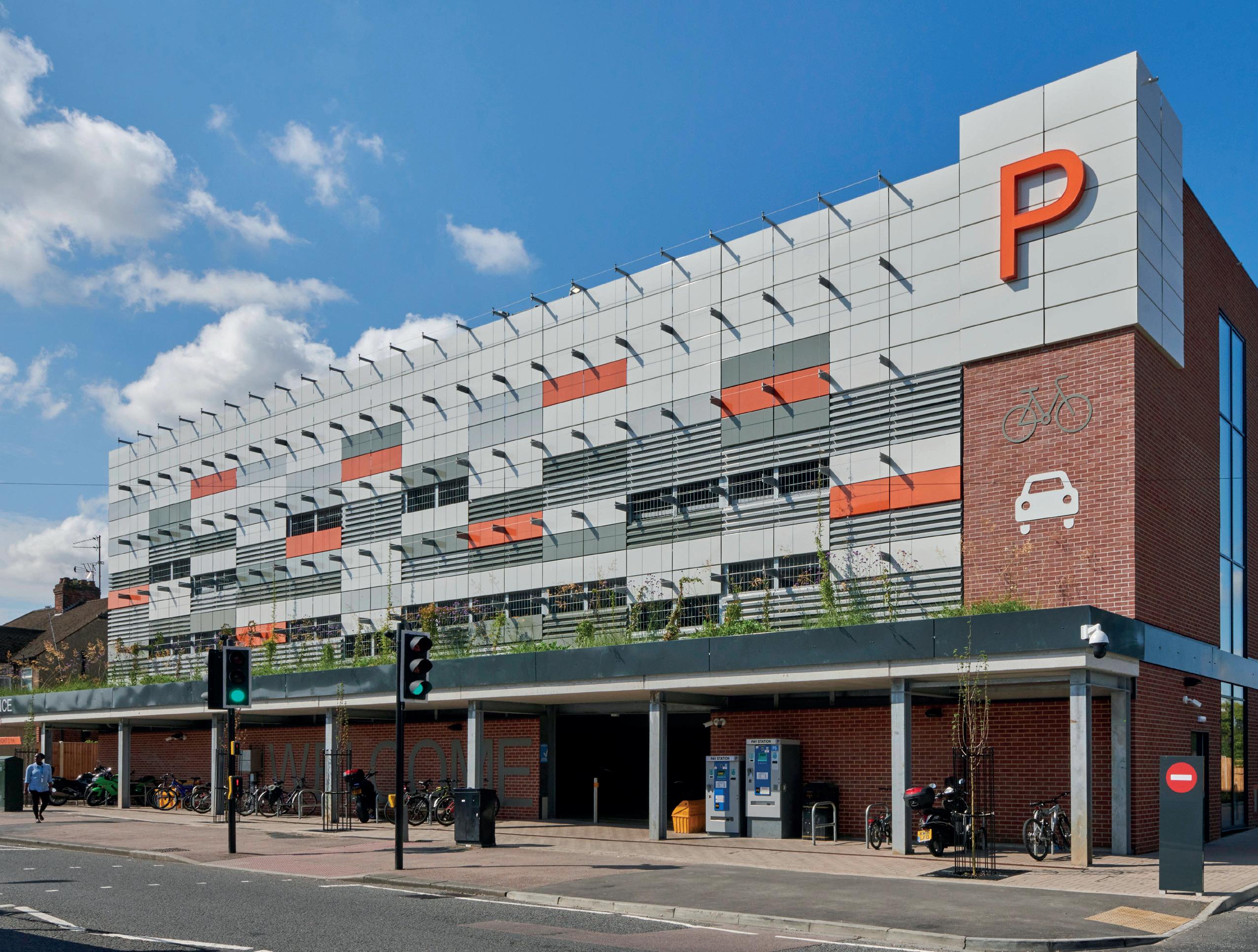



Editorial Managing editor:
Mark Moran
Tel: 020 7091 7871

mark.moran@landor.co.uk
Deputy editor: Deniz Huseyin Tel: 020 7091 7872
deniz.huseyin@landor.co.uk

Editorial director: Peter Stonham
Production

production@landor.co.uk
Advertising, sponsorship, marketing and exhibition packages
Jason Conboy Tel: 020 7091 7895
jason@landor.co.uk
Subscriptions
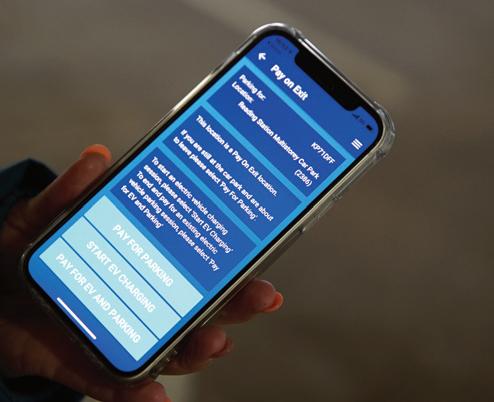
Christina Pierre
Tel: 020 7091 7959 subs@landor.co.uk
Accounts
Irina Cocks Tel: 020 7091 7854 irina.cocks@landor.co.uk





Managing Director
Rod Fletcher Tel: 0191 280 1410
The British Parking Association has unveiled its new presidential team at a reception at the House of Commons. The new president is Jade Neville, head of user experience at Conduent Transportation. In her first speech as president, Neville stressed the importance of encouraging a diverse and inclusive working environment, and promised to represent all the different elements that make up the parking sector, which is one that spans the public and private sectors. She said: “Let’s not explore what cannot be done, let’s instead open our vision to what can be achieved.”
Neville has spent the past year serving as vice president to Mike Marrs, business development director of Marston Holdings. Neville’s vice president during her term will be Stuart Harrison, head strategy officer at UK Parking Control, who used LinkedIn to state: “I am very pleased to become vice president and support Jade in her presidential year.”
The BPA’s polices are decided by elected members. This year
the association’s board has a new chair, with Anjna Patel MBE taking over from Parking Matters’ Nigel Williams. Patel, who is principal officer for Sandwell Metropolitan Borough Council’s parking and safer and sustainable travel team, said: “Member support will remain at the heart of everything that we do. Strengthening our connected membership community is a key priority. By providing increased access to knowledge, best practice and thought leadership, we can continue to deliver excellence in the services we provide and grow our membership community.”
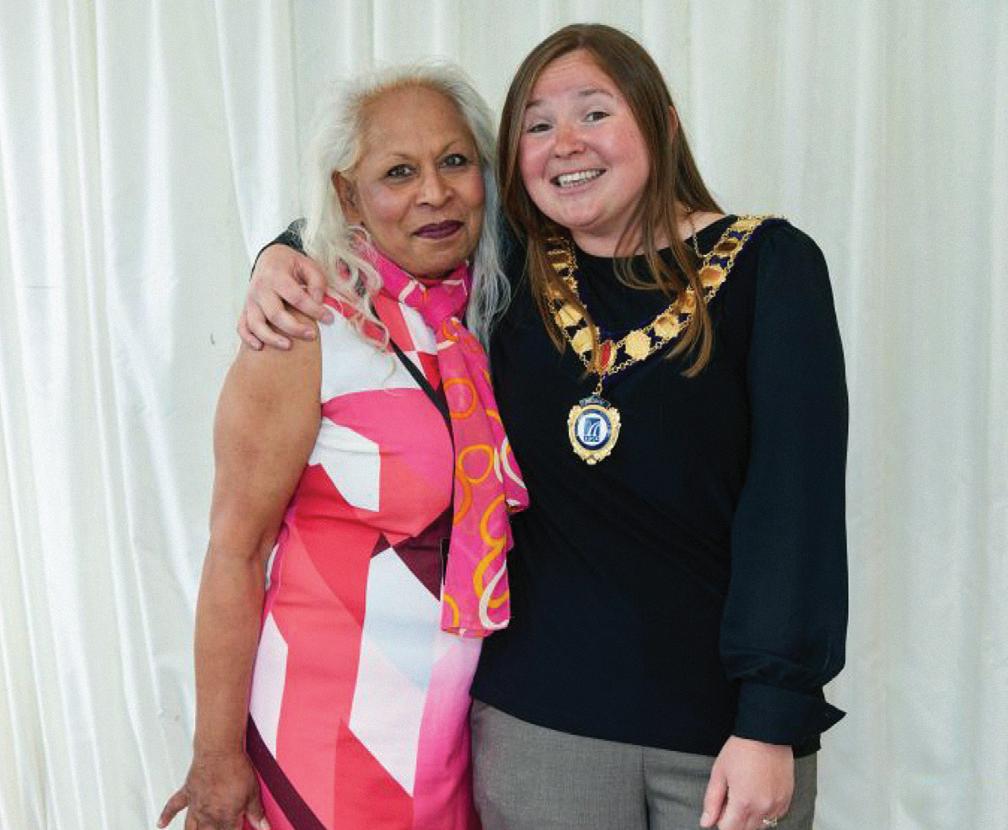
The new leadership team is leading an association that now has 742 corporate members and 570 individual members, according to the annual report for 2021-22. The annual report recognises there have been challenges presented by the pandemic and ongoing uncertainty around the Parking Code of Practice. However, it states that the association has worked to support its members and meet the needs of motorists in towns, cities and rural areas.


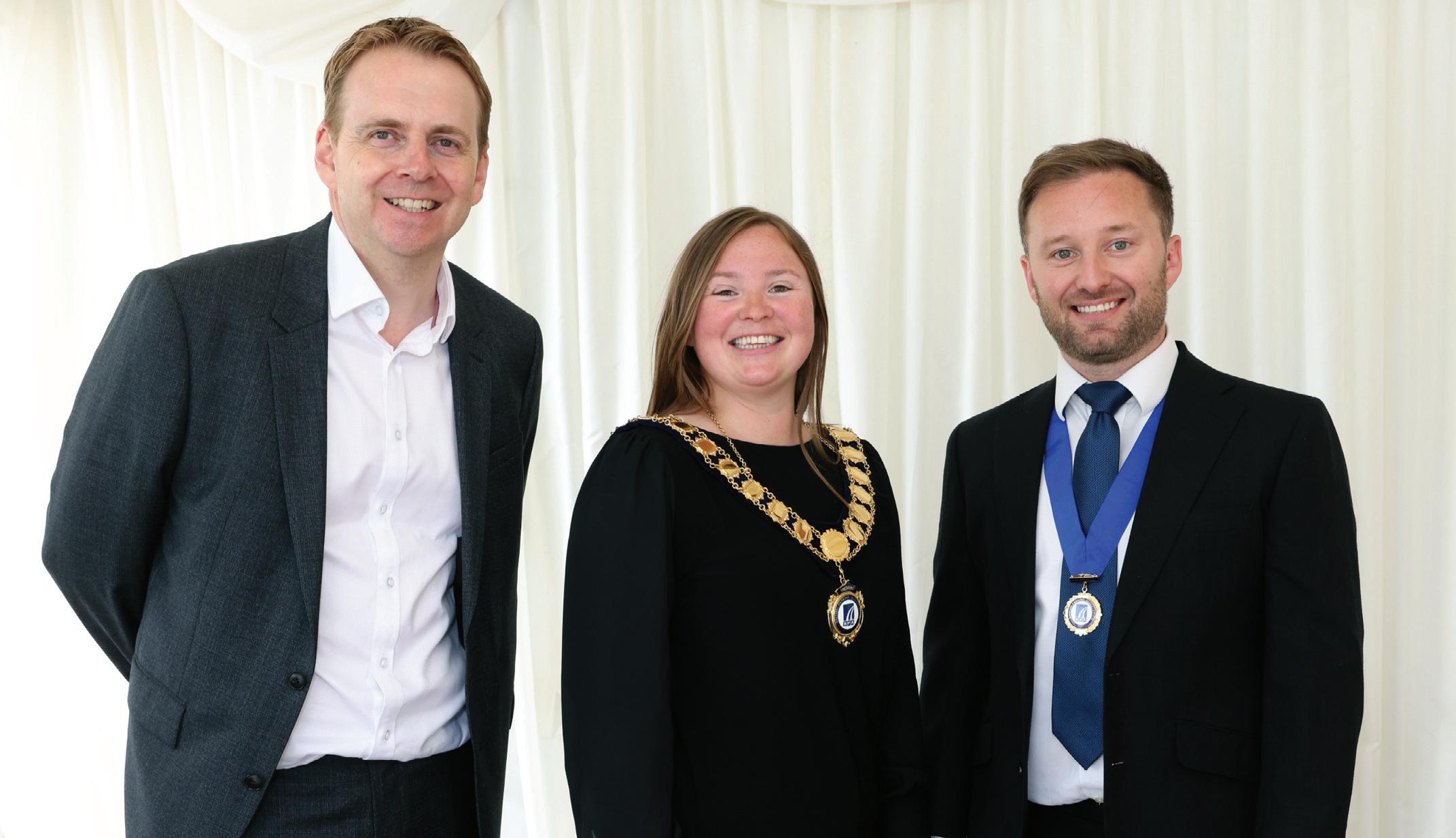
In his forward to the report, BPA chief executive Andrew Pester wrote: “Whatever the challenges, our association will continue to provide a place for members to connect with one another to share experiences, knowledge, and ideas to help tackle unprecedented challenges and seize new opportunities. A not-for-profit association with a thriving membership is what makes us strong.”
Daniel Zeichner MP, Labour’s shadow environment minister, hosted the BPA president’s reception at the House of Commons on 7 July.
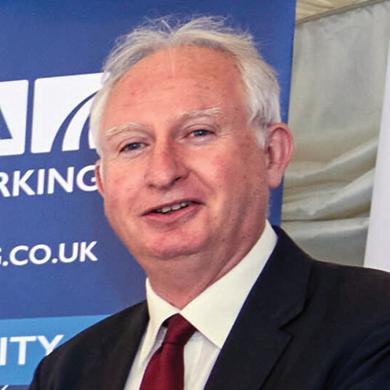
Zeichner said: “The British Parking Association plays a crucial role in raising government and public understanding of the need for effective parking management, something which enables us all to live in cleaner, safer, less congested world in which we can move around freely and easily. Access to places and people would be significantly harder without parking.
It is great to see how the BPA is continuing to champion a ‘Positive Parking Agenda’ to build confidence in the parking sector, change perceptions and challenge misconceptions with the aim of making the parking experience a better one for all. I am delighted by the BPA’s support for the Parking (Code of Practice) Act and most of the measures it seeks to introduce, including a single code, a single appeals service and a standards setting body.”
The British Parking Association’s new presidential team makes its debutAnjna Patel MBE and Jade Neville
It is such an honour to have the opportunity to represent a sector I have had such joy forging a career in over the past 15 years. The reality is, I didn’t leave college to aspire to be a parking attendant, and later a, civil enforcement officer. I think it’s safe to say that many of us fell into parking, but looking around this grand setting at the amazing people we get to work with, we haven’t done too badly, have we?
I was going to tell you about how I started my career in parking, notably the story about how my Mum threatened to disown me when she found out I got the job. But when I practiced my presidential inauguration speech in front of my wife Vicki – who also works in parking – I noticed her eyes start to roll to the back of her head. It is a look I have seen many times! Nevertheless, I’m happy to report Mum didn’t disown me and she’s now super proud.
The point I took from her reaction made me think about the importance of looking forward, rather than spending too much time looking back. At the grand age of 52, our wonderful association is doing lots of that too – looking forward to be ready for the future.
From civil enforcement officer to BPA president is a journey I am extremely proud of, and one that I hope will not be a uniquely trodden path. As I looked around the terrace at the House of Commons, I saw many people that have worked their way through the sector having started in frontline roles.
From enforcement agents to IT support teams and civil enforcement officers, from senior managers and directors. We need to consider those who have brought so much to the sector from elsewhere. ‘Falling’ into parking at a later, more established stage in their careers – they bring so much richness in terms of new perspectives.
I would like to thank our immediate pastpresident Mike Marrs for his valued input over the past 12 months. He has been an incredible ambassador for the sector, channelling his passion for parking into encouraging the next generation to step forward and get involved.
When sitting down to consider themes for this term as president, I looked back over my career and considered what I thought was my purpose. A common thread was challenging the norm by asking the questions ‘why has it always been done this way’ and ‘why would we continue to do it that way’?
I decided that this year there is no theme for my presidency, only the desire to have a fresh perspective. Let’s not explore what cannot be done, let’s instead open our vision to what we could, and can be achieved.
I suppose not being satisfied with the term “this is how we have always done it” is how I have come about being here today. To put it into context, as a 6-year-old I was running around the children’s play area Mike Marrs used to own. Now that surely makes me the youngest ever BPA president!
My journey and experience will aid me in really hearing what you have to say and provides me with a genuine understanding of
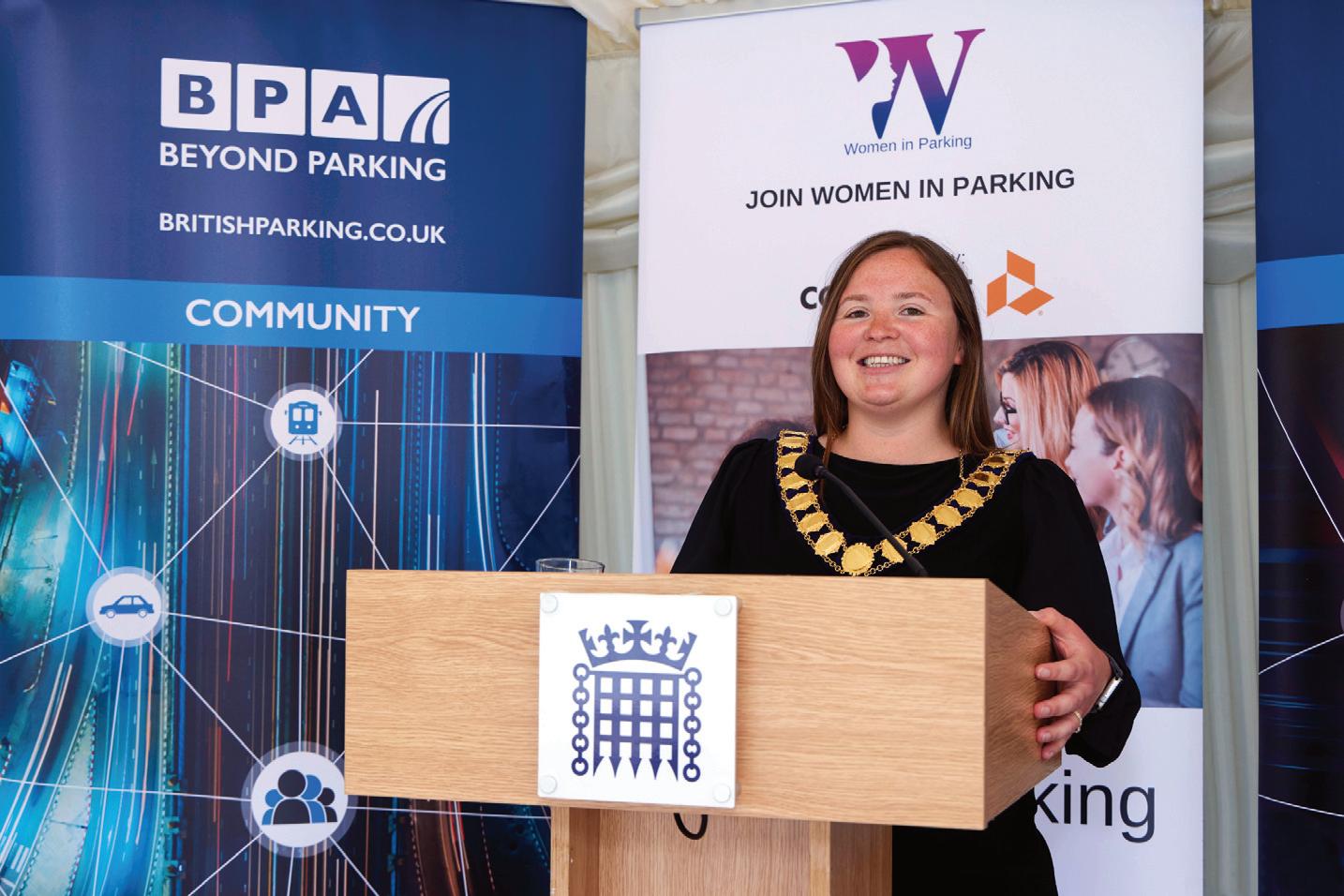
what’s important to our membership community.
From working to ensure front line teams get the support they deserve against abuse, to helping people find their voice, and ensuring there are platforms for their voices to be heard. I hear you and I will continue to listen, learn, and represent you to the best of my ability. Together we can seek to:
• truly unite our community (bridging the gap between public sector, private operator, technology, and solution providers) to work together and drive the sector forwards
• help make transport safer for women, girls and vulnerable groups – making journeys for all, safer, cleaner and better
• work together with the wider transport sector to improve consumer experience, enable greater decarbonisation, and drive technology.
Let’s work together to establish what we can bring to the table, to bring about much needed change.
Another topic close to my heart is growing our welcoming, inclusive and diverse membership. Being a diverse sector is something we can absolutely pride ourselves on, but it is high time that we focus on how we can tap into that strength and bring all of our colleagues along on the journey.
We will be focussing on creating new ways for people to get involved. From networking and professional growth opportunities, to focus groups that will play vital roles in shaping future strategy, there will be no end of opportunities for members to get involved.
The recent elections demonstrated just how much talent is out there, and just how keen everyone is to get more involved.
Creating communities such as Women in Parking (WiP) that support conversations,
connections, and career development beyond what you get from a training programme, by supporting what is increasingly available through the BPA channels.
I have been fortunate to know and have worked with many inspirational women in my life, too many to name them all.
One is my mother-in-law Karen, who recently retired after serving 40 years in the NHS as a ‘critical acute care senior nurse specialist and junior doctor coordinator’ at Southend Hospital. In this role she was a key part of the team that saw us through the darkest times of the recent pandemic. I’d also like to thank my wife Vicki: I simply would not be here without her support.
Our backgrounds, upbringings, views and opinions may differ, but that is what makes it better, richer, more inclusive, and arguably, much more powerful.
The power comes from the partnership, not the strength of the personality.
This year the BPA will start benchmarking where we are, and to achieve this we need your support. I urge all of you and all of your colleagues, teams, and contacts across the sector to take part in the BPA’s equality, diversity, and inclusion research by completing the survey and telling us how it really is. It is those who are very often working closely with the public that we need to hear, to help us shape a more inclusive, attentive, and representative sector. My presidency will be dedicated to bringing about better conversations that I hope will stimulate change that will be long-lasting, meaningful, and measurable. The members need to be the judge of that, but I hope we can have some fun as we set out those aspirations.
Jade Neville is president of the BPA and head of user experience at Conduent Transportation
Park & ride services in and around Oxford are to trial a new combined parking and bus ticket.
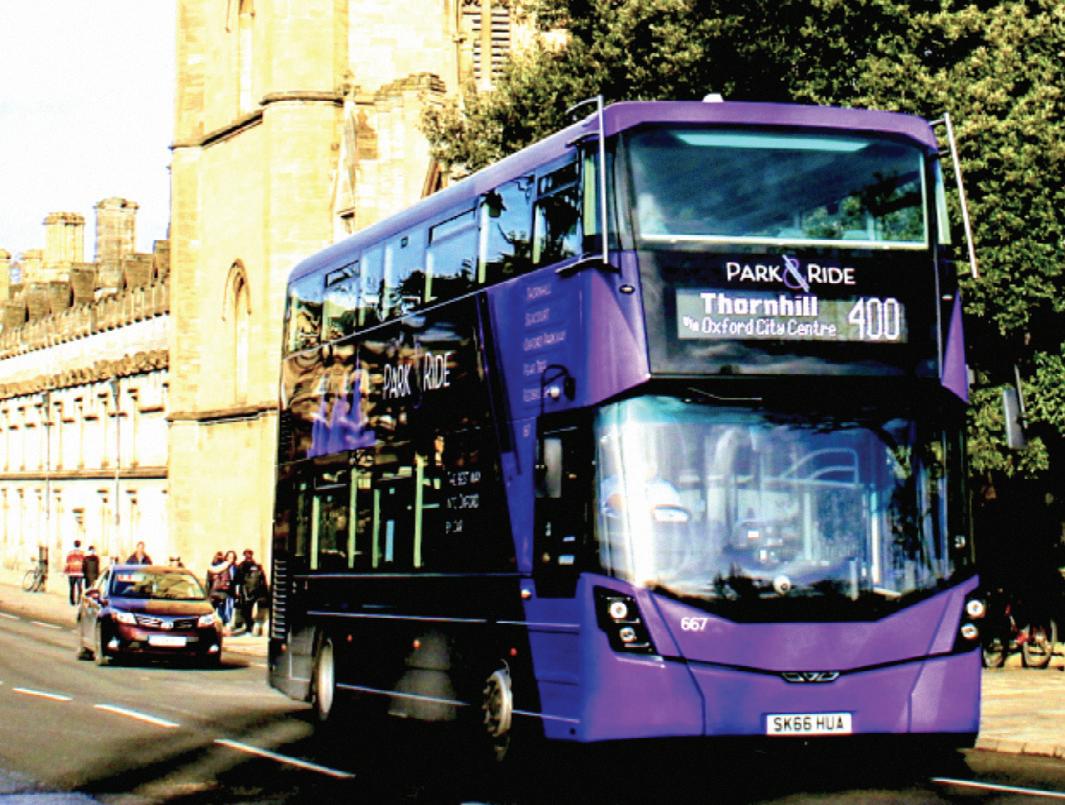
The pilot project aims make services more attractive for customers and encourage the switch from car travel, helping reduce congestion. Oxford City Council, Oxfordshire County Council, Oxford Bus Company and Stagecoach have developed a set of proposals to make the park & ride services more attractive.
The city and county cabinets will be asked to approve the creation of a new combined parking and bus ticket for all park & ride sites in and around Oxford.
These are:
• Oxford Parkway P&R
• Pear Tree P&R
• Redbridge P&R
• Seacourt P&R
• Thornhill P&R.
It is expected the combined ticket trial will run from 30 September 2022 to 31 March 2023.
If approved, car drivers will be able to purchase a combined ticket which covers both parking and return bus travel at a rate of £4.00 for a car with only one driver, and £5.00 for a car with
two or more people.
Currently, other than a combined £6.80 family ticket, drivers pay separately for both parking and bus travel. The new combined ticket also provides a lower cost alternative to the existing £6.80 family ticket. Drivers will be able to buy the combined ticket at the parking machine, or via the RingGo parking app.
The new arrangements will be supported by a marketing and communications campaign, to help promote the ticket offer.
An initial review of the trial will be conducted after the first three months which will inform a cabinet decision on the next steps and a joint city-county fea-
Parking spaces and loading bays are to be removed from a key Oxford city centre street.
Oxfordshire County Council approved an Experimental Traffic Regulation Order (ETRO) for Broad Street.
Existing pay & display parking will be removed, while disabled bays and a motorcycle bay will be relocated. There will also be a complete loading ban along most of the street.
The changes are aimed at discouraging vehicle movements along the street. The county council said the changes would increase footfall and improve air quality.
The report to the council stated: “The project aims to discourage general vehicle movements and builds on the Broad Meadow scheme implemented by Oxford City Council in 2021 by increasing the extent of the scheme to the full length of Broad Street (Catte Street – Magdalen Street
East). The key output of this project is to improve the public realm on Broad Street.
“This will be achieved by removing existing pay & display parking and relocating an existing motorcycle bay, and repositioning existing disabled bays and loading bays.
“The scheme aims to: encourage people to use the space as a place to stay/meet throughout the year, rather than just a place to travel through; offer increased space for events to take place; support local businesses through encouraging increased footfall and time spent in Broad Street; and improve air quality through reducing vehicle movements.”
Preliminary designs for Broad Street include movable planters and seating, lawn space with games and activities, outdoor dining for existing businesses, additional cycle parking and space for small-scale events
sibility study on medium and long-term options for park & ride and transport hubs.
In addition to the combined ticket system, the partnership is also proposing to permanently amend the parking periods at all park & ride sites across the county, so that customers needing to park for longer, such as those working longer shifts, pay less. If approved, this will mean:
• the current £2 tariff which covers the 1-11 hour parking period is to be extended to cover 1-16 hours
• the current £4 tariff which covers the 11-24 hour period will be updated to cover 16-24 hours.
and art displays.
A six-month public consultation period about the scheme will begin when the changes are put in place, before a decision is made on making it permanent.
The changes are being implemented under an experimental traffic regulation order (ETRO) which can last for up to 18 months.
The council’s report detailed the timeline. It read: “With respect to ongoing engagement, stakeholders will continue to be informed of the scheme development up to the point of construction.
“Following scheme implementation, stakeholders and members of the public will then have a minimum sixmonth statutory consultation period to formally comment or object to the experiment. Within this six-month statutory consultation period, the scheme can be modified to take account of any issues or alterations required.”
The proposal follows discussions with major employers, including city centre retailers, which identified that the current 11-hour time charge creates a ‘cliff-edge’ for shift workers. The change aims to better support these drivers. Aside from these changes, all other car parking charges at these sites are proposed to remain the same.
Both car parking and bus patronage has been dramatically reduced at all park & ride sites in comparison to pre-pandemic levels, and whilst bus patronage levels are now actually better than pre-pandemic over the weekends, they have still not recovered on weekdays, especially during peak hours.
Bus passenger levels are currently running at between 75% and 80% of pre-COVID levels on average. The councils say that without improvements and action, including continued government financial support, services may have to be reviewed later this year.
The proposed changes are part of a multi-partner campaign to encourage bus use across the city and county.
Last month, a campaign launched with the partnership highlighting the financial advantages of taking a bus over a private vehicle.
Three low traffic neighbourhoods (LTNs) in the Cowley area of Oxford are to stay in place.
The decision was made by the Oxfordshire County Council’s cabinet at a meeting on 19 July following an 18-month long trial.
The cabinet also committed to undertake additional community and stakeholder engagement to further refine the scheme, with any changes to be implemented by spring 2023.
The council will continue to monitor all aspects of the measures and bring forward proposals for changes through the consultation process, including the potential to replace some hard closures with automatic number plate recognition (ANPR) cameras.
LTNs prevent motorised traffic from travelling through a residential area by use of planters, bollards or other measures.
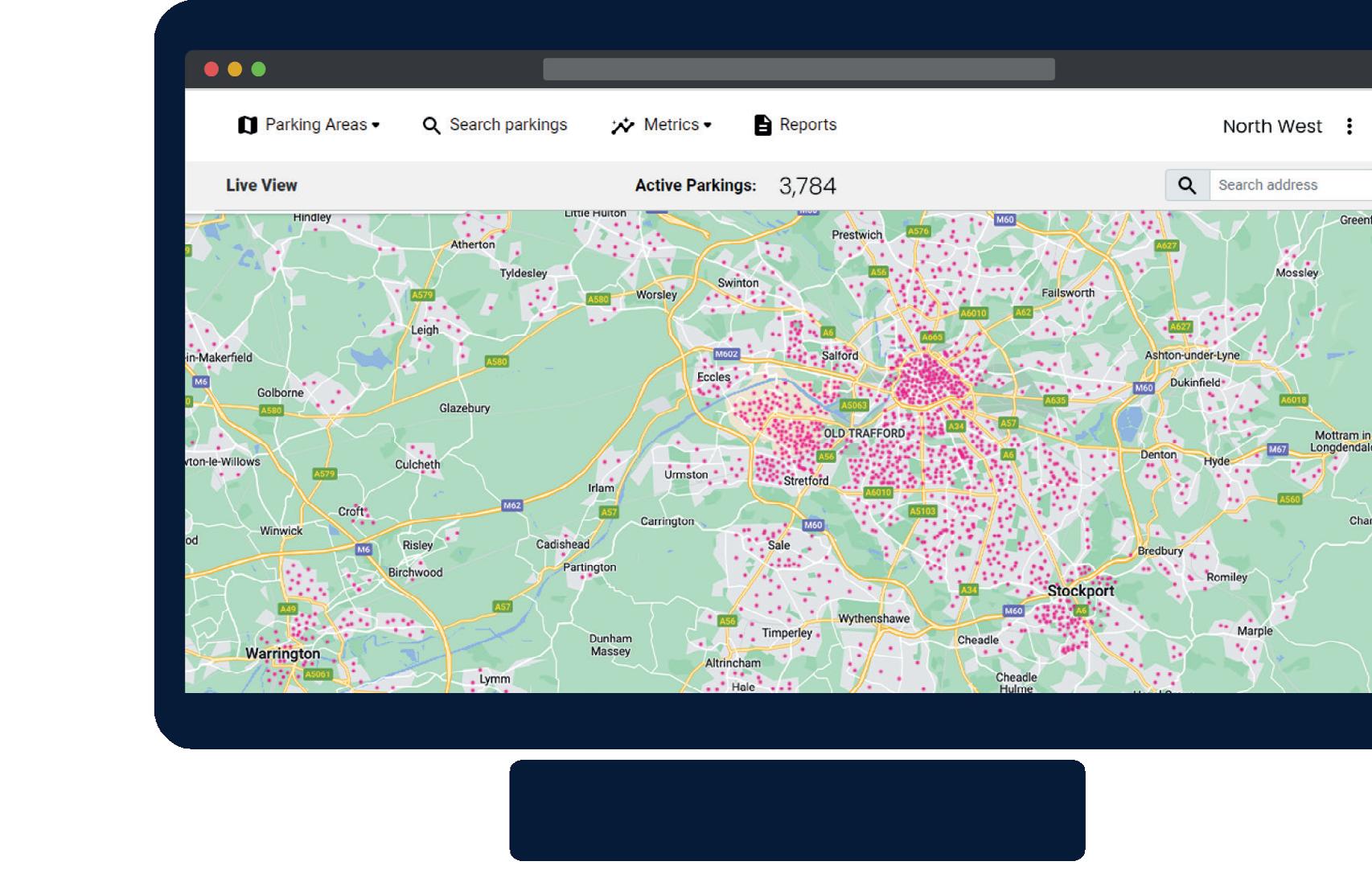
A reciprocal agreement for using a Blue Badge which existed between the UK and the rest of Europe pre-Brexit is in jeopardy. The charity Disabled Motoring UK (DMUK) is concerned that Blue Badges held by UK citizens are no longer being recognised in a number of European Union countries.
Despite Brexit, most EU members still recognise UK Blue Badges, including Germany, Ireland and Malta. However, countries such as France, Spain and Greece, Bulgaria, Lithuania, Luxembourg, Romania and Slovenia are “undecided”.
Heidi Turner, DMUK campaigns and communications director, said: “Disappointed is not a strong enough word. We are appalled by all European governments involved. This should be a no-brainer reciprocal agreement that will benefit EU citizens when visiting the UK.
“Before Brexit UK Blue Badge holders could use their Blue Badge in the rest of the EU so long as they obeyed local disabled parking rules. This was a lifeline to many disabled people and meant that they could travel in the EU without fear that they could park close to facilities and services when in the EU.
“Many disabled people like to travel using their own vehicle as it is a reliable form of transport which suits their access needs. We see a lot of disabled
Uncertainty exists for Blue Badge holders travelling in the EU
people use their own vehicle to travel on the continent and prior to Brexit they were often full of praise of how our European neighbours enforced disabled parking and usually said they found fewer bays abused by nonbadge holders compared with the UK.”
The UK government website lists all EU member states and whether a UK Blue Badge is recognised in that specific country. For the countries that state “undecided” it tells drivers to contact that country’s embassy.

Turner said DMUK has done this for France. “We contacted both the French embassy in the UK and the UK embassy in France. Each embassy just referred us back to the other without a proper answer on using a UK Blue Badge in France. We still don’t know what ‘undecided’ means – can you use a UK Blue Badge until they make a decision, or can you not use a UK Blue Badge until they make a decision?”
DMUK is now urging the UK government to talk to its coun-
An NHS trust in Newcastle has defended increasing parking charges for patients and visitors. All-day parking at one of the Newcastle Hospitals NHS Foundation Trust sites previously cost £7.20 on a weekday and £3.60 at weekends. A stay longer than five hours now incurs an £18 charge.
The new tariffs came into force at the Royal Victoria Infirmary (RVI) and Freeman Hospital on 1 July.
Trust managers have told Newcastle City Council’s health scrutiny committee the increase had deterred commuters from
taking spaces, which had been a particular problem at the RVI.
The RVI’s car park had been cheaper than other sites in the city centre and filled up soon after 9am.
Caroline Docking, the trust’s assistant chief executive, said the change had succeeded in making the RVI “unattractive” to park in all day. The new fees had seen an increase in spaces available for patients.
Docking said the trust was working to raise awareness of discounts available for some patients. For example, a longstay patient tariff caps the cost of parking at £8 after three
hours. Cheaper prices are also available for people who attend monthly appointments or who have been unexpectedly admitted for treatment. David Malone, the hospital’s transport and travel advisor, said patients are refunded if eligible drivers found out about the concessions after they had paid their fee.
Free parking is available for disabled people, those attending frequent outpatient appointments, unplanned maternity deliveries and parents of sick children staying overnight.
terparts in Europe to get agreement on acceptance of UK Blue Badges. Turner said: “This is another example of disabled people falling far down the priority list. When we have investigated this nobody can give us a definitive answer on Blue Badge acceptance. This leaves disabled holiday makers in a precarious situation on whether they risk using their Blue Badge in countries that can’t make up their mind to accept UK Blue Badges.”
Motoring group AA is worried that disabled drivers may leave themselves open to parking fines if they use their permits in undecided countries, saying it was “simply unacceptable” that the issue had not been resolved.
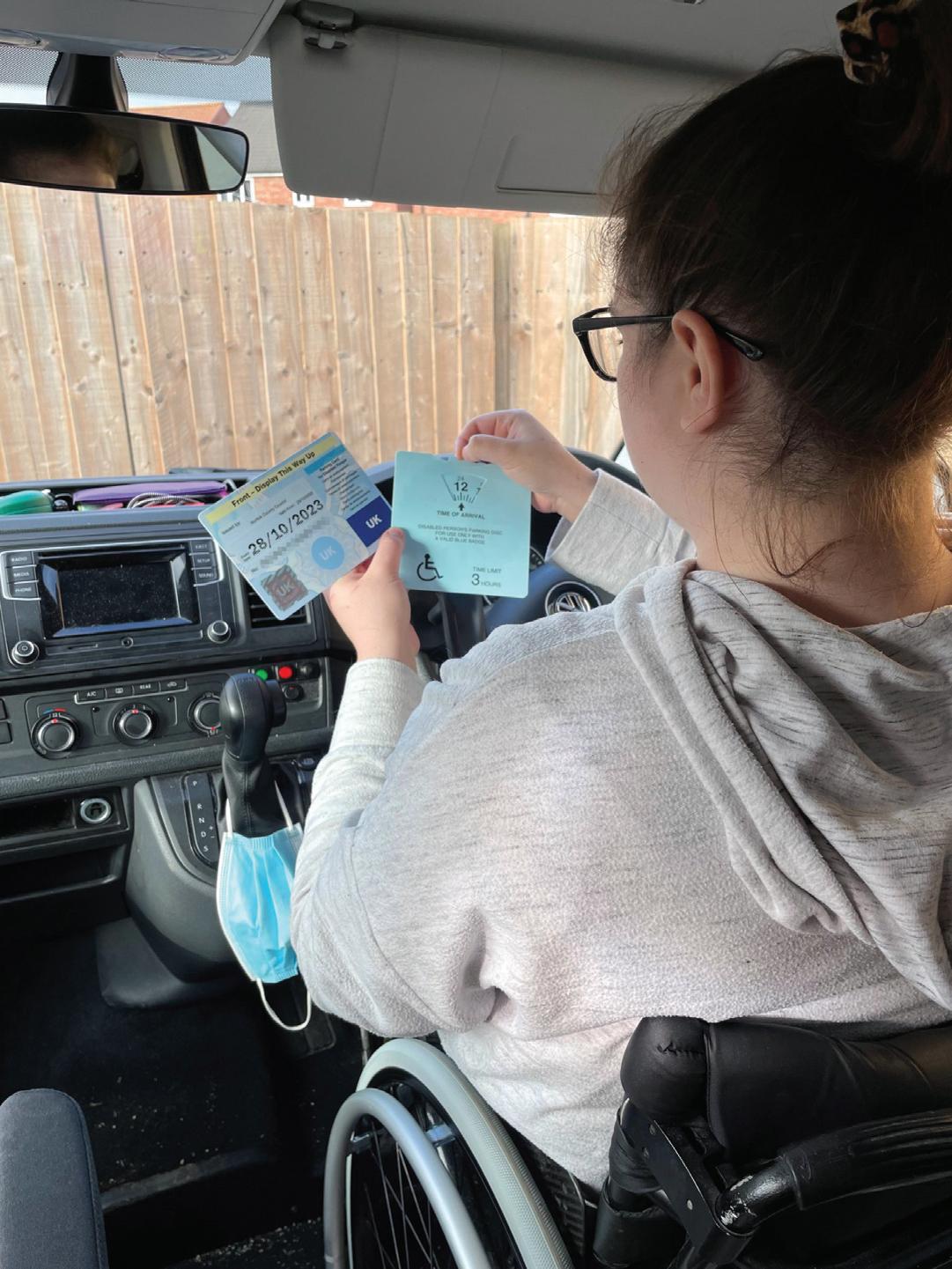
Jack Cousens, head of roads policy for the AA, said: “Blue badges are issued because of specific health reasons, and to not have their status confirmed two years down the line after the UK left the EU is simply outrageous.”
Cousens advised badge-holders to use drop-off and collection zones where possible, adding: “While problematic, it reduces the risk of a vehicle being given a ticket or towed away.”
The AA said it had found that European embassies were unable to provide them with any assurances or advice.
A Department for Transport spokesperson said: “Negotiations on Blue Badge recognition are ongoing between the UK and individual EU states, and motorists should check our guidance to find out where the blue badge is recognised in the EU.”
Anthony Chan has been appointed as interim chief environment and traffic adjudicator at London Tribunals.
He joined London Tribunals as an adjudicator in 2010. Like all adjudicators, he is a qualified lawyer.
Chan steps into the role which had been filled by Caroline Hamilton, who has recently joined the Traffic Penalty Tribunal for England and Wales.
Hamilton succeeds Caroline Sheppard OBE, who retired from the role after 23 years in post.

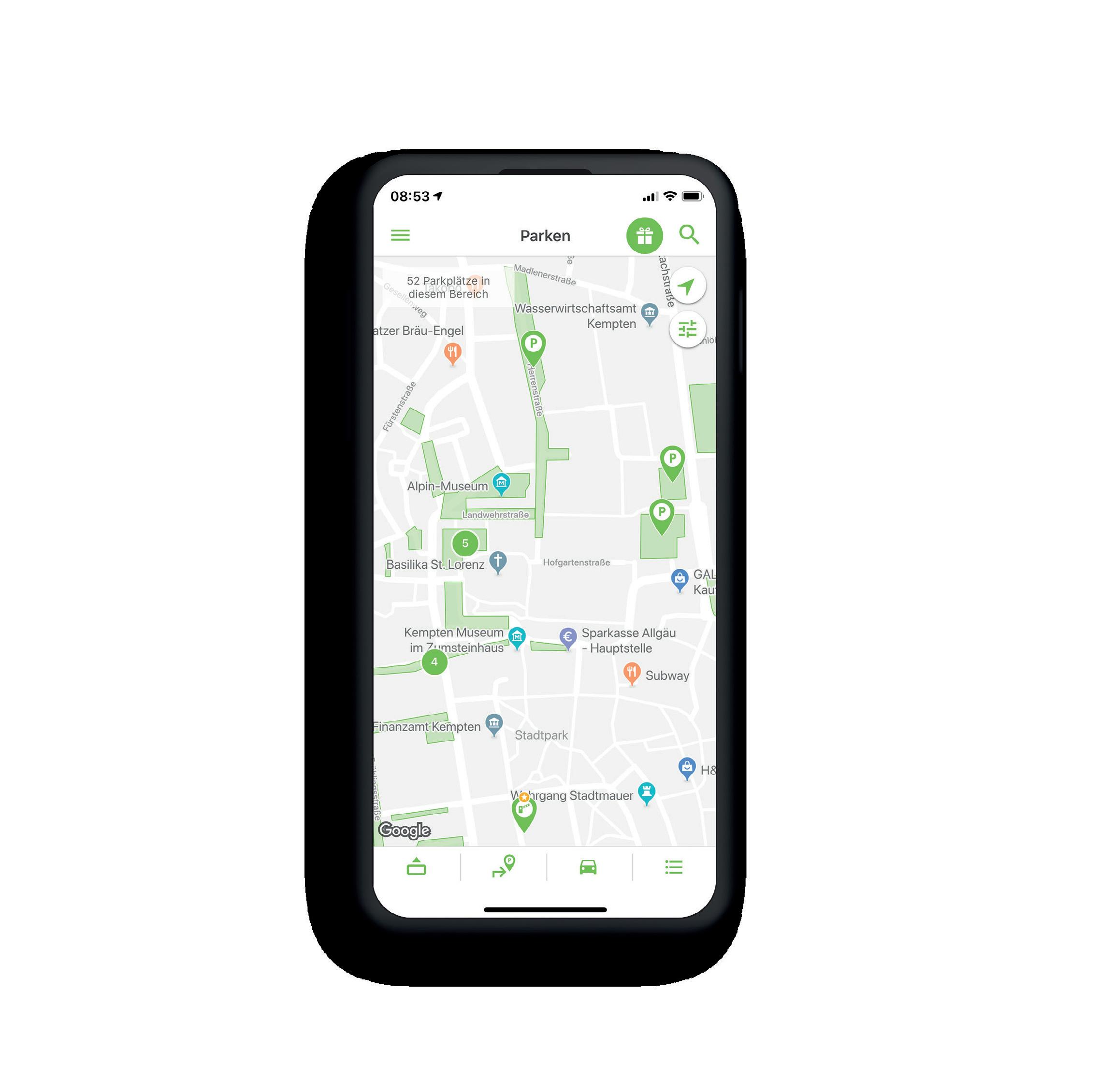
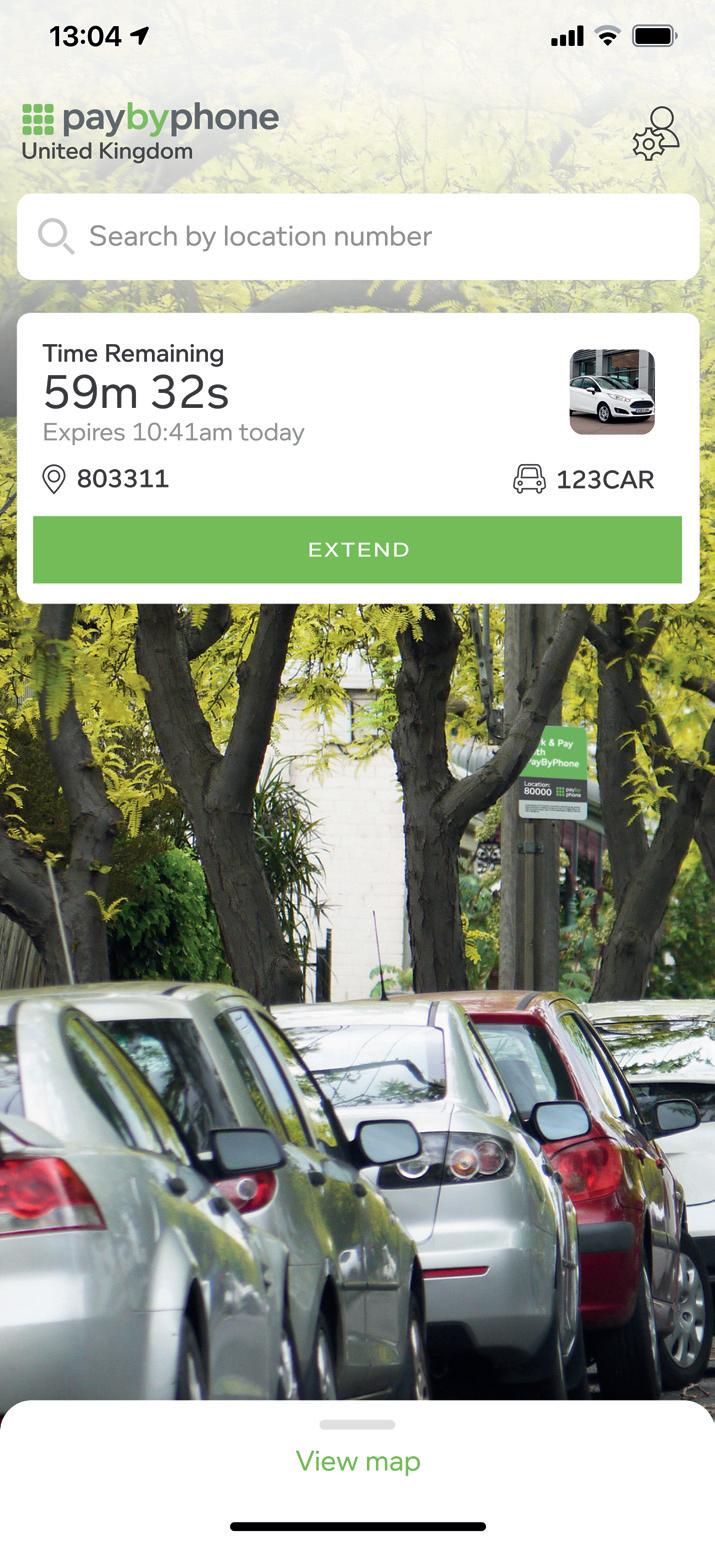
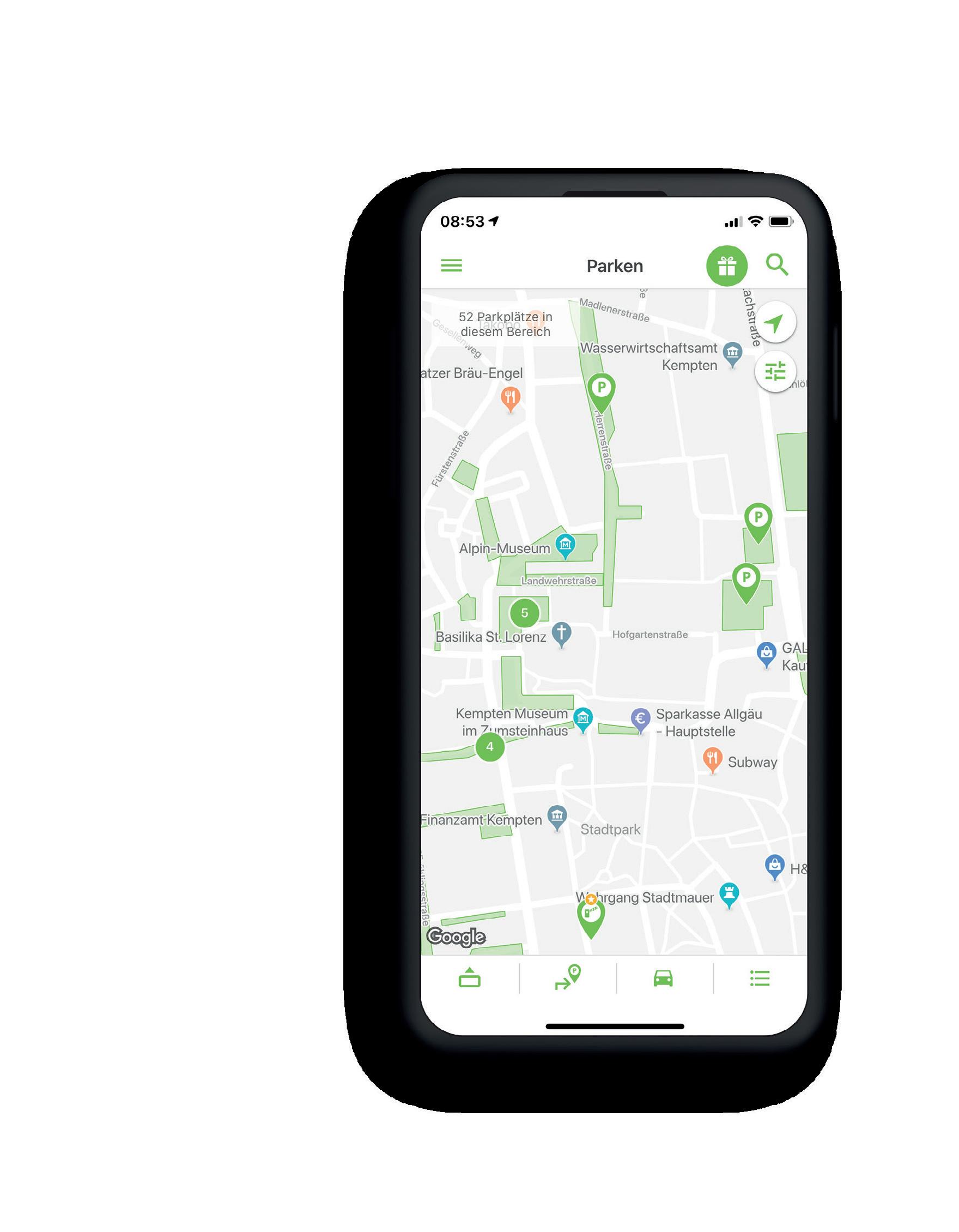
challenges use of ANPR in London’s Ultra Low Emission Zone
A surveillance watchdog has challenged the legality of using automatic number plate recognition cameras to monitor vehicle movements to enforce the expanded London-wide UltraLow Emission Zone (ULEZ).
Biometrics and surveillance camera commissioner Professor Fraser Sampson’s reservations came to light in his answers to a Transport for London (TfL) consultation. The TfL question was: “How concerned are you about use of your data and the installation of more automatic number plate recognition (ANPR) cameras to collect information on vehicle movements to enforce an expanded London-wide ULEZ?”
In his response, Professor Sampson said: “The government’s policy of reducing low emissions and encouraging road users to switch to cleaner vehicles is supported. However, members of the ANPR Independent Advisory Group (IAG) which I chair have expressed concerns that an extension of ANPR functions is not justified and there is limited evidence that it would benefit society. Therefore, its legality is questionable.
“Extending the use of the role of ANPR is beyond its initial purpose and causes further concern over its legitimacy. There are ongoing issues around the lack of statutory footing for ANPR. There are also concerns around proportionality and who gets access to the data.”
The commissioner said that if local authorities are intending to use ANPR to support Clean
Air Zones, they must have regard to the Surveillance Camera Code as a matter of law.
Professor Sampson pointed out that the revised Surveillance Camera Code states: “A surveillance camera system should only be used in a public place for the specific purpose or purposes it was established to address. It should not be used for other purposes that would not have justified its establishment in the first place.”
The commissioner said: “It’s not only the technology that has changed since ANPR came into effect; people’s attitudes and awareness have changed towards surveillance too. When looking at increasing the functionality of ANPR in the future we must ask whether this new purpose would have justified its establishment at the outset.”
Sampson added that the Surveillance Camera Code states: “Any proposed extension to the purposes for which a system was established and images and information are collected should be subject to consultation before any decision is taken. When using surveillance systems, you
can only use the data for a new purpose if either this is compatible with your original purpose, you get consent from individuals, or you have a clear obligation or function set out in law”.
The commissioner said that local authorities should complete a Self-Assessment Tool to assess compliance with the Surveillance Camera Code and to help identify any non-compliance issues. “This should be reviewed at least annually,” he said.
The commissioner said that the risk of permanent and irreversible incursion by the state during times of emergency has been well documented. He said: “One of our many challenges now will be to ensure that the balance between responsible intrusion, accountable regulation and societal expectation is resumed. I think this will be particularly important in retaining public support for the use of ANPR.”
The commissioner said that aside from the emergency provisions, integrated surveillance solutions themselves raise a number of challenges. He asked: “Will people still be as accepting of
The European Parking Association (EPA) is to work in partnership with the MaaS Alliance, an international mobility-as-aservice grouping. A memorandum of understanding (MoU) has been drawn up to help both organisations share expertise and to work toward more scalable and sustainable mobility services, as well as developments on the field’s use of data.
The EPA and MaaS Alliance hope to collaborate on technical projects to support MaaS development, while also looking at
the opportunities for the service to be deployed in a range of environments.
One of the wider goals of the work is to create a standard framework for the global adoption of MaaS technology.
It is hoped that the strategic partnership will support knowledge-sharing and collaboration to create momentum and scalability for sustainable mobility services and MaaS, as well as the wide use of data in the mobility ecosystem.
The EPA and MaaS issued a statement
ANPR once it can recognise the occupants of a moving vehicle, identifying their children, when and where they got their flu jabs, their passport and if they’ve paid their tax bill?”
The use of cameras raises a number of ethical questions, he said. “If your argument for using ANPR technology is based on environmentally responsible behaviour, we need to ensure the same level of ethical approach is adopted throughout the ANPR value chain including the companies we partner up with.”

The commissioner noted that proportionality is a key legal concept and it is a relative concept: the greater the anticipated harm the more room for intrusive tactics. “How far do the risks of climate change and the COP26 response mean the State can use whatever methods it likes in the name of combatting climate change because nothing is comparable to the enormity of the overall threat? This needs further democratic debate.”
Professor Sampson concluded: “ANPR is a well-established form of community surveillance. The fact that it’s established is important – because people have grown up with it and to an extent have so far, generally, trusted its use –or at least haven’t been as worried about its misuse as some newer surveillance capability. In that respect ANPR is a bit like old school closed circuit TV and given its criticality to policing and wider enforcement by a range of government agencies, we extend its overreach at our peril.”
Mayor of London Sadiq Khan wants to expand the ULEZ to cover the whole of Greater London. Meanwhile, a number of other UK cities are introducing clean air zones that also use ANPR camera enforcement.
that said: “With overlapping interests within the field of smart and sustainable transition of cities, societies and industries, particularly in the field of mobility, the collaboration will focus on sharing knowledge on the development of MaaS for sustainable mobility solutions in cities.
“Cooperation in the technical work will aim to support the development of MaaS while exploring new opportunities and preconditions for MaaS in different environments, as well as supporting the development of common framework for sustainable MaaS services that could be adopted widely around the world.”
A taskforce has been assembled by consultancy TRL to seek ways to optimise the management of kerbside space across the UK and make roads safer. The taskforce aims to articulate the problems faced by road users, by network managers and by the councils who could use pavements to generate new revenue.

The project partners will be drawn from the Smart Mobility Living Lab (SMLL) Innovation Community.
TRL said that space on both sides of a kerb is a public good available for the enjoyment of all. However, the ever growing number of kerbside delivery services are increasing congestion on busy streets without making any payment for the space they use. Meanwhile, local authorities are experiencing a decrease in revenue from parking permits.
In addition, TRL said government policies on active travel
and electrification of transport are unintentionally putting different user groups in direct competition for the same precious road space, with cyclists expecting clear lanes which may now be blocked by EVs hooked up to chargepoints or littered with e-scooters.
Paul Campion, chief executive of TRL, said: “The kerbside was left behind when urban environments were evolving and maturing as living spaces for people. It was assumed it was a space reserved for parking and maybe for walking without get-

ting too close to the vehicles. But now, with the focus on decarbonisation and making cities more liveable, it presents a unique opportunity for change.
“With this project, we want to bring more voices into the conversation around the issues to help policy makers find a way forward. The longer we delay, the more problems we store up, and the more opportunities we miss. Individually, the taskforce members are actively engaging with a wide range of interested parties to achieve real change.
“TRL hopes to accelerate that

pace of change by highlighting the urgency and bringing together ideas for solutions. It’s not just about the council’s coffers. Currently, most of the collisions involving pedestrians and cyclists occur at the kerb and represent around 40% of the UK KSI numbers. The decisions we make about how we construct and manage our environment can have very serious consequences for each of us.”
Mark Corbin, chair of the ADEPT National Traffic Managers Forum, said: “One of the key barriers we are facing is the salience of the issue. Kerbside management is not at the top of anyone’s agenda. The taskforce has identified a need for a decision to be made at the national level that local authorities can then implement. This will allow us to create updated and relevant regulation that keeps our kerbside safe and worthwhile to use. Once we have effective kerbside management practices, the pent up innovation within industry can be unleashed for the good of society.”
A disabled woman’s dispute with a parking operator over access to a space in her apartment building in Cardiff has inspired a mural by renowned graffiti artist Rebel Bear.
The Scottish artist travelled to Wales to create the mural on some hoardings. In an Instagram post, Rebel Bear said the artwork was inspired by wheelchair user Cerys Gemma, who has been penalised for parking in a spot for disabled visitors on the development where she lives.

The artist wrote: “The bear came across the story of Cerys Gemma, a disabled women who lives in Cardiff, who for over a year has been receiving fines for parking in the ‘wrong’ disabled bay outside of her flat. Just another example of overly bureaucratic money grabbing that seems to run through most institutions of authority.”
However, while the mural depicts a parking attendant, the dispute actually involves parking on private land. In fact, the local authority, City of Cardiff council, has removed the mural with the artist’s full consent. A council spokesperson said: “We wanted to ensure that it wasn’t damaged,
Bear’s Instagram postvandalised or stolen, and we will now look at ways in which we can exhibit it to the public in a suitable setting.”
The subject of the mural Cerys Gemma is seeking to overturn around £1,000 of parking charge notices issued by a private company for using disabled spaces outside her flat in Cardiff Bay.
Gemma has been using a wheelchair since sustaining serious spinal injuries following a car accident when she was 17. She said she cannot use the space allocated to her flat in Prospect Place because there is a pillar on one side and another parking space on the other side.
Gemma said she had been in contact with both the property management and parking companies, trying to explain why
she needed to use a wheelchair accessible space.
Gemma welcomed the artist’s mural as a sign of solidarity. “I think the art is awesome and really grasps what is happening,” she said. “It is expected that I use a standard size parking bay, which effectively means once I park in it I am trapped in my car. Unfortunately the battle is still ongoing and nothing has been resolved.”
Gemma has been issued parking notices by New Generation Parking Management (NGP), which said the eight spaces had to be kept free for disabled visitors, not residents. NGP manages the bays on behalf of Prospect Place Management.
Property management company Ringley Group manages

Around 8.6m PCNs were issued in 2021-22,
A record number of vehicle keeper records have been bought by private companies, claims the RAC Foundation.
Vehicle keeper information is used to pursue drivers for parking charge notices of up to £100 for infringements of the rules in privately run car parks.
Government data shows that the DVLA provided firms with 8,564,762 vehicle keeper records in 2021-22.
The RAC Foundation said this is more than the previous record of 8,411,897 million seen in 2019-20 which was prepandemic, and an increase of more than 50% compared with four years earlier.
Some 177 parking management businesses requested car owner records in the year to the end of March, up from 151 during the previous 12 months.
ParkingEye was the biggest buyer in 2021-22 with 1.8 million records.
The DVLA charges private companies £2.50 per record but says it does not make any money from the process.
In June, the government withdrew a long-awaited code of practice aimed at eradicating some of the sector’s worst actions following a legal challenge by parking companies.
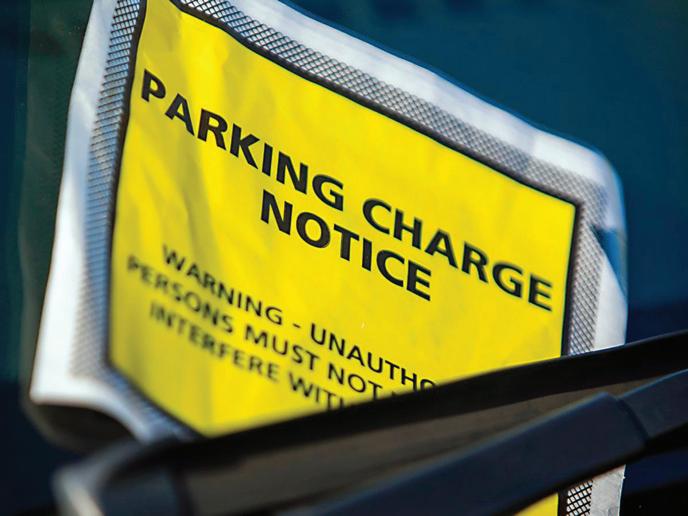
Steve Gooding, director of the RAC Foundation, said: “It seems telling that at the same time as the parking industry has been pressing government to water down its long-awaited reforms more companies appear to entering the market and together they have continued to obtain records from the DVLA in ever greater numbers so they can demand more penalty payments from motorists.
the building and homes at Prospect Place but not the parking. Ringley Group said it understood her allocated space was being used by a friend while she was attempting to park another car in a space for visitors.
In statement it said: “The lady in question has one car parking space that comes with a relative’s apartment, but we understand from NGP that use of the parking space that comes with the apartment is currently being used by a friend, This means that she has been attempting on a continuous basis to park an additional car on-site in a visitor space, despite already having been allocated one resident’s car parking space. Residents’ car parking spaces form part of the leasehold agreement and are not allocated by Ringley.”
Ringley Group said it has met with council officials to solve the issue.
The statement said: “One solution is for her to return her space back to the freeholder and then to sit down with the site team and identify spaces that might be suitable for her and for us to arrange a space swap with another owner. There is a short supply of visitor spaces, which are for use for all, which is why we cannot provide her permanent use of a disabled visitor parking space.”
“A cynic might suspect the industry continues to expand confident it can water down the final changes so much that there is little impact on its activities. We would hope that these eyewatering numbers will stiffen ministers’ resolve to stick to their guns and get their much needed code of practice and caps on charges in place pronto.”
The parking code of practice, which was due to come into force before 2024, stated that the cap on tickets for some parking offences should be halved to £50.
A number of parking companies have sought judicial reviews of the level of the cap on PCNs and also a ban on applying fees to visits made by debt recovery agents. The challenge led to the code being temporarily withdrawn by the government pending a review of charges.
A Department for Levelling Up, Housing and Communities spokesman said: “We’re determined to end rip-off parking practices, and it’s very disappointing that some in the parking industry are resisting this. We will continue to work with industry and consumer groups to introduce our new Parking Code of Practice as quickly as possible.”
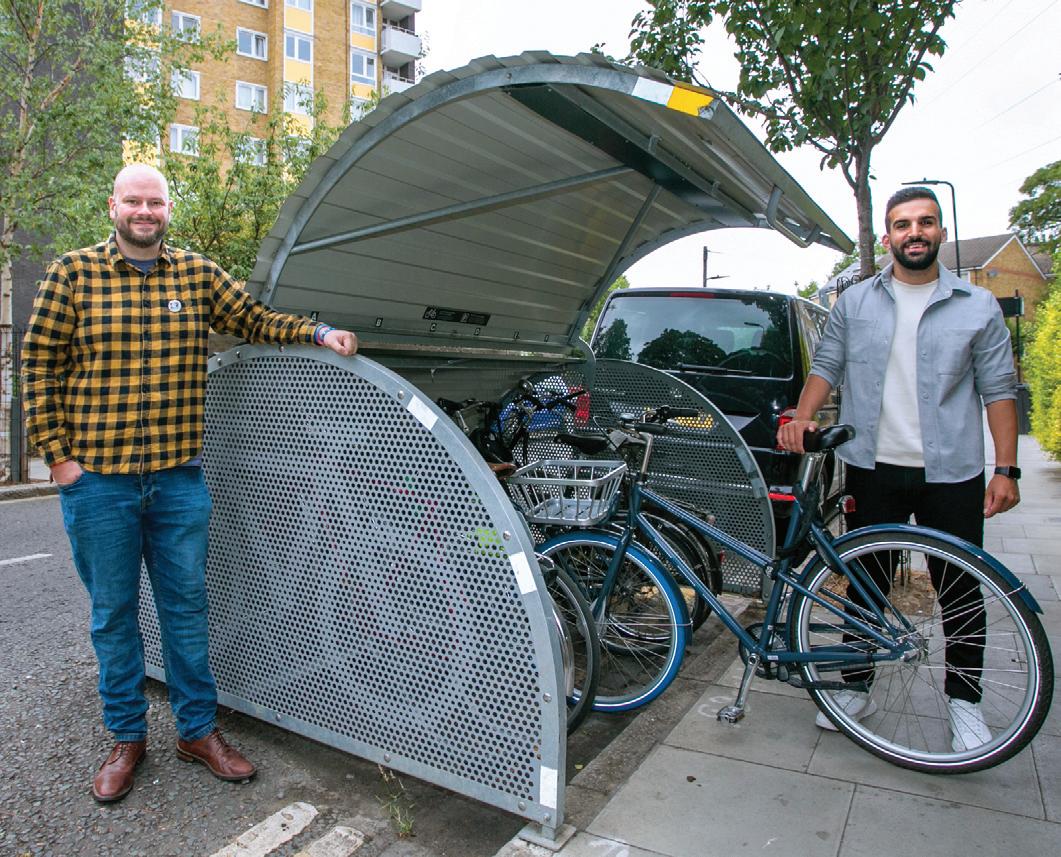
East London council to double secure street parking for cycles
Hackney Council is to double the number of secure cycle lockers on its streets over next four years. Some 675 new bike hangars will be installed in the east London borough by 2026.
The hangars help those without space in their homes to store bikes safely on the street.
Council hopes the new cycle hangars will significantly reduce the number of people waiting for a cycle parking space, which currently stands at 5,000.
The installations will double the number of hangars and increase the number of bike spaces by more than 4,000.
As part of the implementation of the new programme, a new council team will manage applications for a cycle hangar space and the rollout of the hundreds of new hangars.
The £2.8m cost of the new cycle hangars will be paid back over 20 years through an annual
fee to users. A space in one currently costs £43.50 a year on street, and £31 a year on estates, plus a £26 key deposit. The council said it would be unable to implement such an ambitious programme without a fee,
Cllr Mete Coban, cabinet member for energy, waste, transport and public realm, said: “We know that access to secure cycle parking can be a barrier to
cycling. We already have more cycle hangars than any other borough, but as London’s capital of cycling, we want to do as much as we can to encourage more people to cycle – helping them to travel more healthily, tackle emissions and rebuild a greener Hackney.”
Installation of the new hangars will begin in 2023, finishing in 2026.
Leeds City Council is allowing motorcycles and scooters to use the A65 bus lanes between Kirkstall and the city centre.
The 12-month trial aims to support motorcycling as an alternative to car travel on the corridor and also improve safety for motorcyclists.
An evaluation of the trial will consider motorcyclists’ safety and the impact on other road users, particularly vulnerable road users and bus passengers.
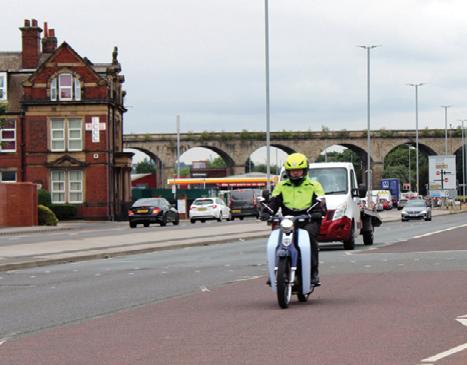
The trial is applicable to both inbound and outbound lanes from the city centre by the TGI Friday’s junction, along Kirkstall on the A65, up to the junction with Butlers Wharf (Kirkstall Forge entrance). These bus lanes are operational on a 24/7 basis.
A multi-storey car park in Kent could be demolished to make way for housing. Spelthorne Borough Council closed the car park on Church Street in June due to vandalism.
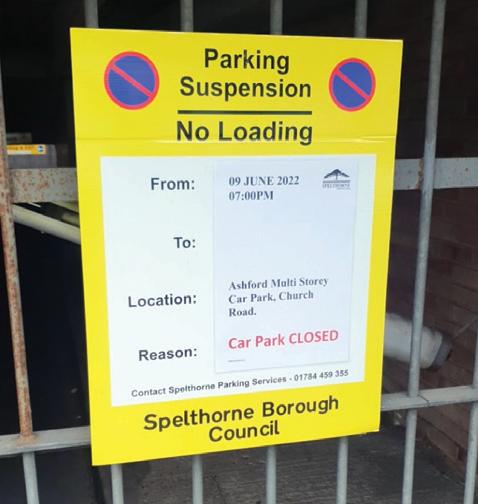
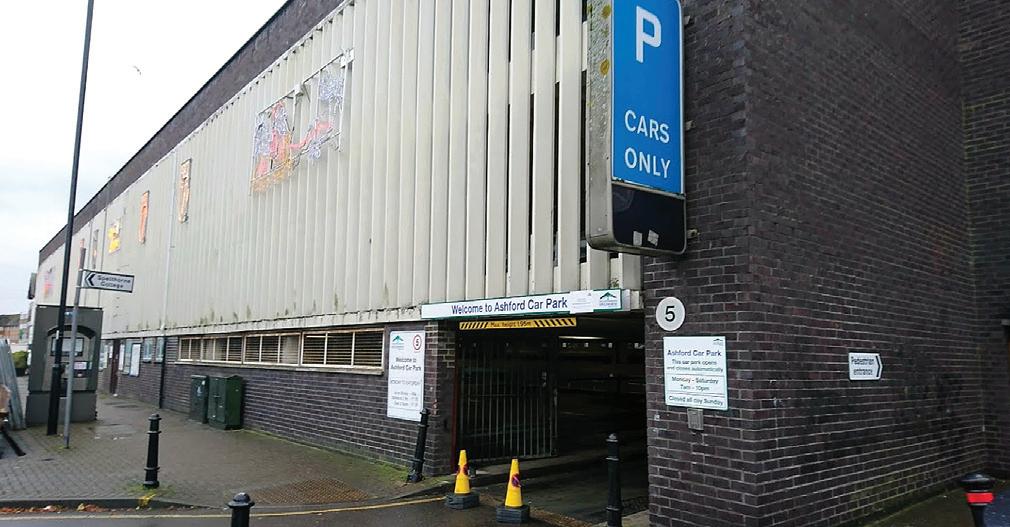
Spelthorne has run a public consultation on the redevelopment of the Ashford Multi-Storey Car Park.
The proposed development would see the building of 42 affordable one bedroom and two-bedroom homes above ground floor commercial and community space with parking for residents and visitors.
The car park had been the subject of systematic vandalism which has resulted in significant damage to the fire doors, stairs, shutters, barriers and lighting. A council spokesperson said: “This has been a very difficult decision. Closing the car park is the

very last thing we wanted to do but this shocking level of vandalism has caused so much damage that we cannot risk the safety of users.
“We are very sorry for the inconvenience that will cause for some people, but hope everyone will understand that we really had no choice in the matter.”


Charmingly straight-talking and quick-witted, Kerry Godliman is one of the country’s best performers. She is best known for her TV appearances on Mock The Week, Live At The Apollo, Michael McIntyre’s Big Show, Taskmaster, Hypothetical, Ultimate Worrier, The Jonathan Ross Show and 8 Out Of 10 Cats

Kerry is a regular on BBC Radio 4, where she has appeared on The News Quiz, The Now Show and Just A Minute, as well as her own series Kerry’s List. She also starred in the hit series The Wilsons Save The World





alongside Marcus Brigstocke, our 2021 awards host. Besides being a comedian, Kerry is also an accomplished actress. Her roles include Derek, Bad Move, Save Me, Call The Midwife and Mascots. Most recently she has been starring alongside Ricky Gervais in the hit Netflix series After Life. She also heads the cast in the new detective series Whitstable Pearl.
As host of the British Parking Awards, Kerry joins an illustrious roll call of past hosts that includes Marcus Brigstocke, Dr Xand van Tulleken, Shaparak Khorsandi, Richard Hammond, Hugh Dennis, Meera Syal, Sanjeev Bhaskar, Alexander Armstrong, Lucy Porter, the Reverend Richard Coles, Hal Cruttenden, Debra Stephenson, Adrian Chiles, John Sergeant and Ade Adepitan.
Over
past 20
This year over 120 submissions are competing for recognition across a range of categories that span the design and maintenance of car parks, innovative systems, customer service, partnership working and communication campaigns. Central to the success of the awards is its focus on people, with categories that recognise the key role of people in parking, rewarding teamwork and honouring individual achievements.
The entries are being assessed by the jury, who will draw up short lists of finalists to be revealed in the week of 22 August.
Sponsored by: The International Parking Community
Beaufort Court sports pitch, Fulham, London – Cemplas
Help for Ukraine campaign – HUBER Car Park Systems
Persistent evaders and nuisance vehicles research programme – Just and TJA
JustCharge community charging network – JustPark Parking Fraud Forum and ‘The Lambeth Way’ – London Borough of Lambeth
Lewisham School Streets – Lewisham Council and Videalert Healthy School Streets – London Borough of Newham
The Hub, Stockton-on-Tees – Sustrans
Sponsored by: PayByPhone
Conduent Transportation team, Oxfordshire County Council Carol Gibson, senior parking operations officer, Lewisham Council Marina Udrea, parking enforcement officer, Parking Control Management (UK)
Team Comet, Landside Operations, Stansted Airport Hannah Olaitan, senior PCN specialist, YourParkingSpace
Sponsored by: Solutionlabs
AppyWay

B4 Parking
EF International Parking Services
Parking Control Management (UK)
PayByPhone
Q-Park
YourParkingSpace
Sponsored by: ZatPark
Baywatch – Disabled Motoring UK
Annual Parking Report – East Sussex County Council
Communications strategy – North Essex Parking Partnership (NEPP)
Introduction of Special Enforcement Areas (SEAs) – Oxfordshire County Council
Launch campaign – Parkopedia and Amazon Alexa Parking
Sponsored by: CDER Group
GIS team, AppyWay Welfare team, CDER Group
Conduent Transportation team, Oxfordshire County Council
Parking service, City of Lincoln Parking team, London Borough of Havering Parking team, London Borough of Newham London Borough of Waltham Forest Parking services, Newcastle City Council North Essex Parking Partnership (NEPP)
Parking, fleet and transport operations, Nottingham City Council Parking attendant management team, Parking Control Management (UK)
Parking team, Project Centre Parking services, Royal Borough of Kensington and Chelsea Queen’s Baton Relay 2022 team, Sandwell Metropolitan Borough Council
Team Comet, Landside Operations, Stansted Airport ZatPark client services, Unity5
Liveable Places traffic order team, WSP
Sponsored by: StructureCare
Laura Bailey, business and compliance apprentice, International Parking Community
Jake England, group operating manager, Colchester Borough Council
Mattia Falchi, system consultant, Videalert
Billy Green, junior account manager, Parking Control Management (UK)
Danya Hughes, client manager, JustPark
Kayleigh Morris, senior notice processing clerk, Sandwell Metropolitan Borough Council
Oscar Turnerberg, principal accountant, London Borough of Hammersmith and Fulham
Dominik Webster, project manager and head of quality, HUBER Car Park Systems
James West, business development executive, Unity5
Matthew Westley, client account manager, YourParkingSpace Lauren Winfield, data protection and compliance manager, TRACE Enforcement Group
www.britishparkingawards.co.uk
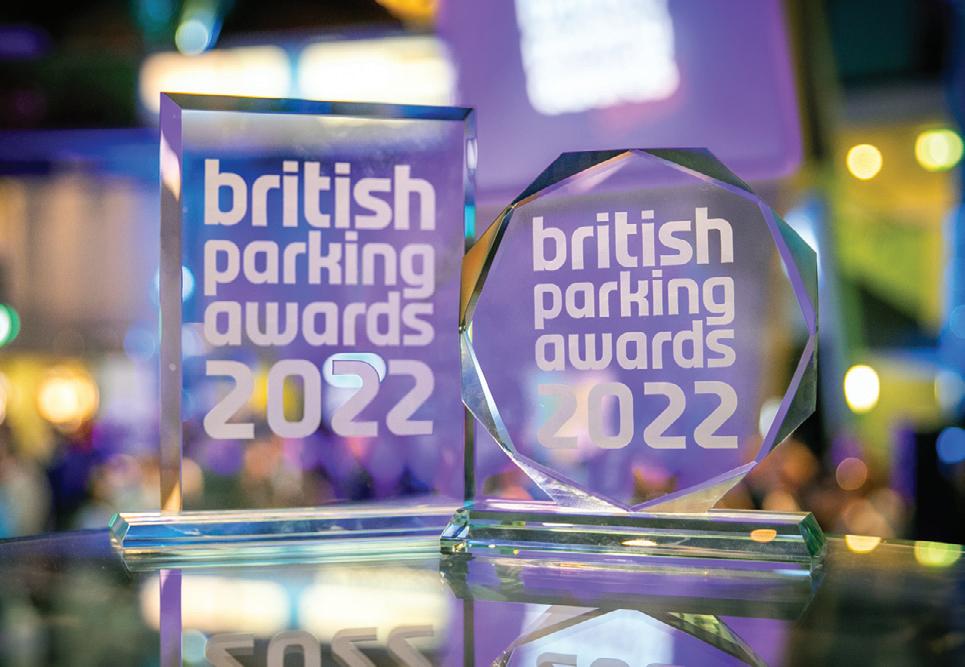
the
years the British Parking Awards has been a showcase for innovative thinking, excellent management and personal achievements
Sponsored by: APT Skidata

Transforming EV parking in Dundee – AppyWay with MILL and Clean Streets
Safe Haven Outside Schools (SHOS) – Derby City Council and Walsall
Metropolitan Borough Council Challenge to the Parking Code of Practice – JMW Solicitors
Persistent evaders and nuisance vehicles project – Just and TJA
The Parking Fraud Forum – Lambeth Council
Joint special operations – London Borough of Waltham Forest, NSL and the Metropolitan Police
Great North Run parking – Newcastle City Council and the Great North Run Company
North Essex Parking Partnership (NEPP)
Zero Emission Zone (ZEZ) – Oxfordshire County Council and Conduent Transportation
Launching landmark payment technology – RingGo and Q-Park
Residents’ parking permits during Commonwealth Games –Sandwell Metropolitan Borough Council and Chipside
Developing Parking as a Service solutions – Taranto and Capita
Effective training for front line staff – Training and Development Academy and Agena Group
A parking partnership – Watford Borough Council and NSL
Transitioning residents towards electric vehicle take-up in Westminster
– Westminster City Council, Siemens and Ubitricity
Sponsored by: Go2Sim
APCOA Parking – Parkway
AppyWay – AppyWay Platform
AppyWay – Traffic Suite: Cycle hangars in Southwark
AppyWay – Traffic Suite: TROs in Haringey
AppyWay, MILL and Clean Streets – EV parking in Dundee
APT Skidata – eCharge
APT Skidata – Mobile Pay
Barbour Logic – Challenge Writer
Cemplas – Ramp repairs, Grand Central, Birmingham
CitiPark – FreeFlow Solution, Rickmansworth
Compleo Charging Solutions UK – EV and parking payments
Conduent Transportation – Oxford Zero Emission Zone systems
HUB Parking Technology – LNER stations upgrade to cashless payment
JustPark – Parking Peace of Mind
Marston Holdings and Videalert – ANPR controls at Stansted Airport
North Essex Parking Partnership (NEPP) – Park and Charge
Parkopedia – Park and Charge
Parking Control Management (UK) – PCM Apps Suite
RingGo – RingGo AutoPay
Taranto – Taranto integration with London Council’s Electronic Data Interchange
Taranto – Taranto Platform as a Service Transfer 360 – Connecting vehicle leasing companies with ticket issuers
Twin – A payment solution for parking and EV charging
Unity5 – ZatPermit
Sponsored by: RingGo
John Galsworthy, assistant director for parking services, London Borough of Hammersmith and Fulham
Mehmet Hassan, senior contract manager, London Borough of Waltham Forest
Thomas Heatherington, commercial director, YourParkingSpace
Dan Hubert, founder and chief executive officer, AppyWay
Barry Johnson, senior technical director, Taranto
Jade Neville, head of user experience, Conduent Transportation
Annie Oliver, legal and compliance manager, Parking Control Management (UK)
Sarah Randall, assistant director, London Borough of Newham
Sponsored by: JTR Collections
Welfare Team, CDER Group
Appeals team, Gemini Parking Solutions
Single Contact Centre, Marston Holdings
The business unit, North Essex Parking Partnership (NEPP) Permit team, Parking Control Management (UK) Team Comet, Landside Operations, Stansted Airport Transfer 360 ZZPS
Sponsored by: Compleo
The Glass Works MSCP, Barnsley – Barnsley Metropolitan Borough Council, Henry Boot Construction and StructureCare
Q-Park City Hospital, Birmingham – Sandwell & West Birmingham Hospitals NHS Trust and Q-Park
Bishops Stortford MSCP – Solum Regeneration and Goldbeck Construction
Cadent Gas Headquarters, Prospero Park, Coventry – Cadent Gas, McLaren Construction and GCP Applied Technologies Stirling Lloyd Stourton Park & Ride, Leeds – Leeds City Council and BAM Nutall Northwick Park, London – London North West University Healthcare NHS Trust, APCOA Parking and HUBER Car Park Systems
Luton & Dunstable University Hospital Car Park, Luton –Luton & Dunstable University Hospital and HUBER Car Park Systems
The Garage Car Park @ The Helix, Newcastle – Newcastle City Council, The Helix Management Company and Sir Robert McAlpine
Broad Marsh Bus Station & Car Park, Nottingham – Nottingham City Council and Galliford Try Construction
Queen Alexandra Hospital MSCP, Portsmouth – Portsmouth Hospitals University NHS Trust, Ballast Nedam and Stripe Consulting
Bedford Avenue, Slough – SEGRO and Bourne Parking
Watford Riverwell Car Park, Watford – West Hertfordshire Hospitals NHS Trust and HUBER Car Park Systems
Grand Central, Birmingham – Vinci Construction, Cemplas and Sika Chapel Street, Brighton – Brighton & Hove City Council
Townfield Car Park, Chelmsford – Chelmsford City Council, Cemplas and Sika
Middleborough MSCP, Colchester – Anglo Scandinavian Estate and Makers Construction
Leapale Road Car Park, Guildford – Guildford Borough Council, Stripe Consulting and StructureCare
B4 Car Park, Birmingham
Regent’s Park Car Park, London – YourParkingSpace
Westfield London and Westfield Stratford City – EF International Parking International Printworks, Manchester – APCOA Parking
The Garage Car Park @ The Helix, Newcastle – Newcastle City Council and The Helix Management Company
Car parks assessed under the Best New Car Park and Car Park Renovation Award are eligible for the Outstanding Car Park Award.
Sponsored by:YourParkingSpace
The design, construction and refurbishment of car parks have seen the development of specialised techniques and procedures. The Car Park Design Award recognises innovative practices and craftsmanship in the construction of new car parks and in the renovation of existing ones.
Entries correct at the time of going to press
www.britishparkingawards.co.uk
The British Parking Awards will see the presentation of set of special trophies.
The MiPermit Inspiration Award recognises individuals and organisations that have made a significant contribution to improving parking. Inspiration Award recipients are exemplars of excellent practice that have inspired colleagues, clients and the wider parking community.
The Lifetime Achievement Award will be presented to a parking professional who has made an outstanding contribution to the sector over the course of their career. Parking organisations and professionals are invited to nominate an individual who has consistently made an outstanding contribution to the industry and represents a ‘model of excellence’ across their entire career.
The Special Jury Prize will be presented to an exceptional scheme, project, policy or person that the jury feels will have a positive impact on the parking sector.
Recipients will be revealed at the awards ceremony
The Parking Rosettes are trophies presented to inspiring projects that show how the sector is having a positive impact on the wider world.
Sponsored by Bristow & Sutor and Debt Recovery Plus
Parking is an essential urban service without which towns and cities would cease to function. The award will be presented to a person, organisation or project in the UK or internationally that is fundamentally rethinking and reinventing the way in which parking is planned, designed, provided, experienced and marketed.
Sponsored by Conduent Transportation

Reinventing the Street is a special award that recognises innovative approaches to managing the kerbside and wider street scene in a way that creates vibrant and healthy town and city centres.
Sponsored by DCBL
This category recognises the many ways in which parking policy, design and management practice can help improve the quality of the environment and encourage a sense of wellbeing.
A number of entries have been submitted for the rosette categories and are being discussed by the jury



Parking payment systems manufacturer Flowbird has acquired YourParkingSpace, an online parking marketplace, technology developer and operator.
YourParkingSpace was founded in 2013 as a peer-topeer sharing service allowing householders to rent out driveways and car park owners to generate additional revenue.
Over the following decade YourParkingSpace has developed its pre-book and subscription parking marketplace to encompass commercial car parks and offer access to electric vehicle charging. More recently, it has started directly managing car parks and has developed a new range of payment terminals under the YourParkingSpace Solutions banner.
A global company, Flowbird Group has mainly specialised in producing on-street parking systems, working with more than 4,350 local authorities in over 80 countries. Its parking technology includes ticketing equipment, validation terminals and associated software systems for public transport, generating revenues of more than €300m (£256m) annually.
Flowbird has been expanding its digital offering in recent years, adding electric vehicle charging systems to its range.
Bertrand Barthelemy, president of Flowbird Group, said: “With this strategic acquisition, Flowbird will benefit from YourParkingSpace’s off-street and marketplace technology. Bringing on board its technology and proven track record of delivery is very positive news for all our stakeholders: motorists, cities and parking operator partners.”

The YourParkingSpace management team will remain at the company. Harrison Woods, chief executive at YourParkingSpace, said: “This deal ushers in an incredibly exciting new era for YourParkingSpace. It will enable us to tap into Flowbird’s unrivalled network, rapidly digitalising the off-street parking market on a global scale.
“I’d like to put on record my thanks to our chairman Andrew Higginson, who has flawlessly steered the business to the point of acquisition, our supportive investors Pelican Capital who believed in our vision and backed the company in 2020 during the height of the COVID19 pandemic, our trusted advisors Solano Partners and most importantly our fantastic team who have been instrumental in the journey.”
YourParkingSpace was advised by boutique investment bank Solano Partners.
The purchase valuation is undisclosed, however in a press statement YourParkingSpace said the sum is thought to be in line with recent transaction values for comparable US-based parking technology providers. But YourParkingSpace’s chair Andrew Higginson has suggested that the price paid is iover £100m.
Higginson, who is also chair
of JD Sports, wrote on LinkedIn: “A very young Harrison Woods pitched and won backing from Dragons’ Den for his parking idea. A few years later, not having taken up their offer, Harrison, Charles Cridland, Brannan Coady and the team sold YourParkingSpace to Flowbird for £120m. They rolled a good chunk of that and remain at the helm for the next phase, and who knows how far they will take it from this time!”

Also writing in LinkedIn, YourParkingSpace’s chief operating officer Brannan Coady said: “The business has come a long way since the days when me, Charles Cridland and Harrison Woods were hot-desking in a co-working space, and it’s been one hell of a ride from the day we got our first driver booking to this point, serving millions of drivers each month.
“Our new chapter as part of the Flowbird Group will see what is already nothing short of a rocket ship grow bigger, better, faster and further afield. We will retain everything about us that makes us special – an unrivalled team spirit, a belief that parking can and should be better than the status quo, an attitude that drives us to always improve and to always look at ways to optimise, and the hunger and commitment to build long term shareholder value within our new group.”
YourParkingSpace says it represents 85,000 space providers that range from individual driveway owners through to household names such as Premier Inn, Tesco and Morrisons.
YourParkingSpace has been placed 86th in the Tech Track 100, the UK’s fastest growing technology companies, and 612th in the FT1000 annual list of Europe’s fastest-growing companies.
The Alliance of Parking Data Standards (APDS) has announced the release of Version 4.0 of its global data specification. The APDS specification aims to facilitate seamless integration, compatibility, and communication between parking entities, owners, municipalities, the automotive industry, IT developers, ITS operators, services, and map and app providers, and other stakeholders.
The new free download includes the latest documents defining the various data
elements related to parking, mobility and transportation. Industry professionals across the globe provided suggestions to develop the final Version 4.0 release.
Version 4.0 includes a set of documents defining the various data elements, allowing organizations to share parking data across platforms worldwide, and includes:
• APDS overview
• Data dictionary: Terminology and definitions for the data elements
• Use cases: Example use cases for applying the data standard
• Information model: List of data elements, references, and relationship diagram.
The APDS is a not-for-profit organisation aiming to develop, promote and manage a uniform global specification that will allow organisations to share parking data across platforms worldwide. APDS was founded in 2018 by the International Parking & Mobility Institute (IPMI), the British Parking Association (BPA), and the European Parking Association (EPA).
Airport parking specialist Airport Parking and Hotels (APH.com) is helping conservation charity World Land Trust raise funds to protect threatened habitats.
World Land Trust works with a network of conservation partners around the world to purchase wildlife-rich habitats and to prevent under-threat areas from being cleared for agriculture or development. Buy an Acre projects are protecting land in Argentina’s Somuncurá Plateau and Gran Chaco, the Dakatcha Woodland in Kenya and the Brazilian Atlantic Forest.

For every airport parking booking made through www.aph.com/worldlandtrust from 1 August, APH said it will donate up to 20% of the booking value to World Land Trust.
APH managing director Nick Caunter said: “APH has worked closely with World Land Trust for many years to help protect

threatened forest habitats. Travel brings unavoidable carbon emissions, and we are always looking for ways to balance these emissions by actively reducing our carbon footprint and to help raise funds for important programmes such as World Land Trust’s Buy an Acre scheme.

“By booking through this partnership, APH customers can help raise funds and know they are travelling to the airport with minimum impact to the environment.”

Spokesafe is opening a new secure bicycle parking hub at Q-Park Chinatown. This will be the third Spokesafe facility located inside a Q-Park facility in central London, the other being Q-Park Oxford Street and Q-Park Soho.
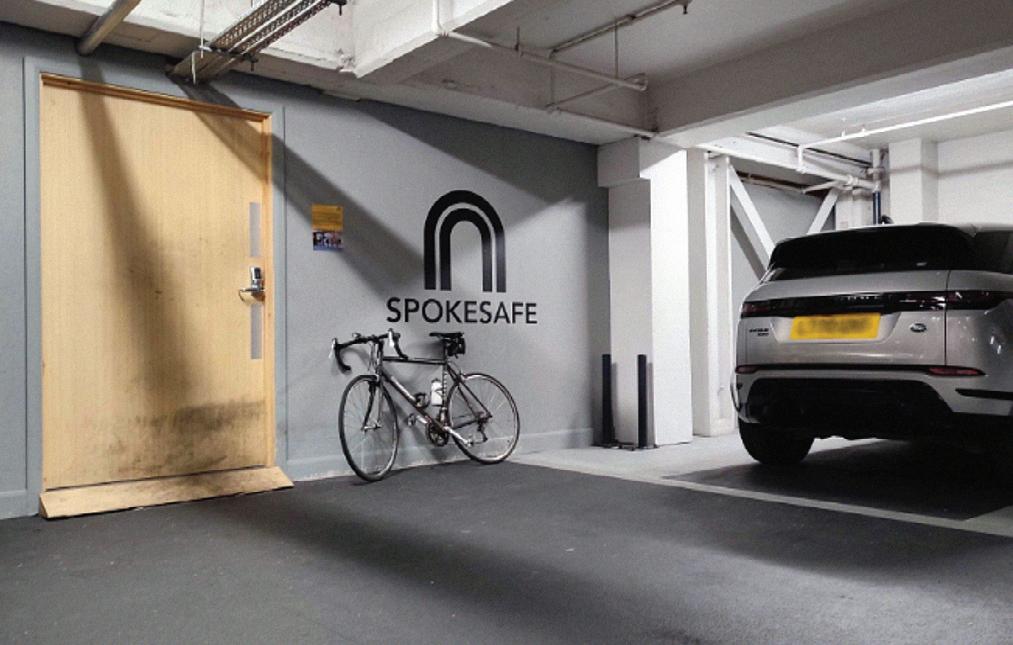
The hub can accommodate more than 40 bicycles and includes space for cargo bikes and non-standard cycles. It will also provide e-bike spaces with charging capabilities.
The hub, which is located inside Q-Park Chinatown will be open around the clock every day of the year. Each scheme member who accesses the hub will have to pass an ID Verification Check for
additional security.
John Denton, head of sales and marketing for Q-Park, said: “We are delighted to extend our partnership with Spokesafe into Q-Park Chinatown and further cement our excellent relationship with them.
“Sustainable urban mobility plans guide the future of parking and we are once again demonstrating how we are ahead of the curve in our industry.”
Spokesafe’s founder, Max Wilson, said: “The new active travel hub in Chinatown has been built to maximise our member experience, making it as easy as possible to park while also maximising security.”
•
•
•
Eugene Tsyrklevich, founder and chief executive of Parkopedia, has announced that any sale of the parking data platform will help good causes.

“I have legally committed myself to donate a part of any future Parkopedia proceeds to charitable causes as part of the founder’s pledge, with a particular interest in climate change and existential risks, support for immigrants and refugees, as well as helping the developing countries and their people to reach their full potential.”
We currently supply and have vacancies around the UK for Permanent and Temporary positions:



• Civil Enforcement Officers
• Environmental Enforcement Officers
• Parking Back Office (Appeals/Notice Processing/Correspondence)
• Parking Change Management
• Interim Parking Managers
• Car Park Attendants/Marshalls/Stewarding

• Parking Supervisors (Both Enforcement and Back Office)
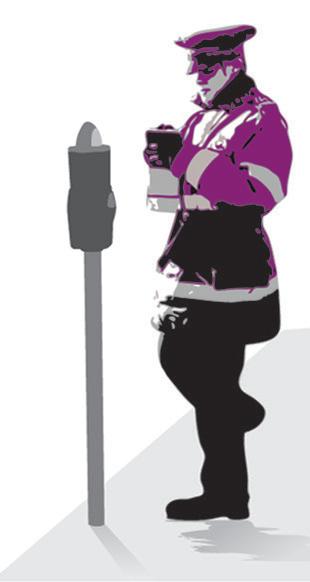
• Parking Management (Both Enforcement and Back Office)
• Heads of Parking/Directors
APH works with World Land Trust to protect threatened habitats

















Headline sponsors:


Organised by: Hosted by:






The transport sector is on the cusp of real change, driven by the need to decarbonise, to level up access to opportunities, to optimise the use of public streets and spaces and make transport networks more efficient.














This event will:
l Show how £90 million is supporting the trials of new transport innovation in the Solent and the three other Future Transport Zones l Highlight the benefits of real world testing for new technologies and approaches l Show how innovative places are making smarter and wider use of new technologies
Demonstrate innovative new ways to transport people around urban and rural areas


Bring together stakeholders including councils, hospitals, transport operators, communities, airports and universities





Editorial
Managing editor:
Mark Moran
Tel: 020 7091 7871
mark.moran@landor.co.uk
Production and design production@landor.co.uk
Advertising, sponsorship, marketing and exhibition packages
Jason Conboy Tel: 020 7091 7895 jason@landor.co.uk




Christina Pierre Tel: 020 7091 7959 subs@landor.co.uk
Accounts
Irina Cocks Tel: 020 7091 7854 irina.cocks@landor.co.uk
Business manager
Rod Fletcher Tel: 0191 280 1410
Printed by: Pensord Tram Road, Pontllanfraith, Blackwood NP12 2YA
Published by: Landor LINKS Ltd, Apollo House, 359 Kennington Lane, London SE11 5QY
© Landor LINKS Ltd 2022
www.landor.co.uk
Registered members of:

The Independent Press Standards Organisation www.ipso.co.uk
The Professional Publishers Association www.ppa.co.uk
Combined payments at Network Rail Stations via the APCOA Connect app
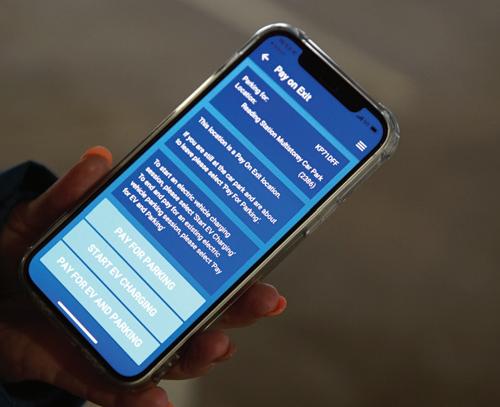

Bus operators are looking at a variety of options when it comes to transitioning from fossil fuelled vehicles to zero-emission alternatives.
There is growing interest in the use of biofuels and hydrogen, as well as electric powertrains. This transition is being seen at bus depots, where new fuelling and charging stations are being installed. There is potential to start looking at opening up bus depots to act as charging and clean energy fuel hubs serving other fleets, such as those deployed by local authority refuse collection operations or commercial delivery companies.
This month we take a look at the new Caledonia depot, located in Glasgow, which has had 160 rapid-charging points installed over the last nine months. Besides supporting First Bus’s growing electric fleet in Glasgow, the depot will also help other organisations operating in the city to decarbonise their own fleets. First Bus is currently trialling the use of the depot’s charging infrastructure to third-party businesses during the day when its buses are out on service.
Already looking ahead, First Bus also plans to expand the depot further, in partnership with Ofgem and Scottish Power Energy Networks, with the construction of a new substation. This will supply enough power to host an additional 200 vehicles and charging points and will see the Caledonia depot home to a total capacity of 350 charging points once built. It will be interesting to see how this project evolves.
Mark Moran Editor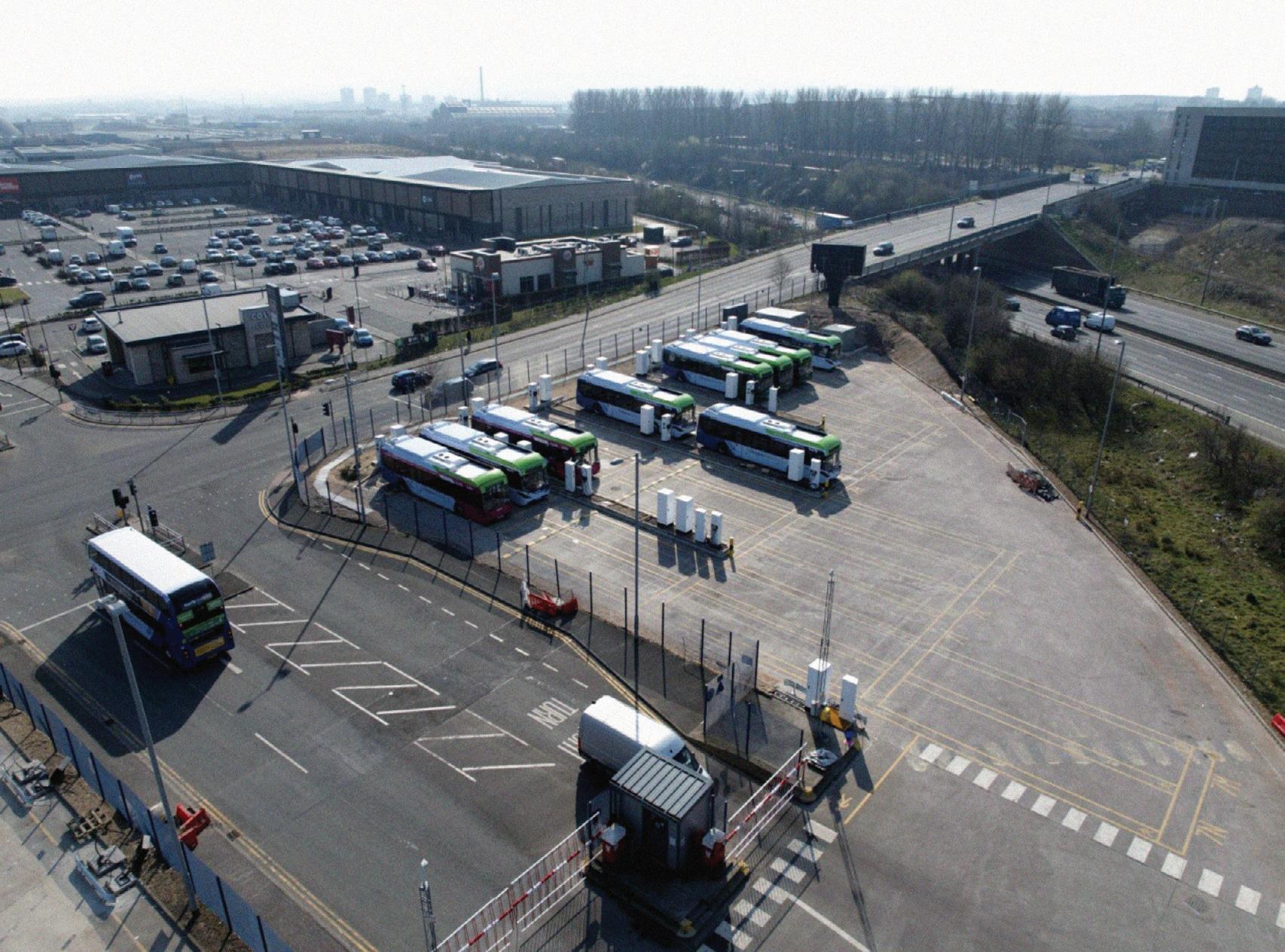
The transition to electric vehicles (EVs) will be a crucial step to achieving the UK’s net zero target. The sale of new petrol and diesel cars will be phased out by 2030 and from 2035, all new cars and vans must be zero emissions at the tailpipe. While EV technology, vehicles and infrastructure have developed rapidly in recent years, people still understandably have a lot of questions about this new technology.

The Department for Transport (DfT) has thus published a leaflet tackling what it sees as the most common misconceptions about electric vehicles.
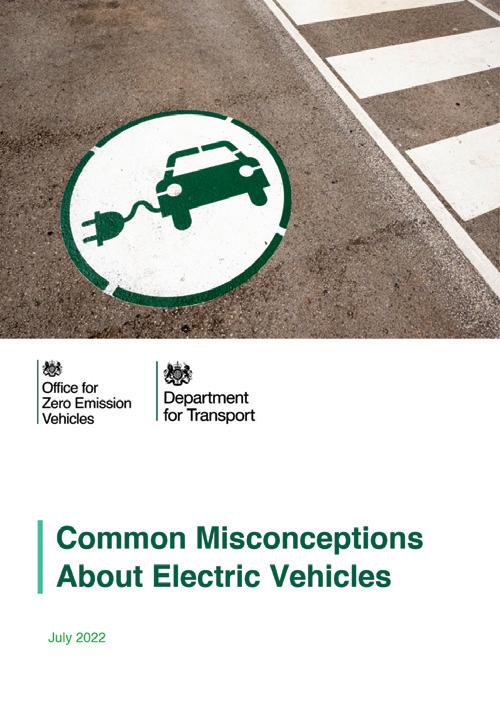
The leaflet addresses 19 common misconceptions surrounding EVs and charging infrastructure.
One example it addresses is the accusation that EVs do not have the battery range to travel as far as people need. The leaflet explains that, in reality, 99% of car journeys in England are under 100 miles, which means most drivers’ needs are easily met by an EV.
For those travelling further, there are over 20 models available with a quoted 200-plus mile range. There are also some new electric cars coming through with a range of more than 300 miles, enough to get from Exeter to Leeds.
With battery prices having fallen to 80% of what they were in 2010, continued price decreases in 2021 and further drops forecasted in the long term, the DfT says it expects to see more EVs available with greater range.
EVs are now in daily use across the UK’s roads as taxis and in other high mileage roles.
For most of us, filling a car with fuel, or charging an electric vehicle is a simple task. But for disabled drivers, people with reduced mobility and older people it can be a significant challenge.
Ford has developed a prototype robot charging station that drivers operate via their smartphone from inside their electric vehicle. The car manufacturer believes the technology could enable disabled drivers to stay in the car while charging, or they could leave the car while the robot does all the work.
Ford is testing the robot charging station as part of a research project to develop hands-free charging solutions for electric vehicles and fully automatic charging for autonomous vehicles.
Following initial lab testing, Ford researchers are putting the robot charging station to the test in real-life situations. Once activated, the station cover slides open and the charging arm extends towards the inlet with the help of a tiny
camera. For the trial, drivers were able to monitor the charge status via the FordPass app. After charging, the arm retracts back into place.
In future, the robot charging station, custom-made by Dortmund University, in Germany, could be installed at disabled parking spaces, in car parks or at private homes. Further applications could include fast and efficient charging of company fleets. The technology could also support more powerful charging to charge vehicles in a much shorter time.
Angela Aben, employee communications, Ford of Europe, uses a power-assisted wheelchair to gain more
mobility and independence.
“I stopped filling up my car myself years ago, because it became very strenuous,” she said. “My husband does it for me. The introduction of a robot charging station would offer me a much greater level of independence.”
Looking ahead, the process could become fully automated, with minimal or no driver involvement. The driver would simply send the vehicle to the charging station, with the infrastructure ensuring it reaches and returns from its destination autonomously.
A follow-up project with the charging network provider IONITY will look to improve the robot charging station.
The European Union has proposed a ban on the sale of new petrol and diesel cars from 2035 with the aim of accelerating the switch to zero-emission electric vehicles.
The changes made on 29 June mean that, as of 2035, all new cars and vans placed on the market in the EU will need to produce zero tailpipe emissions. The EU will confirm by 2026 whether hybrid vehicles and/or vehicles using alternative fuels will be able to be sold post-2035, depending if car makers can prove they are zero-emission.
The EU executive, the European Commission, proposed a 55% cut in CO2 emissions from cars by 2030
versus 2021 levels, much higher than the existing target of a 37.5% reduction by then. It also proposed a 100% cut in CO2 emissions by 2035, which would make it impossible to sell new fossil fuel-powered vehicles in the 27-nation bloc.
Italy, Portugal, Slovakia, Bulgaria and Romania pushed for the implementation date to be 2040. Of a total of 612 votes, 339 were in favour of the proposals, while 249 MEPs rejected, alongside 24 who abstained.
To boost EV sales, the commission has proposed legislation that would require countries to install public charging points no more than 60 kilometres (37.3 miles)
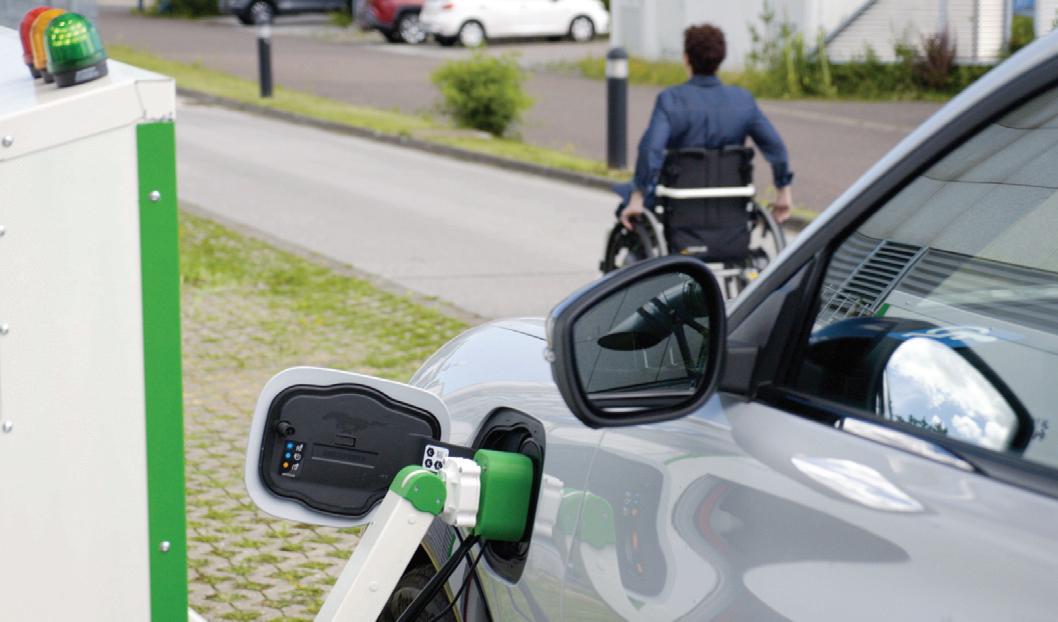
apart on major roads by 2025. It foresees 3.5 million public charging stations for cars and vans by 2030, rising to 16.3 million by 2050.
EU vice president Franz Timmermans said: “We are technology neutral, what we want are zero-emission cars.” However, he cautioned: “At the moment, e-fuels do not seem a realistic solution, but if manufacturers can prove otherwise in the future, we will be open. The transition to electric vehicles is going much faster than anybody had ever anticipated, but then we are under an obligation to create the right incentives for that. So the charging infrastructure should be there.”
System gives disabled drivers a helping hand
UK businesses are set to adopt more than 163,000 electric vehicles (EVs) this year as part of a major investment in fleet electrification, according to a new study by Centrica Business Solutions.
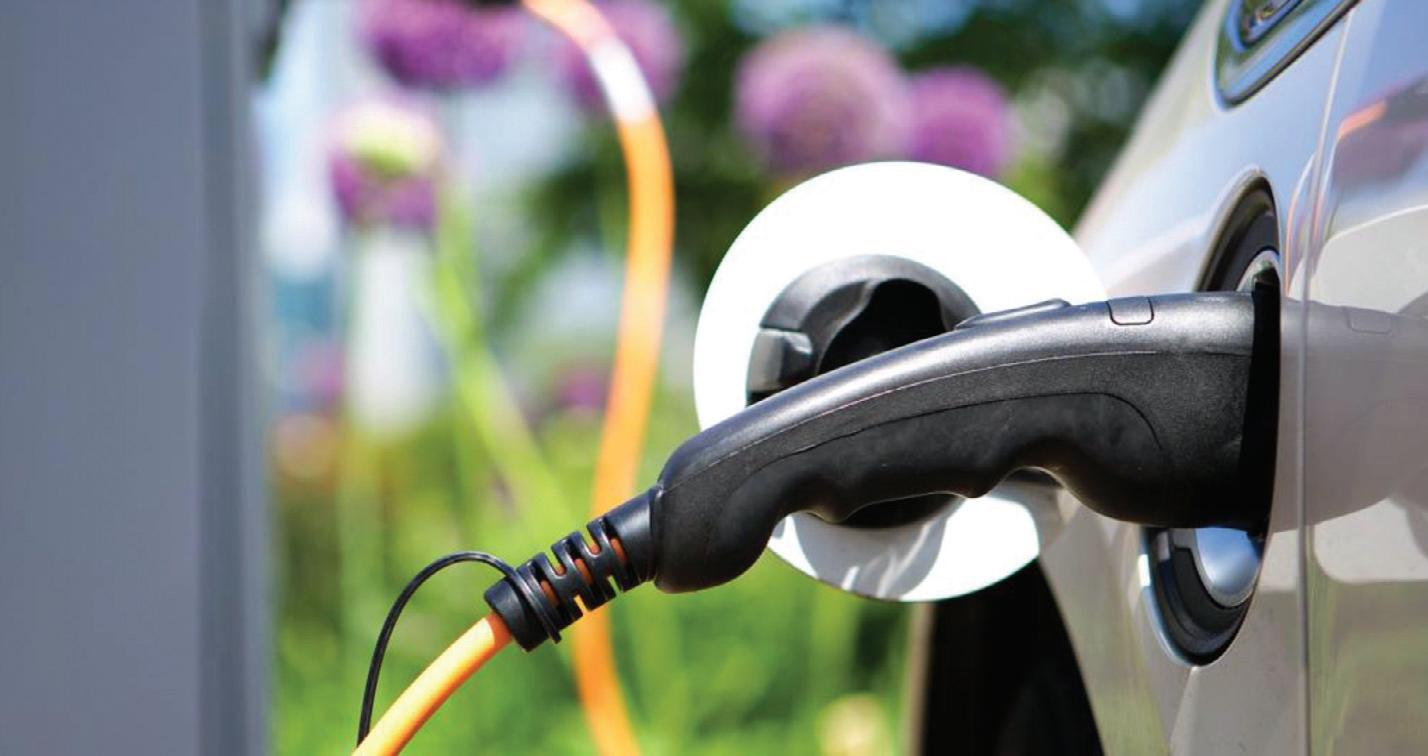
The increase would see over a third (35%) more business operated EVs on the road by the end of 2022, compared to the 121,000 registered by firms last year.
The research also found businesses spent £11.6bn on EVs and supporting infrastructure in 2021 and are planning a 15% spending increase over the next year, taking the total investment in fleet electrification to £13.6bn.
The majority of fleet operating businesses (62%) said they expect to operate a 100% electric fleet within the next four years, comfortably ahead of the 2030 ban on new petrol and diesel vehicles. More than four in ten (44%) said they had increased the number of EVs in their fleet over the last 12 months.
Key drivers for take-up include meeting sustainability targets (59%), demand from employees (45%) and pressure from customers to be more environmentally
friendly (43%).
Despite the record levels of planned investment, almost two thirds (63%) of businesses are worried about accessing public charging points to keep their fleet moving.
To overcome the charging challenge, almost half (48%) of firms have installed EV charging points at their premises, with more than a third (36%) planning to invest in on-site charging infrastructure in the next 12 months.
The research also revealed that two-
fifths (40%) of businesses have invested in renewable energy generation technology such as solar panels to power their fleets, while a further two-fifths (43%) plan to do so in the year ahead.
Greg McKenna, managing director of Centrica Business Solutions, said: “The UK continues to make significant inroads towards achieving its electric vehicle ambitions and it’s encouraging to see UK businesses prioritising investment in the journey towards electrification over the next 12 months.”
Battery electric has overtaken petrol to become the most popular fuel type on the BVRLA’s (British Vehicle Rental and Leasing Association) leasing fleet, according to the association’s latest Leasing Outlook report.
Accounting for 32% of new orders, this is the first time battery electric vehicles (BEVs) have been the most popular powertrain, marking a major milestone in the sector’s transition to zero-emission motoring.
BVRLA chief executive Gerry Keaney announced the landmark moment as part of the recent Fleets in Charge conference, saying: “Battery electric vehicles are dominating the order books for company and salary sacrifice cars. This sector could hit the phase-out target with years to spare. New electric car registrations have now overtaken petrol.
“Momentum for electric cars is building but will only continue if the government resists the urge to pull the handbrake by introducing a major hike in benefit-in-kind tax.”
With the direction of travel towards zero-emission vehicles well established, the BVRLA has forecast that the number of BEVs on the BVRLA leasing fleet will rise a further 40% in the next 12 months. The sector’s progress to net zero continues to accelerate, further reducing the emissions of the BVRLA leasing fleet.
Addressing delegates at Fleets in Charge conference, transport minister Trudy Harrison said: “The BVRLA and its members are leading this vital transition. Ten years ago, EVs were probably seen as a bit eccentric or a luxury that only a few could afford. I’m delighted that we’re turning that narrative on its
head, in no small thanks to the actions of so many in this room.
“Zero-emission vehicles are now more affordable, more popular, more important than ever and our best bet to a greener and low emission future.”
July’s Leasing Outlook report also shows business contract hire returning to growth, although the popularity of Personal Contract Hire (PCH) continues to close the gap in terms of the total fleet split. PCH is up 7.5% year on year, with salary sacrifice the most dynamic subsector.
Driven by favourable company car tax rates, salary sacrifice grew 41.2% to reach a total of 35,134 cars, the vast majority of which are BEVs. When considering vehicle type, vans are the main success story again, growing 12.8% to reach 496,911 units.
New car registrations in the UK fell by -9.0% to reach 112,162 units in July, according to the latest figures from the Society of Motor Manufacturers and Traders (SMMT).
July’s figures reflect a short interruption to registrations processing at one manufacturer due to a planned systems upgrade affecting a limited number of vehicles. This does not materially affect the overall market performance, said the SMMT.
The result marks the fifth month of consecutive decline, although the fall is the smallest recorded this year: June -24.3%; May -20.6%; April -15.8%; March -14.3%.
Declines were driven primarily by a -18.2% fall in registrations by large fleets, to 50,014 units, while consumer registrations remained steady at 59,847 units. As a result, private registrations in the year to date are now 3.7% up on 2021 as manufacturers prioritise private customers.
Battery electric vehicle (BEV) uptake grew 9.9% to 12,243 units to achieve a 10.9% market share for the month.
UK firms will adopt 163,000 electric vehicles this year, predicts Centrica
Public spending on electric vehicle (EV) charging infrastructure must focus on Britain’s deprived and rural communities, suggests Liberty Charge.
The chargepoint operator warns the government could fail to meet both its ambition of at least 300,000 chargepoints by 2030, and achieve its social levelling up agenda. Its report The Social Inequity of EV Charging argues that access to EV chargepoints will be more challenging for many people living in towns and cities. Those who cannot install at-home charging facilities will pay more for recharging their cars, it is argued.
Neil Isaacson, chief executive of Liberty Charge, said: “Shared on-street charging facilities will be their primary access for residents living in high-rise tower blocks, alongside hundreds of others in a single building. They will lack the convenience and cost-saving that the affluent members of our society will enjoy. People living in rural areas likely have limited access as power companies are reluctant to upgrade the local power network.”
Currently, any local authority can apply to the Local Electric Vehicle Infrastructure (LEVI) fund. Local
authorities that cover more deprived areas compete for funding on a par with those that cover wealthier regions. However, Liberty Charge argues in these more affluent areas, there is no justification for taxpayer financing of EV infrastructure, as the private sector is ready, willing and able to pick up the cost of installing and maintaining EV chargepoints. Instead, to ensure a truly national EV charging network and deliver value-for-money for the taxpayer, funding should be ringfenced for local authorities that cover more socially deprived or rural areas.
The research commissioned by Liberty Charge found that out of 100 councillors with EV infrastructure decision-making authority, 70% believe government spending should level up the social inequity in areas not commercially viable
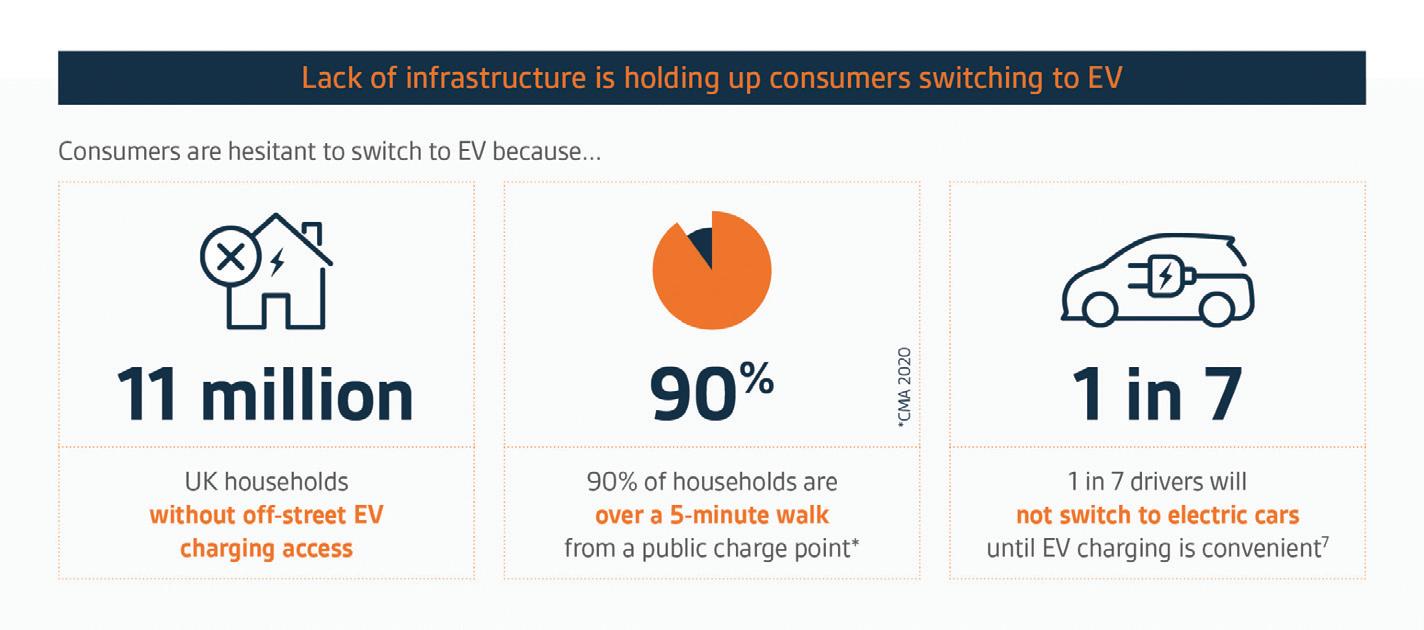
for the private sector. This is a view generally accepted by rural, semi-rural and urban local authorities, claims Liberty Charge.
Some 77% agreed that government should ensure everyone can charge their vehicle regardless of postcode. Of the twothirds with a formalised EV plan, even more (80%) agreed.
The government itself states in its 2022 Levelling Up report: “There are stark geographical inequalities between and within our cities, towns and villages… [which]… must be physically and digitally connected if they are to thrive”. It goes on to acknowledge: “Transport infrastructure investment has [historically] tended to flow to places where infrastructure is under the greatest strain rather than the least extensive.”
Gloucestershire County Council plans to install 1,000 on-street electric vehicle charging points over the next three years.
The council said that its programme aims to prioritise access to charging points for the one-third of residents in Gloucestershire who do not have off-street parking and charging. The council has also started identifying suitable locations and is bidding for government funding to accelerate this work.
A pilot scheme at 20 locations across Central Bedfordshire is making owning an electric vehicle a more realistic option for residents without a drive or garage. A cable channel, called the Gul-e, has enabled 20 residents who need to park their electric vehicles on the street outside their homes to safely connect to their electricity supply.
Set into the pavement, the channel means the charging cable between their home and car will not cause a trip or sliphazard for pedestrians.
The cable channel has been installed at locations in Aspley Guise, Biggleswade, Brogborough, Campton, Dunstable, Fairfield, Flitwick, Henlow, Leighton Buzzard and Pulloxhill.
Around one-third of carbon dioxide (CO2) emissions in Gloucestershire come from transport and private vehicle use accounts for over half of this (55%). However, the county believes switching from fossil fuel to electric vehicles has the potential to reduce these figures significantly. It says electric vehicles are a key element in the its’ strategy for reducing emissions and tackling the climate emergency.
Cllr David Gray, cabinet member for environment and planning, said: “It’s really positive news that we are moving ahead with our plans to install 1,000 electric vehicle
charging points around the county.
Electric vehicles cut emissions, improve air quality and reduce noise pollution, so please get in touch to help us plan where these charging points should be installed.”
The council has appointed Connected Kerb to install and run the network of EV chargers. Residents are being asked to give their views on locations.
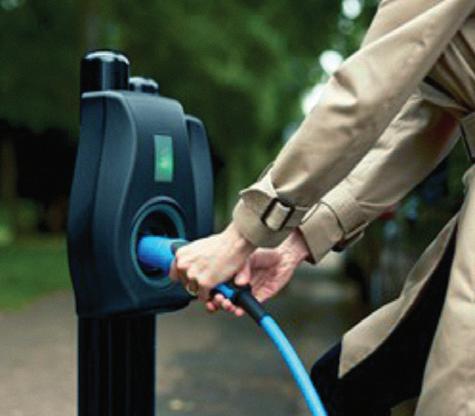
Chris Pateman-Jones, chief executive of Connected Kerb, said: “We are delighted to be delivering the largest single installation of EV charging points in the south-west for Gloucestershire County Council.”
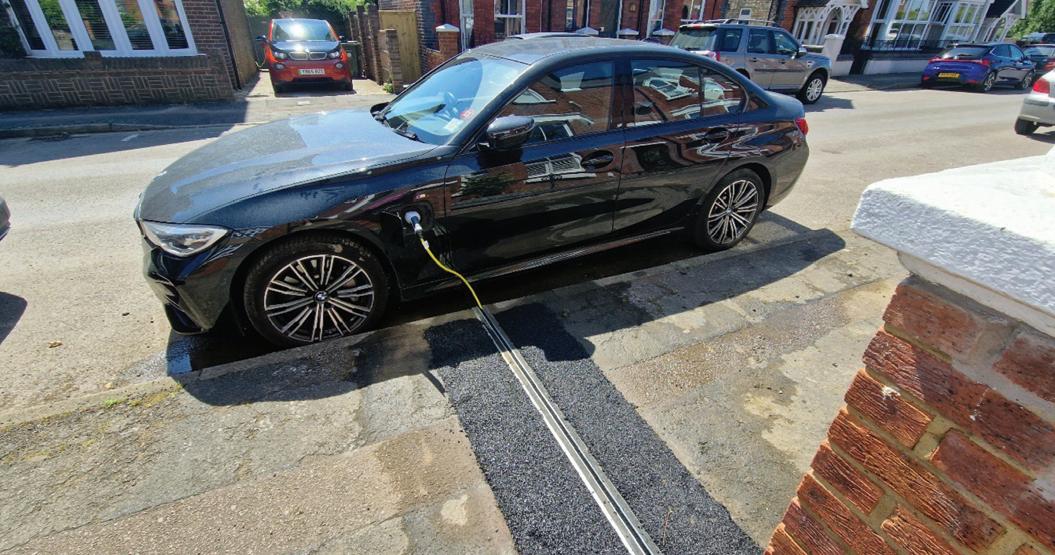
Current EV charging policy will hamper UK’s net zero plans, warns Liberty Charge
There has been an uptick in on-street charging provision while high-speed charger roll out gathers pace, according to Zap-Map. The EV charging app has published new midyear figures for chargepoint installations in 2022.
As of the end of June 2022, Zap-Map’s data shows that the number of ultra-rapid chargepoints, which cater to drivers travelling long journeys and looking to charge up as quickly as possible, has grown almost 40% since the end of 2021. Zap-Map suggests this shows ultra-rapid charging roll-out is more than keeping pace with the increase in EV drivers, which has grown 29% in the first half of 2022.
The growth in ultra-rapid chargepoints is largely due to networks such as MFG EV Power, InstaVolt and Gridserve Electric Highway, which are rolling out charging hubs with
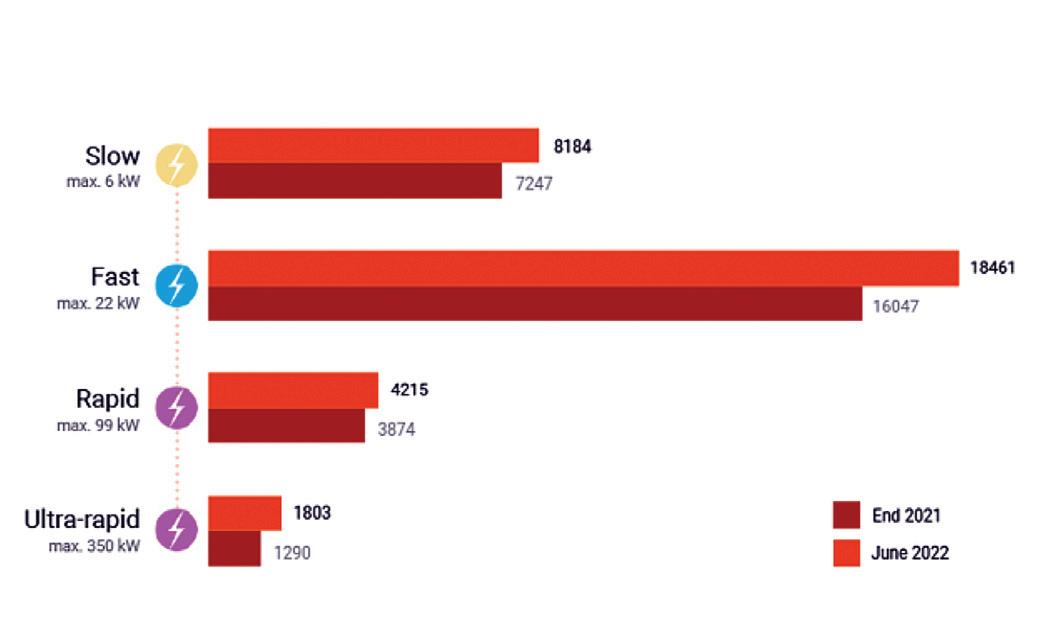
third place, rapid charging network InstaVolt has installed 166 chargers, while Zap-Pay partner Char.gy and destination charging provider VendElectric have installed 145 and 126 respectively.
at least six devices.
The total number of charging devices across the UK has grown by almost 15% since the end of December (from 28,458 to 32,663).
In terms of where chargers are located, of the 4,205 new devices installed this year, 1,662 of them are on-street chargers. On-street devices tend to be either slow or fast chargers and, generally speaking, provide an alternative to charging at home. The number of these chargers has increased by just under 19% in 2022 so far,
growing from 8,842 in 2021 to 10,504 at the end of June.
Although a combination of networks, including Char.gy and Connected Kerb, have been driving the growth of onstreet chargers, Ubitricity –which predominantly fits slow devices into lampposts – has installed 981 chargers so far this year, the most of any network. Of the 4,205 new devices installed in the first six months of 2022, almost half –49% – were installed by just five networks. After Ubitricity, Pod Point has installed 649 devices of varying speeds. In
Investment in electric vehicle charging infrastructure is key to ensuring Wales is a place of sustainable, interconnected and decarbonised communities, a new report states.
Amey Consulting has launched its second white paper on Creating Cohesive Communities across the Cardiff Capital Region
The paper, undertaken in collaboration with Maple Consulting, has the vision of bringing about better transport infrastructure to help forge new patterns of living, work and leisure, emerging from the Coronavirus pandemic. Key recommendations are: • the creation of new markets for public transport • the development of community hubs interdependent with new and improved transport infrastructure
• investment in electric vehicle charging infrastructure • embedding the circular economy in the Cardiff Capital Region.
Crucial to success, Amey Consulting argues, will be the need to effectively distribute social, economic, and environmental value at every step of community-making processes and unlock public and private collaboration outside of specific existing infrastructure schemes.
Dr Gerardo Puente Barragan, head of Amey Place, said: “The opportunities to create thriving and cohesive communities in Wales are significant, but they must be deliverable. While Amey Consulting’s strong presence in Wales means it is well-placed to successfully deliver integrated programmes of social, economic, environmental and transport
infrastructure improvement, it cannot do it alone.
“The key will be to properly engage with the myriad communities, partners and stakeholders to properly understand what is truly needed and how best to deliver it, capturing added value for communities at every stage of the process. This paper starts that conversation, and I hope it will stimulate discussion that leads to real and lasting change.”
Martin Lamb, director of Maple Consulting, said: “The pandemic has changed the way people live, work and spend leisure time in the region. These changes, coupled with the climate emergency and pressing need to decarbonise, do however, offer the opportunity to do things differently.”
The paper was part-funded by the European Regional Development Fund.
While EV charging networks have been getting chargers up and running across the UK, the area that has seen the highest rate of growth so far this year is the North East. Indeed, the number of charging devices in the North East has grown by 21% in the first six months of 2022, increasing from 897 at the end of 2021 to 1,085 in June.
Despite this, Greater London has seen the highest number of devices installed this year, increasing from 9,160 devices at the end of 2021 to 10,865 at the end of June – an increase of more than 18%.
The East of England has also seen significant growth, with 1,775 devices in the ground at the end of 2021, and 2,097 by the end of June – an increase of 18%.
There are now over 32,000 public electric vehicle charging devices available in the UK, according to the latest electric vehicle charging statistics from the Department for Transport.
The latest data shows that since 1 July 2021 the number of public devices has increased by 31%, corresponding to a total of 7,637. Growth remains uneven across the country, with some areas seeing far slower growth than others. This means there is an uneven geographical distribution of charging devices within the UK. The number of rapid devices increased by 31%, with an additional 1,423.
As of 1 July 2022:
• There were 32,011 public electric vehicle charging devices available in the UK
• Of the total devices available, 5,974 were rapid chargers
Compared to 1 April 2022:
• Available devices increased by 1,721, an increase of 6%
• Rapid devices increased by 480, an increase of 9%.
shift towards charging hubs
With sales of electric vehicles increasing, the availability of chargepoints remains a barrier to EV adoption. Carter Jonas advises some of the largest property owners in the country, some of which have been with the business since it was founded in 1855.
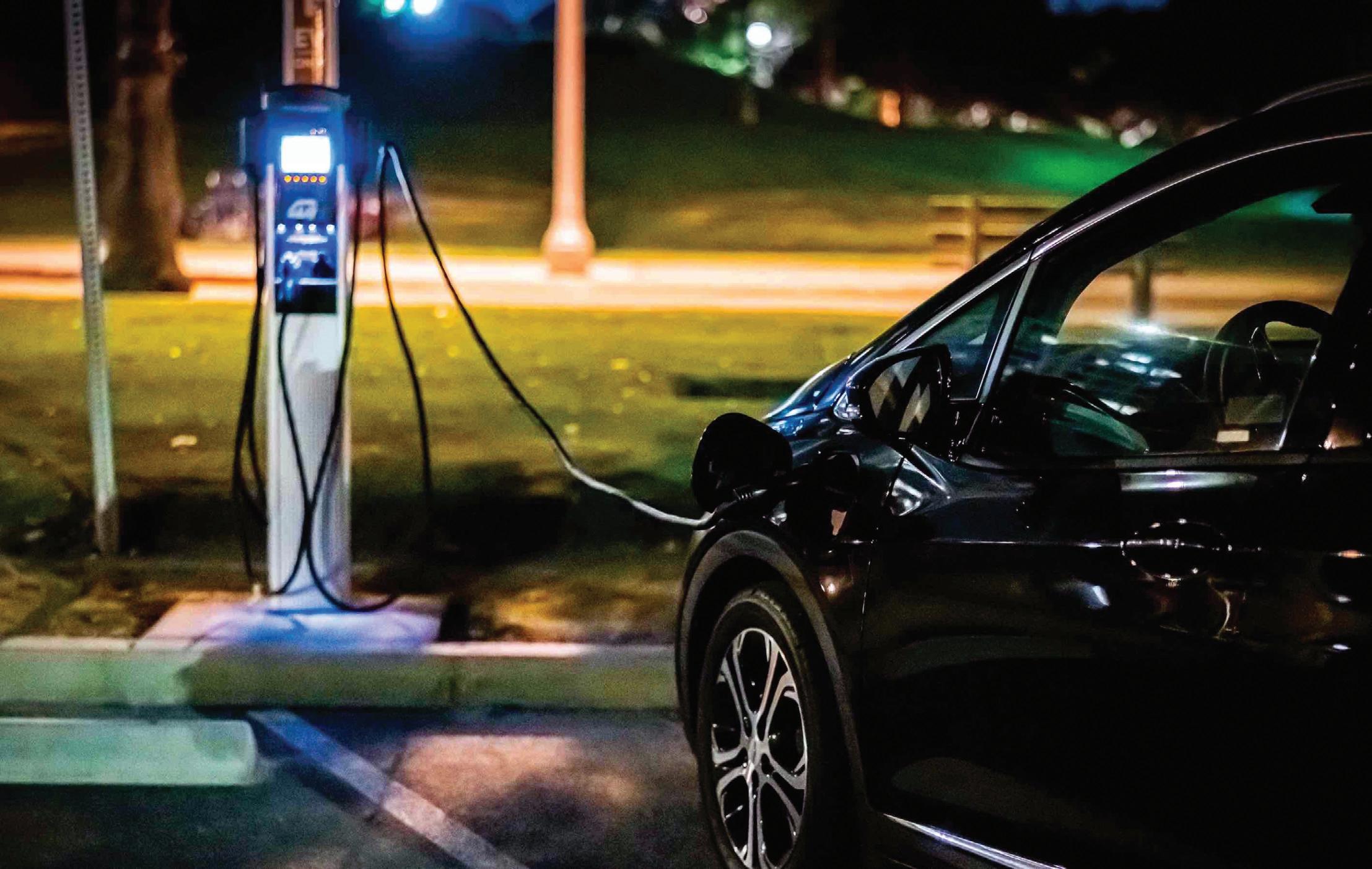
Geospatial Services is one of Carter Jonas’s many specialist advisory groups, working across all sectors as part of the organisation’s multi-disciplinary approach. This blend of expertise allows the business to give independent advice on all land and property aspects of an energy project, from renewable energy to EV (electric vehicle) charging infrastructure, battery energy storage to onshore oil and gas.
One of the fast-growing areas for the company is advising traditional roadside retailers and forecourt operators on their existing estates to enhance their EV capabilities. Alongside this, the team is also working with local authorities to identify energy opportunities, including EV, battery storage and solar schemes, examining solutions to support their communities.
For every new EV charging station opened, around 100 possible sites need to be examined, due to a high attrition rate. Land is constantly being assessed for other uses such as housing or by competitors, creating a fiercely competitive market. Plots also need to be assessed and bought now for the planning of future EV charging developments in 2030 years’ time.
Carter Jonas applies its geospatial expertise to consider multiple types of data simultaneously and speed up the complex process of defining where best to locate EV charging points and what type. The challenge is similar to applying geospatial analysis to traditional retail questions – where are the customers who need to charge their vehicles and where are the staff required to work in the charging locations? The EV process, however, is made far more complex by the addition of a power grid connection?
There is a vast and complex data landscape that needs to be examined to ensure the correct spatial distribution of EV charging facilities. Understanding
where people live, where they work and how they transition the strategic road network is fundamental. However, the biggest challenge is understanding the spatial relationship between the power network and the capacity needed to support new connections. Understanding the available grid capacity at a substation, its distance from the proposed site and the type of land cover between the two, all need to be carefully balanced to establish the cost of connection.
The Carter Jonas team uses GIS (geographic information system) from Esri UK to analyse the multiple types of data. A range of tools gathers the necessary spatial data into an enterprise geodatabase, including open source data from Ordnance Survey, the Office for National Statistics (ONS) and Department for Transport (DfT) plus demographic data from Esri’s Living Atlas, one of the world’s largest collections of geographic information.
Data is sometimes collected from the public using Esri’s mobile survey app,
Geospatial analysis can help property owners and developers identify optimum locations for electric vehicle chargers, says Simon Nigh
Survey 123, to help inform the planning need and the commercial argument. Density models for traffic and population analysis are also used along with other factors, such as the number of home charging points which will soon be in the market and the proportion of commuter journeys, compared to longer journeys, taking place on the road network.
A key challenge lies in knowing what capacity there is at a nearby sub-station, to help understand what mix of chargepoints is most viable at a proposed site. Accurate and timely data must be sourced from the electricity district network operators (DNOs), which involves tackling the different formats this data is stored in, both digital and analogue, including pdfs and spreadsheets which aren’t always GISready.
Carter Jonas also creates its own custom data sets, including the power grid data. Grid infrastructure can be found on DNO distribution heat maps but these quickly become out of date as the networks are so dynamic. The GIS team scrapes data and digitises it to develop the most dependable data.
Carter Jonas uses the location intelligence generated in various outputs, including strategy papers for local authorities, who want to identify the need for EV charging infrastructure within their communities. They may choose to either rent space to a developer or chargepoint operator to generate revenue or build a charging station themselves.
For other clients, the Esri GIS system is used to create web maps to present the data and enable the fast assessment of all variables on the same map. This allows clients to test multiple different scenarios in the real world.
As much of the demographic data required is already in the cloud and in the right format, via Esri’s Living Atlas, the custom online maps created by the GIS team are fast and responsive – they don’t need to go to the ONS and other data sources to download the data first. This
• For every new EV charging station opened around 100 possible sites need to be examined
• The biggest challenge is understanding the spatial relationship between the power grid and the capacity needed to support new EV charging stations. This relationship = the cost of connection and can vary significantly
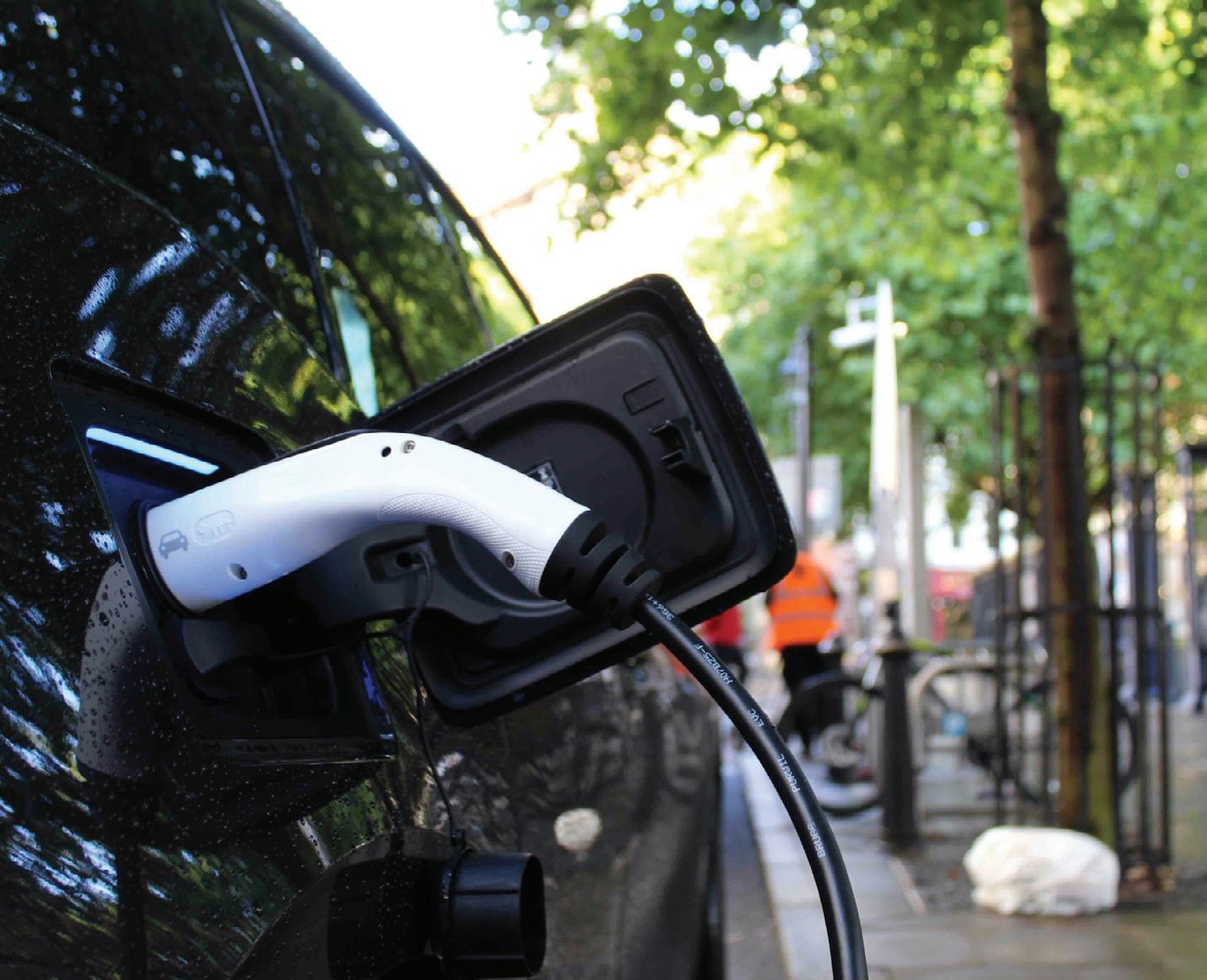
• Multiple types of data must be analysed simultaneously in a visualisation tool testing ‘what-if’ scenarios – 10-page paper reports are no use to clients
• There’s a need for landowners to act fast as grid connection is finite and roads can only sustain a limited number of EV charging stations.
means clients can query the maps and try infinite ‘what if’ and ‘where’s the nearest’ scenarios in real time.
Our clients need to analyse a lot of data quickly so require a highly responsive visualisation tool – reading a 10-page report is no good to clients. The Living Atlas data works seamlessly with the Esri web maps, allowing rapid interrogation when clients are looking at the whole range of variables and examining lots of different sites.
Carter Jonas is always exploring how digitalisation can improve productivity and client engagement. The web maps are a prime example of how technology allows the team to easily share the geospatial insight with clients, improve collaboration and accelerate the understanding of what represents a solid development decision.
With the race to provide more charging points and keep up with the soaring number of EVs on the roads continuing, the development opportunity for clients is a pressing one. Retail sites, offices and plots of land adjacent to the strategic road network are all potentially suited for EV
charging development, though in many cases landowners will not have considered it as an option. There’s a need for landowners to act fast as grid connection is finite and each road network is only capable of sustaining a limited number of these developments.

The biggest challenge is understanding the spatial relationship between the power network and the capacity needed to support new connections
The number of charging sessions on the UK’s biggest motorway electric vehicle (EV) charging network, the Electric Highway, has tripled since June 2021.
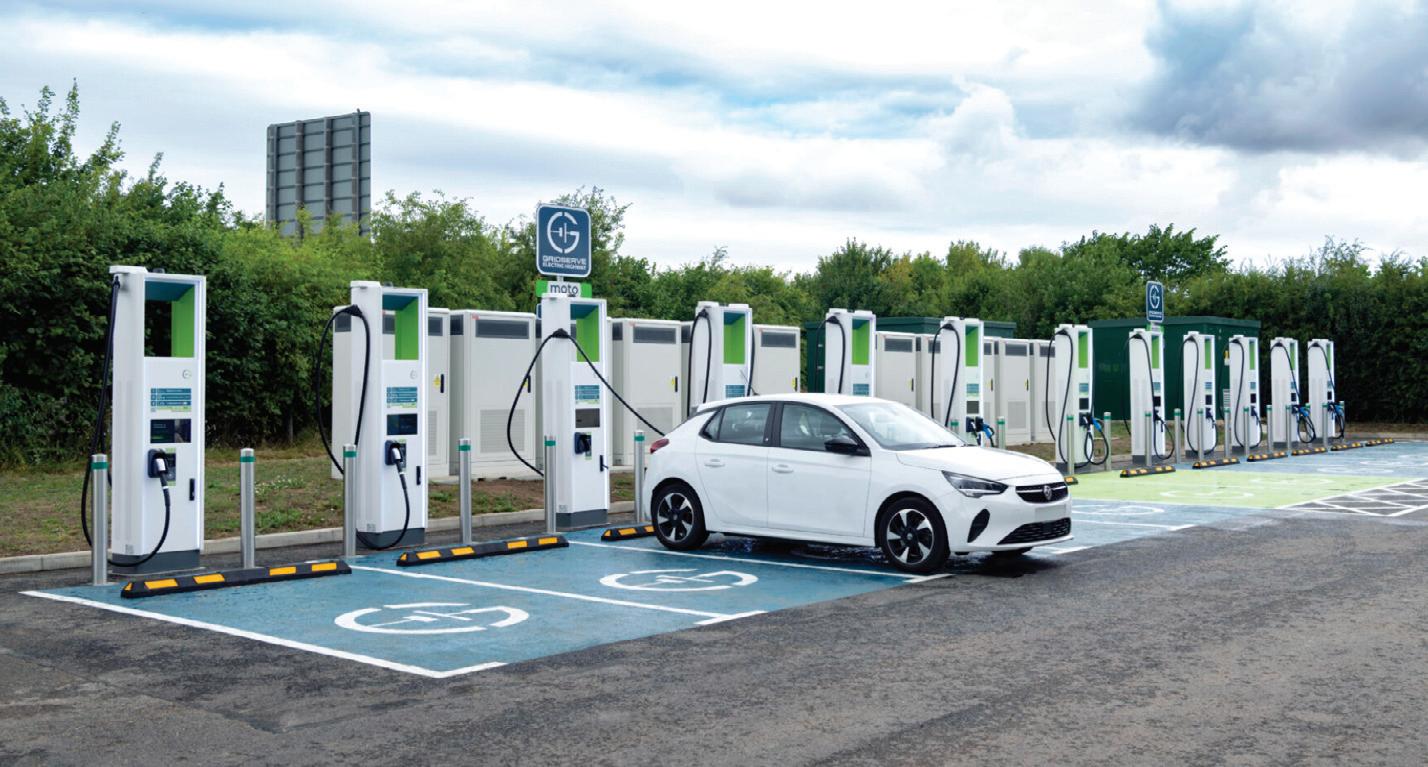
The Gridserve Electric Highway is now charging more than 100,000 EVs every month with net zero energy. One year since Gridserve acquired the network from Ecotricity the average charge time on the network also has decreased in-line with faster and more reliable charging.
Over the past year, Gridserve has upgraded over 160 charging locations with new chargers, delivering an additional seven high power Electric Super Hubs across the motorway network – each featuring a bank of six to 12 x 350kWcapable chargers, and opening a new flagship Norwich Electric Forecourt.
Dozens of additional sites are also under development and in construction.
Reliability, consistently reported as a number one priority for EV drivers, has significantly improved, now standing at up to 99% uptime, said Gridserve.
Accessibility has also improved. Contactless payment – previously unavailable at all legacy chargers – is now
ubiquitous across the network, making it easier than ever to charge and go.
Each Electric Super Hub includes at least one extra-wide accessible bay for every six EV charging spaces, and across the network, all three connection types (CCS, CHAdeMO, and Type 2 for AC) are available, catering for every type of EV.
The Electric Highway network is also integrated with dozens of maps, apps and navigation platforms, showing real time availability of chargers and supporting
journey planning across the UK.
Toddington Harper, founder and chief executive of Gridserve, said: “Only one year ago, we acquired the Electric Highway with the aim of making EV driving an enjoyable, ultra-convenient and stress-free experience throughout the UK.
“From day one, we have been focussed on delivering the best possible charging experience for drivers, and the response has been staggering with more people than ever charging at motorway service stations.”
Gridserve is submitting a planning proposal application to Liverpool City Council for an Electric Forecourt that would more than double the number of electric vehicle (EV) chargers in the area.
Planning permission has been granted for a Gridserve Electric Forecourt to be built on Outland Road, just north of Plymouth’s Home Park Stadium.
Plymouth’s first dedicated electric vehicle charging station will help support the city council’s Climate Emergency Action Plan, including its ambition for the region to be net zero by 2030.
Plans for the Plymouth Electric Forecourt on the A386/Outland Road have now been approved by Plymouth City Council following a detailed consultation. The facility will feature 32 EV charging bays providing a maximum 350kW capacity, allowing the latest electric


models to add 100 miles of range in less than 10 minutes. This allocation more than doubles the number of public chargers currently available in the region which, according to ZapMap, only provide a maximum 50kW charging capacity.
The facility will also include retail amenities including a coffee shop and EV leasing area, office pods and a premium lounge for drivers to relax while they charge.
The Plymouth Electric Forecourt is described by Gridserve as a compact design. It will feature a retail space suspended above the chargers with an on-site coffee shop, convenience retail including WHSmith and meeting rooms.
The proposed site is located on the A5047 Edge Lane, within the Liverpool Innovation Park. It would
have over 24 vehicle chargers supplied by renewable energy and connectors to serve all EV drivers.
By combining sustainable charging with a welcoming and educational space for all customers, Gridserve says the Liverpool development could become a significant carbon saving community asset.
Electric
is now entirely contactlessA new Gridserve High Power Electric Super Hub has been unveiled at MOTO Wetherby Design for the Liverpool Electric Forecourt Design for the Plymouth Electric Forecourt
Rail passengers with electric vehicles will be able to charge while they travel thanks to the introduction of 450 new electric vehicle charging points at Network Railmanaged car parks at railway stations. The charging points, powered by guaranteed renewable energy, provide enough power to fully charge a vehicle in as little as 3-4 hours.
In this phase, Network Rail has powered: 160 charging points in Reading; 111 in Manchester; 84 in Edinburgh; 56 at Leeds; and 41 in Welwyn Garden City.
Electric vehicle charging points will be installed across 10% of car parking spaces (approximately 779 spaces) at car parks managed by Network Rail by March 2024.
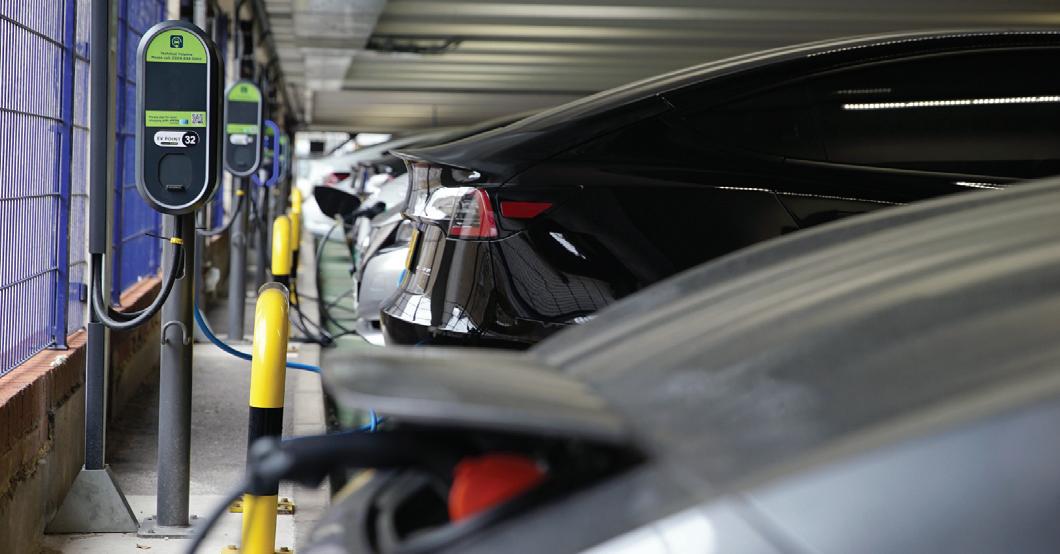
The Compleo charging points are marked with green parking bays.
Passengers can pay for their sessions via the APCOA Connect app.
Jo Lewington, Network Rail’s chief environment and sustainability officer, said: “As part of our wider environmental sustainability strategy, we’re working towards delivering a lowemission railway and aiming
to reach net zero emissions by 2045 in Scotland and by 2050 in the rest of Britain.
“Supporting the move to electric vehicles is a key part of that. We hope that by providing affordable, efficient and reliable charging points we can encourage more electric vehicles onto the road and help promote healthier air in and around our stations.”
Mark Tarry, Network Rail’s supply chain operations
Glasgow is now home to an electric vehicle rapidcharging centre as First Bus completes a transformation of its flagship Caledonia depot.
Caledonia depot, located in Glasgow’s southside, has had 160 rapid-charging points installed over the last nine months, supporting First Bus’s ambition to be emission-free by 2035.
Besides supporting First Bus’s growing electric fleet in Glasgow, it will also help other organisations operating in the city to decarbonise their own fleets. First Bus is trialling the use of its charging infrastructure to third-party businesses during the day when its buses are out on service.
First Bus plans to expand the depot further, in partnership with Ofgem and Scottish Power Energy Networks, with the construction of a new substation. This will supply enough power to host an additional 200 vehicles and charging points and will see Caledonia depot home to a total capacity of 350 charging points once built.
Scottish minister for transport Jenny Gilruth said: “I am delighted to visit the depot to see the scale of what is now the largest DC charging centre in UK, which has been made possible by £26.3m of Scottish Government investment. This really is a game changer in our progress towards decarbonising Scotland’s buses.
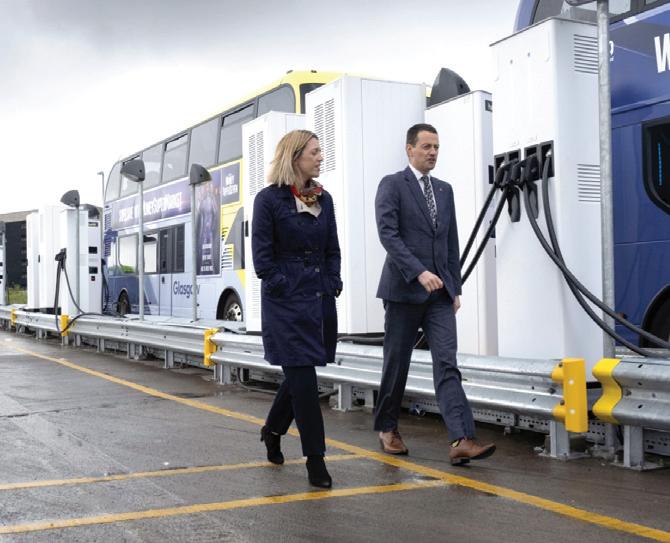
“Alongside free travel for under-22s and over half-a-billion pounds in long term funding for bus priority infrastructure, we’re putting buses at the heart of Scotland’s transition to net zero by helping people to choose to travel more sustainably. We can only achieve that transition by all pulling together. What’s been achieved at the Caledonia
depot is a great example of partnership working with the bus, energy and finance sectors to make the best use of Scottish Government investment.”
Duncan Cameron, managing director at First Bus Scotland, said: “Our Caledonia depot is a landmark moment on our journey to an entirely zero-emissions fleet and a vital step in decarbonising the local environment and improving air quality. We’re proud to enable more Glasgow companies to realise their own paths to zero emissions, too. With the great range of our new EVs, and the immense power of these new charging stations, our buses only need to stop to be charged overnight, allowing us to free up the depot during the day for other electric fleets in and around Glasgow.”
First Glasgow’s Caledonia Depot bus fleet will be 50% electric by December 2022 when it takes
director, said: “The decarbonisation programme team continues to deliver Network Rail’s decarbonisation ambitions. The team are making a real difference putting passengers first and supporting the country’s net zero ambitions.”
Kim Challis, APCOA’s regional managing director for UK&I, said: “We’re really pleased to have developed this solution in conjunction with Compleo to enable charging authentication and easy payment for Network Rail’s EV customers. This project solution also provides a significant step towards our sustainability strategy.”
Compleo’s UK managing director Valentin Scheltow added: “We are delighted to partner with APCOA. I know the combined power of our two organisations working together will provide other innovative solutions.”
delivery of a further 52 electric buses. Glasgow currently has 98 electric buses.
The depot’s new rapid-charging stations can fully charge a bus in just four hours if required and will be controlled via smart-charging software. This solution will ensure that power is used in the most efficient way, minimising the draw-down from the National Grid at peak times. First Bus plans to replicate this model across many more sites as part of its decarbonisation journey.
The project will now act as a pathfinder for other locations around the UK as First Bus look to ramp up their decarbonisation programme with further investment committed alongside recently awarded funding via ScotZEB (Scottish Government) and ZEBRA (UK Government).
First Bus managing director Janette Bell said: “This inspiring project has seen the depot transformed into one of the biggest EV rapid charging hubs of its kind anywhere. To deliver a project of this scale is a magnificent achievement for all the teams involved. Caledonia Depot is now our pathfinder project as we roll-out electric vehicles at scale across the rest of the UK and marks a very exciting turning point for both our people and our customers.”
More electric vehicles will be coming to Glasgow with First Bus being successful in the Scottish Government’s ScotZEB funding round; 50 new electric buses are planned for First Glasgow’s Scotstoun depot, and First Aberdeen’s zeroemission fleet will be bolstered with an additional 24 electric vehicles. First Bus and its local authority partners in five regions have secured UK government funding for new EVs through the Zero Emission Buses Regional Area (ZEBRA) scheme.
Funding will speed up roll-out of solar powered car park
3ti, a designer, installer, funder and operator of solar car parks (SCPs), raised a £1.8m investment pot within an hour of opening its first crowdfunding round. The funding will accelerate the roll-out of 3ti’s pop-up mini solar car park and electric vehicle charging hub, Papilio3.
The initial target of £500,000 was exceeded on Crowdcube within an hour. The funding round attracted around 2,000 investors.
“Almost instantly achieving our initial investment target demonstrates a public belief in 3ti’s technology, our vision for renewable energy solutions and the team behind the two largest solar car parks in the UK,” says Tim Evans, 3ti founder and chief executive officer. “The funding round provides investors with an opportunity to back a company committed to decarbonising the UK transport industry and buy
The Co Charger electric vehicle charger sharing platform has reached 10,000 users and over 3,500 available chargepoints. Launched in November 2020, Co Charger enables motorists who own EV chargers to rent them out to neighbours without driveways or living in flats or terraces, helping them run an electric vehicle without being dependent on public charging. The app handles the ‘matchmaking’, bookings, and payments.
According to Zap-Map, Co Charger is now the third largest and fastest-growing UK charging network, bigger than BP Pulse (2,718), Tesla (Destination and Supercharger 1,876) and ChargePlace Scotland (458).
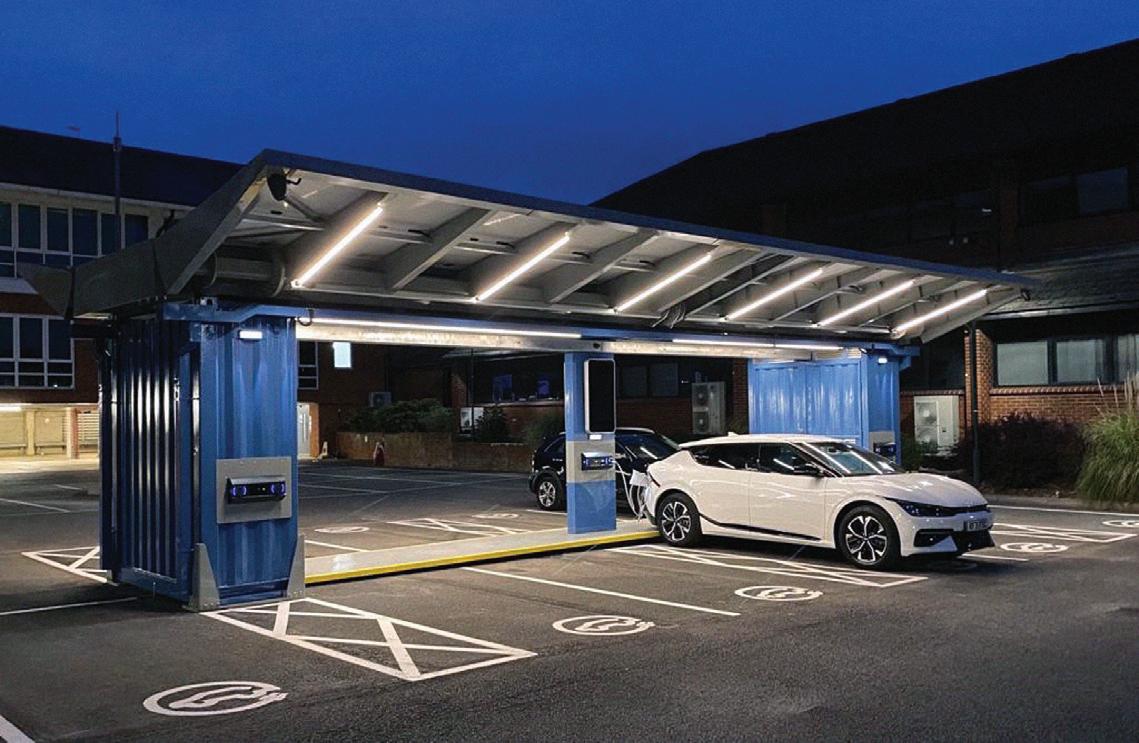
Joel Teague, chief executive of Co Charger, said: “Community charging is a game changer in the UK’s transition to electric vehicles.”
into a dynamic, exciting and unique product: Papilio3. It is expected that 14 million EVs will be on UK roads by 2030. To optimise the environmental benefits of these vehicles replacing polluting petrol and diesel alternatives, it is crucial that an efficient, reliable and sustainable charging infrastructure is in place.”
Launched in May 2022 at the Surrey Research Park, hosted by the University of Surrey, Guildford, Papilio3 can be deployed within 24 hours and provides up to 12
electric vehicle (EV) chargepoints. It integrates three technologies that are normally considered independently – solar electricity generation, battery energy storage systems and EV chargepoints.
Papilio3 harnesses solar power, battery storage and grid energy to optimise the reliability and carbon intensity of EV charging, particularly for drivers who are not able to charge at home.
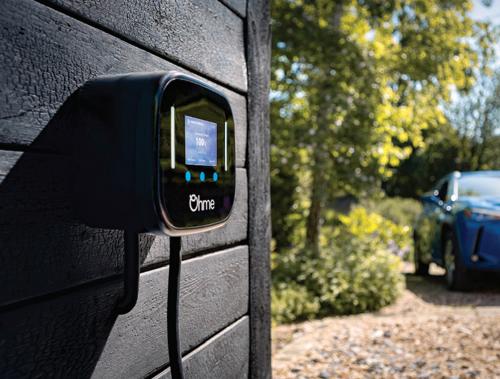
“If we could capture it all, the solar energy that falls on
the planet in just one hour is enough to power the whole world for a year. Yet currently, around 40% of UK electricity is still generated from fossil fuels,” said Evans. “If EV drivers are rapid charging at peak times, then this carbonrich, expensive electricity is what’s being used to replenish their batteries. This doesn’t need to be the case. Further investment in 3ti through our Crowdcube campaign will enable us to accelerate the deployment of Papilio3 units and inspire a change of mindset for EV drivers. Since launching Papilio3, we have received over 100 enquiries worldwide and aim to have at least 30 units in operation by the end of the year.”
Papilio3 is built around a recycled shipping container and seeks to overcomes many traditional barriers to entry for solar car parks, such as long lead times caused by complex planning and grid approvals and investment requirements.
It is envisaged that Papilio3 units will be owned by 3ti and provided to customers on a monthly rental basis.
Octopus Electric Vehicles and smart charger provider Ohme are offering drivers a single bundled package including a new car, smart charger, EV energy tariff for their home and 5,000 miles of free charging.
“Demand for electric cars is soaring, driven by low running costs and convenient charging at home and work and we’ve seen that drivers are looking for experts that can offer the full EV package to guide them through their journey,” said Fiona Howarth, chief executive of Octopus Electric Vehicles. “With more EV models entering the market every month, and innovative tariffs like Intelligent Octopus making charging your car as easy as your phone, we expect the transition to accelerate.”
Included in the package, drivers will be able to take advantage of six hours of cheap electricity rates every day on the Intelligent Octopus tariff to charge their cars. As Octopus Electric Vehicle’s only approved charger supplier, Ohme’s smart chargers can automatically adjust a car’s charging times according to your tariff, without needing to be pre-set for certain hours.
“This exciting new bundle makes it easy for motorists to make the switch to electric in
a way that’s simple and hasslefree,” said Ohme CEO David Watson. “It enables drivers to not only charge their EVs in the most cost efficient way using off-peak tariffs and smart charging, but the 5000 miles of free charging means that they can effectively drive from London to Miami for nothing!”
With petrol and diesel prices now 27% higher since the start of the year, the 5,000 miles of free charging means that a typical UK driver could spend less than £35 in running costs for an EV using smart charging for their entire first year. Ohme also offers drivers the option to charge their car when renewable energy generation on the National Grid is at its highest, further lowering their CO2 impact.
Over 10,000 people have registered to preorder a ZipCharge Go portable EV power bank when they go on sale in 2023. Since launching at COP26 in November 2021 pre-order registrations have come in from 88 countries and every continent across the globe.
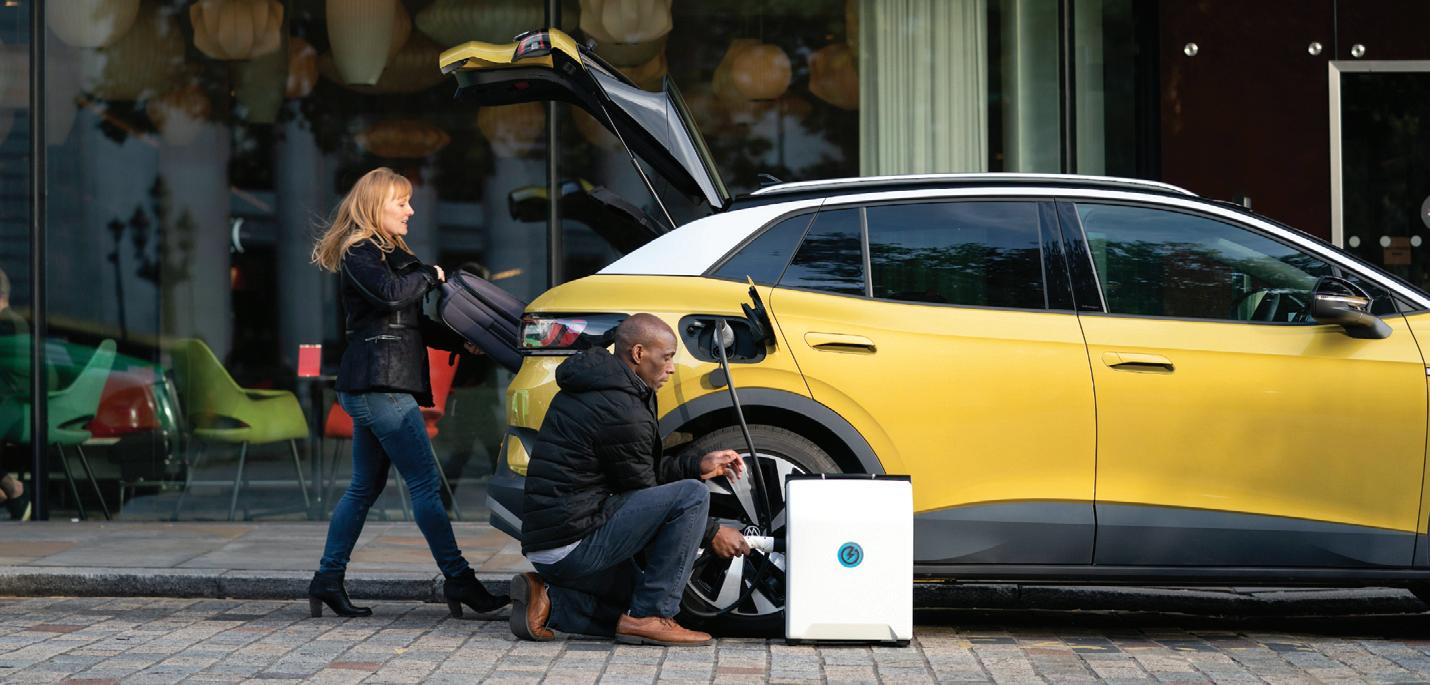
ZipCharge said the pre-order registrations come from every major EV market around the world including the US, UK, Canada, Germany, France, The Netherlands, Italy, Sweden with every country of the EU represented, as well as established Asian markets including China, Singapore, Hong Kong, Japan, India, Taiwan, Korea, Thailand, along with the Middle East and African nations.
Registrations have also come from island nations in Europe, the Caribbean, Pacific Islands and the Mascarene Islands where there is a lack of EV charging infrastructure to support EV adoption.
ZipCharge has recently won two separate awards. The ZipCharge Go was awarded the Physical Technology Of The Year: Electric Energy at the highly acclaimed Energy Awards in the UK. The Energy Awards is an annual event celebrating achievements and innovations from across the energy industry. The Energy Awards
Judging Panel 2022 praised the ZipCharge Go for addressing a huge growth area with technology that has the needs of both the user and the community in mind.
ZipCharge was also successful in being selected as a finalist at The Proptech Startup and Scale-up Europe Awards 2022 following a live pitch semi-final that took place in Brussels in June. This competition is part of the European Commission’s Startup Europe initiative. ZipCharge is just one of ten startups to progress to the final in September in Brussels, which will see announcement of the winners in each category and division following a final pitch competition.
Chargepoint management platform
Fuuse has unveiled a new service for fleet operators. Building on the company’s electric vehicle charging software, Fuuse Fleet’s suite of tools supports corporate fleet managers from initial transition planning and site readiness to infrastructure installation, and charger operation and maintenance.
Fuuse Fleet starts with a transition planning tool that utilises telematics data. This provides fleets with information on which vehicles can transition immediately to electric, including any changes that can be made to existing routes to maximise the number of vehicles transitioned.
Using historic and live site energy data Fuuse Fleet’s planning tools and reports investigate whether sites have enough electrical capacity to handle charging needs now and in the future, and feed this into capacity planning that determines the infrastructure needed to support the fleet transition. Fuuse then draws upon a network installers and hardware partners to project manage implementation. The Fuuse back
office chargepoint management system is then configured to meet the fleet’s operational, maintenance and cost-management requirements.
The delivery of Fuuse Fleet is supported by a number of new hires, including Thomas Arapura, new head of product Strategy, who joins from Centrica, and Russell Olive, head of Fleet, from MiX Telematics..
Russell Olive said: “When I talk to fleet managers, I’m posed with the same question: where do I start? They all know they need to make the transition and that the timer is ticking. At Fuuse we’ve built a solution that takes the mystery away, making sense of a whole new world backed by the data that fleets are very comfortable with. So that initial transition piece is an absolutely vital foundation to the success of any fleet transition.”
Thomas Arapura said: “Fleets, more than most, have an important part to play in the EV rollout – but they can’t do this on their own. It is our responsibility as innovators in this sector to make that transition as painless and efficient as possible.”
ZipCharge co-founder Jonathan Carrier said: “Reaching 10,000 pre-order registrations in seven months shows the appetite the public has for our portable EV charger. People around the world are seeing how it will transform energy while enabling EV ownership – and there has been particular interest in island nations where there is growing concern about energy resiliency and lack of infrastructure both at home and in public, some 50% of people who registered already have a fixed home charger. They see the Go as an essential tool that provides more flexibility and convenience to charge anywhere they park.”
Construction services company BAM has launched an electric vehicle charging infrastructure business to work with developers, local authorities and private sector organisations to design and install EV charging solutions across the UK and Ireland.
The company envisages working with construction, retail, commercial, leisure, schools and colleges, transport hubs, hotels and sporting venues. It will work with other industry leading brands to deliver the latest technology to its clients.
BAM Charging Solutions will offer AC and DC charging solutions for electric vehicles, plant and equipment from 3 to 350kW, and help companies to address any electricity supply capacity issues.
The company says it will
offer a flexible chargepoint management platform, designed to help maximise the value of chargers.
Developed in partnership with drivers, chargepoint operators, local authorities, installers and industry experts, the EV charging platform is customer focussed and independent of any charger manufacturer.
BAM is already active in the EV infrastructure sector, and claims to have installed over 50,000 charging points.
Jason Reed, director of BAM Site Solutions, said: “We are delighted to be able to offer our clients an independent EV solutions, which combines our decade long track record of delivering similar schemes in the Netherlands and the engineering excellence you expect from BAM.”
Strong international interest in portable powerbankThe ZipCharge Go in action
Today’s cars are bigger, heavier and more often electric. Lödige Industries, a provider of automated parking systems, is responding to this development with an update of its sliding pallet technology. 5BY2 uses a sliding pallet system to provide optimal use of space in residential developments.
Eliminating the need for driver walkways within the parking system and the requirement for internal or external access ramps can save more than 60% of the space taken up by traditional car parks, says the company.
Lödige Industries has increased the load capacity of its parking solution to 3 tons, adapting the equipment and drives as well as expanding charging technology for electric vehicles. The new system is being deployed for the first time in a luxury residential complex in northwest London. The Lödige
Industries team completed work on-site recently and is maintaining the system on the basis of a service contract.
Robert Bawn, director, car parking solutions at Lödige Industries, said: “We didn’t touch the essentials of our proven technology: concurrently moving pallets on individual conveyors for maximum space saving and layout flexibility.
“What we did, however, was aimed at providing solutions to three key trends we have seen over the last few years: larger and heavier cars, electric vehicles and changes in user
not subject to planning permission. The unit supports future technologies such as 5G, IoT and air quality sensors.
The Chameleon follows the modular design of all Connected Kerb charging points, featuring enabling infrastructure that contains expensive components sitting underground. This can be installed before EV demand rises, reducing unused infrastructure and the need for further ground excavation for maintenance.
behaviour and access patterns.”
Both SUVs and EVs are on the rise and largely responsible for the heavier weight automated parking systems need to transport these days. For its product upgrade, Lödige Industries has therefore worked on strengthening equipment as well as improving drive technology to increase the load capacity. This enables architects and developers to cater for a wider variety of cars when they plan and design automated parking solutions for their projects, increasing the attractiveness of
the resulting property to investors and users alike.
Globally the number of electric vehicles is on the rise. In 2019 alone, global e-vehicle stock climbed by 43%.
Architects and developers alike are forced by regulations as well as buyer intent to offer e-charging in their parking facilities. This has long been an issue for many automated parking technologies, especially since car manufacturers have yet to agree on a standard for wireless charging.
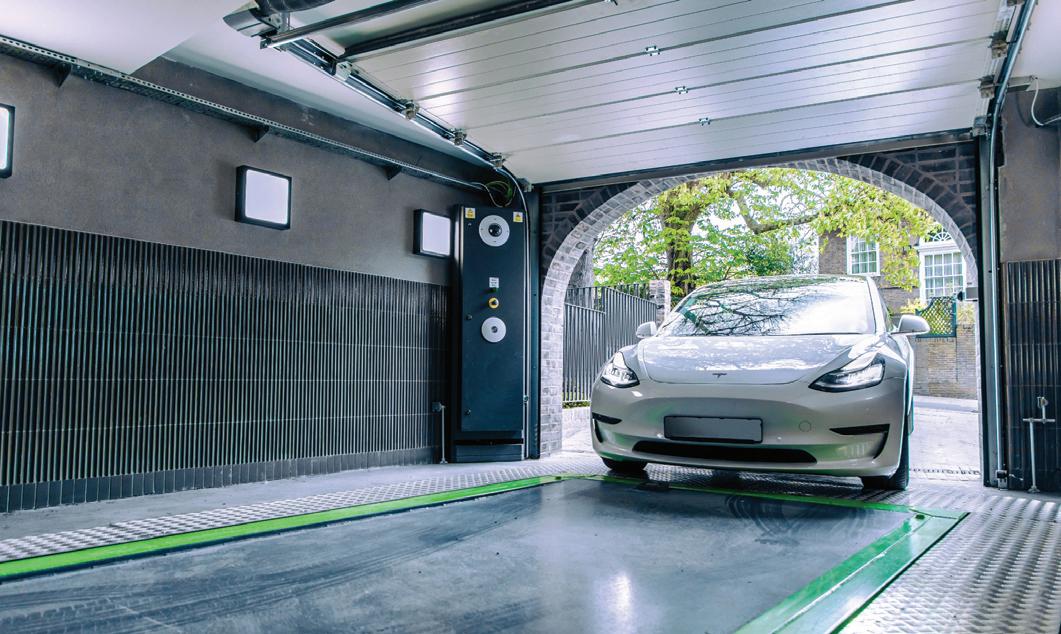
The new 5BY2 offers 100% e-charging for all spaces. The new technology is claimed to be resilient against dust and dirt and responds automatically to periods of high system activity to ensure vehicles can be retrieved quickly and efficiently at any time. The new e-charging technology supports individual billing per vehicle and can be retrofitted in existing systems.
An intelligent load management system automatically exchanges a fully loaded car with an empty car if not all spaces are fitted with a charging facility.
Connected Kerb has launched a new charging point for EV users without driveways. The bollard-style Chameleon is a dual charger for public on-street settings. Made predominantly from recycled steel, the Chameleon stands at under one-metre tall so is accessible for wheelchair users and
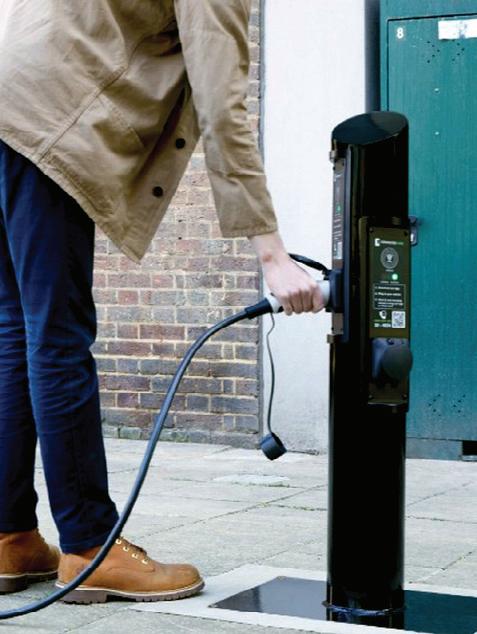
Chris Pateman-Jones, chief executive of Connected Kerb, said: “We’re committed to facilitating the widespread transition to electric vehicles for users who cannot charge their vehicle at home. Our latest charger design, the Chameleon, is a real game-changer in the EV infrastructure market. To pack so much technology into a small post with a dual socket is no mean feat and the solution is a credit to the product and innovation of the Connected Kerb team.”
Owners of electrified Jaguar and Land Rover models will be able to charge their vehicles at home via a new agreement with Andersen EV, a manufacturer and supplier of customisable, high-end vehicle chargepoints.

Andersen EV’s A2 home charger, which comes with 7 or 22kW power options, will
be available to all customers and is compatible with the full range of electrified Jaguar and Land Rover vehicles.
The A2 features a hidden compartment that ensures the charging cable and plug cannot be seen when not in use. Its look can be tailored to specific tastes, with a choice of 96 colour and finishes.
Renault Trucks has unveiled a multimodal, last-mile, e-mobility concept for urban deliveries. Designed and commissioned by Renault Trucks, the E-Tech Master OptiModale combines three types of electric transportation in one vehicle: a van, cargo bike and drone.
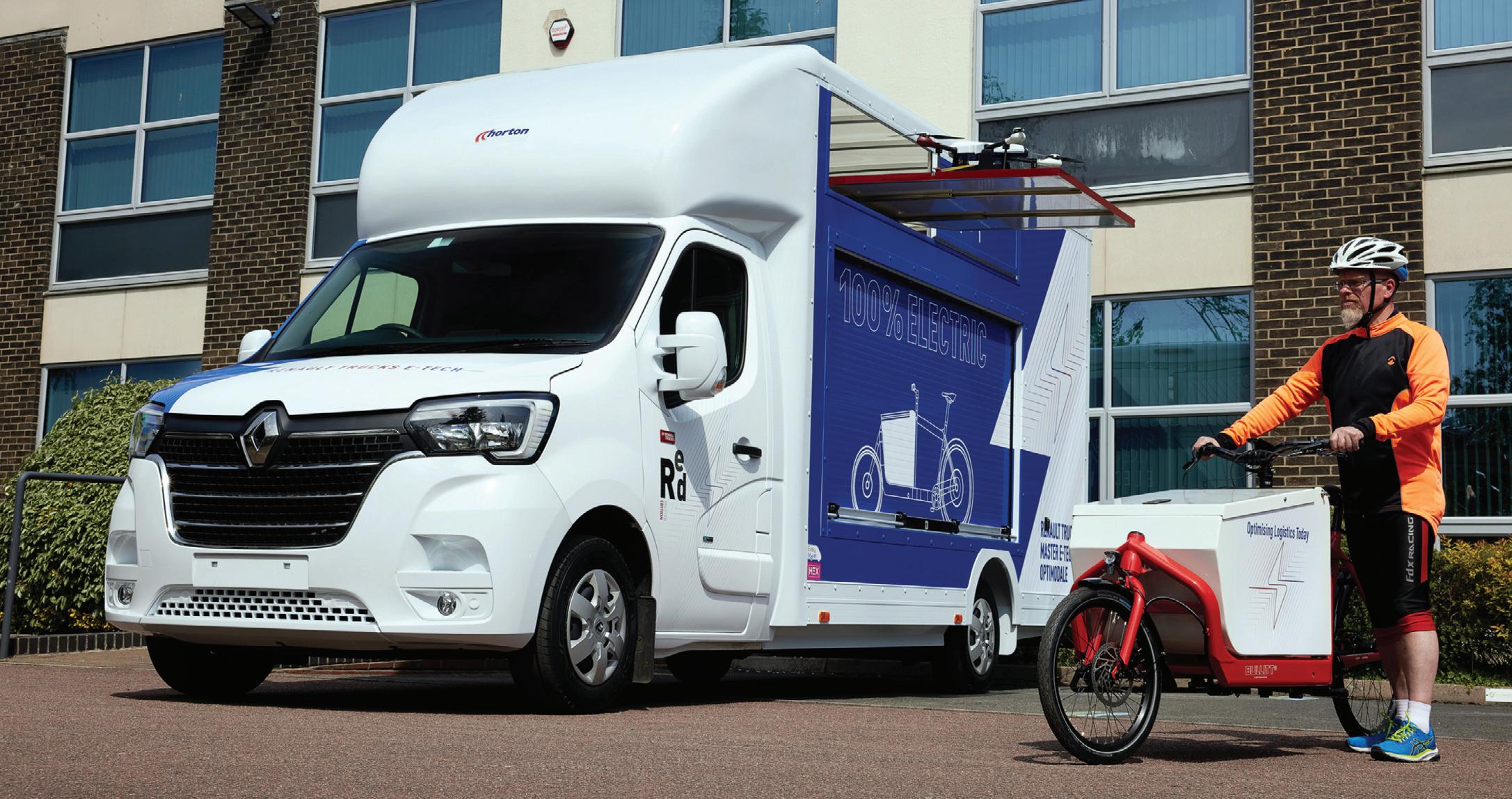
The E-Tech OptiModale’s specially commissioned Low Loader Luton body holds the parcels and acts as the ‘mothership’ for the eCargo bike and drone helipad system.
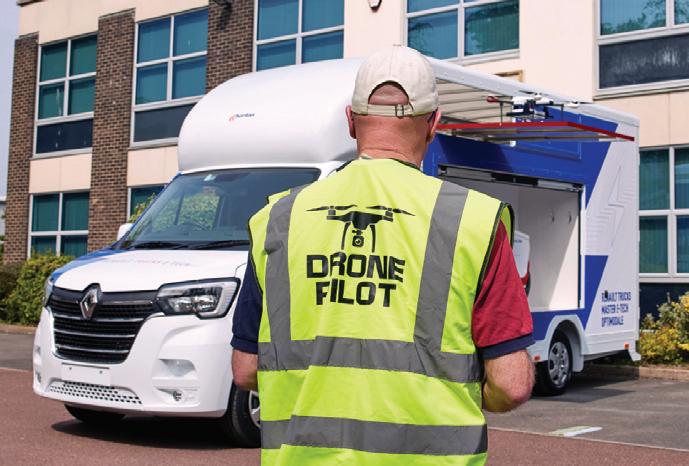
Grahame Neagus, head of LCV at Renault Trucks UK & Ireland, said: “The all-new Renault Trucks E-Tech Master OptiModale addresses the pressing need to improve air quality and pollution in our cities while improving accessibility and productivity for operators. By harnessing multiple modes of electric transport, this is an all-in-one sustainable solution that is set to transform the rapidly growing parcel market, and can be replicated anywhere in the world.
“The E-Tech Master OptiModale is a two-person operation, offering the flexibility of delivering larger parcels by van, whilst the second team member takes the eBullitt cargo bike for last mile deliveries where congestion is at its worst. Additionally, the drone provides rapid deployment for urgent situations, such as delivering vital drugs or supplies to
challenging or inaccessible locations. OptiModale delivers an innovative ‘lastmile’ solution and is a clear illustration of the breadth and depth of our thinking, providing Renault Trucks logistics customers with a sustainable solution from 2kg all the way up to 44 tonnes.”
• 3.5 tonne LWB L3H1 E-Tech Master van with Low Loader Luton body by Horton Commercials
• eBullitt electric cargo bike
• parcel-carrying drone from UVATEK.
Based on a Renault Trucks E-Tech Master Platform Cab chassis with the R75 electric motor and a 33kWh battery (also available with the new 52kWh battery for even greater range) the 3.5 tonne LWB L3H1 platform cab is ideal for combining both range and payload for this type of operation.
Offering a typical range of around 80 miles before requiring charge, this vehicle is ideal for back-to-base operations that are located on the edge of major
conurbations where entering the inner town or city requires zero emission vehicles.
A specially commissioned 4,100mm Low Loader Luton body by Horton Commercials has been equipped for parcel delivery with folding shelving, the electric cargo bike store to the nearside complete with bike lift, and heli-drone pad system.
The latest generation eBullitt electric cargo bike, capable of carrying up to 100kgs of smaller parcels, is finished in a Renault Trucks Red frame with corresponding white cargo box. The cargo bike is equipped with the latest Shimano e-system that can provide up to 50km of power assist for the cyclist and once back on board the E-Tech Master OptiModale, the battery can be removed and charged within 1 hour to 50%, 2 hours to 80% and 4 hours 100%.
Above the eCargo bike location is the retractable heli-drone pad from which the latest generation parcel carrying drone from UVATEK can be launched, carrying high value loads up to 2kgs in weight.
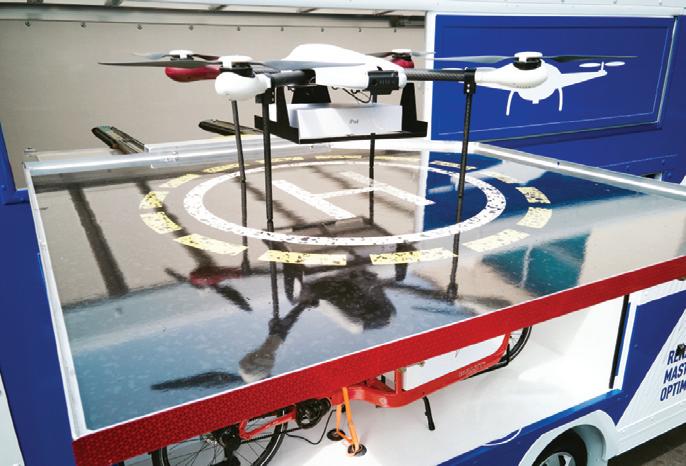
Supported by:
Traffic and parking management teams provide an essential service. They keep our towns and cities moving. They work to provide sufficient, equitable and safe access to the kerbside for residents, shoppers, businesses, people with disabilities and the emergency services.
Traffic + Parking 2022 will examine themes such as themes such as:
l Civil parking enforcement l Moving traffic regulation l Clean air schemes l Parking payment services l Kerbside management l Signs, lines and TROs l Low Traffic Neighbourhoods l School streets l Electric vehicle charging l Mobility hubs l Pavement parking l Residential and permit parking l Public consultation l Blue Badges
l Cycle, e-bike and e-scooter parking l Road user charges
The conference will feature expert presentations and topical debates.
If you have an idea for a talk contact the event’s programmer Mark Moran, Editor, Parking Review E: mark.moran@landor.co.uk


Presented by:
Organised by:
Local Authority / Third Sector Free


Private Sector £225 + VAT

Traffic + Parking 2022 provides your company with the perfect opportunity to carefully target the marketing of your products and services to those within the smart city planning, active travel, intelligent mobility and parking sectors. To participate in this sector-defining event contact Jason Conboy


T: 020 7091 7895
E: jason@landor.co.uk

Exhibitors include:
Local authorities and their partners are focussed on reducing traffic congestion, ensuring the free movement of public transport and safety of pedestrians. They are increasingly key to enabling active travel, as well as implementing schemes that reduce vehicle-related pollution and delivering electric vehicle charging infrastructure. www.traffic-parking.uk
Fly-tipping is a blight on society that imposes a huge cost for both local authorities and landowners. Yet a lack of joined-up thinking and a consistent, country-wide strategy is exacerbating the problem. In the majority of cases people want to do the right thing. But dumping cardboard boxes and bottles alongside over-full and under-emptied recycling containers is an offence that could lead to a potential prison sentence of 12 months and a fine of up to £50,000 for convictions in Magistrates Courts.
Individuals and businesses have a duty of care to correctly dispose of waste – yet many fail to understand the need to check the credentials of waste disposal services, leading to their waste being unlawfully dumped. Enterprises of criminal fly-tippers are becoming more commonplace.
Councils need to improve citizen education regarding effective waste disposal but they also need to make it easier and ensure services are more consistent. How much of the annual £400m cost associated with clearing flytipping could be avoided if recycling bins were emptied more frequently or if signage was improved to tell people the closest alternative when bins are full?
Fly-tipping is adding enormous costs to UK councils when pressure on finances is already intense. Local authorities handled 1.13m incidents of waste dumping in 2020-2021, up 16% on the year before. But the financial burden of fly-tipping is also felt by landowners, most notably farmers. There has been a 300% rise in fly tipping in certain areas, leading to damage to land and animals, as well as creating an unacceptable financial cost, with landowners responsible for the removal of the dumped waste.
Plans are being discussed to address this issue. The Scottish Countryside Alliance (SCA) has backed proposals for tougher measures to crack down on fly-tipping, including removing the legal responsibility from the person on whose property the waste has been dumped and making the person who generated the waste legally responsible for it. There is also a call to increase and standardise the penalties for fly-tipping.
The lack of consistency is being targeted in a plan to prevent councils from charging individuals for the removal of waste such as plasterboard, bath units and bricks. While the government banned such charges in 2015, an estimated third of local authorities still charge for certain types of DIY waste by applying rules to residents designed for construction waste. The removal of these charges could save individuals up to £10 per individual item, according to the Department for Environment, Food and Rural Affairs (Defra).
The waste removal service model varies across the country. Some councils have reopened household recycling centres completely after the COVID-19 induced closures; others have retained appointment systems. Opening hours vary dramatically between sites, even within the same local authority area. The regularity
with which smaller recycling sites, often located in car parks, are emptied also varies widely. Is it any surprise that ill-informed citizens leave their bagged waste alongside the full bins – an act that can incur a £400 fixed penalty notice (FPN)?
Waste removal contractors are only employed to remove the full bins – they have no remit to remove any items left alongside containers. The council will then receive complaints from local residents about piles of unbinned recycling – adding further costs both in complaints handling and waste clearance. These inconsistencies combine to fuel the commercial waste management industry. Few citizens understand the need to check for a waste management licence or the chain of custody that should be in place to ensure correct waste disposal. Instead they rely on the unlicensed ‘man with a van’ to dispose of their waste. Confusion and inconsistency create the perfect opportunity for opportunistic individuals to mislead the public, take their money and dump their waste.
Local authorities need to make the entire waste disposal process easier for the public. Education needs to improve, as does accessibility to services, with consistent opening times and frequently emptied recycling bins. The easier it is for people to access, preferably free, services, the less likely they are to rely on unlicensed individuals.
Essentially, spending more on good quality services will drastically reduce the market for commercial fly tipping activities.
Environmental enforcement officers play a key role in improving citizen education regarding fly-tipping, carefully explaining the legal position regarding leaving waste outside designated bins. These officers hold vital information about the usage of recycling
centres that could be used to support waste management strategies and ensure services reflect the needs of citizens.
Routine feedback about the frequency and type of FPNs issued in specific locations should automatically feed into the waste disposal model. Does the council need to empty cardboard bins more frequently in response to the explosion in online shopping? Is one recycling location used far less than others? If so, are citizens signposted to this location when others are full? Could it be relocated to a place citizens would be more likely to use?
A joined-up approach could empower enforcement officers to be more proactive. For example, combining rapidly deployed mobile cameras with artificial intelligence (AI) and number plate recognition (ANPR) to identify fly-tipping vehicles in real-time.
An alarm alerts enforcement officers to an incident, allowing them to rapidly attend the location, improving the speed with which culprits can be identified.
The fines for illegally dumped commercial waste are uncapped in Crown Court and can result in a long prison sentence. Councils are keen to prosecute commercial fly-tipping, although this can be a costly option, especially when compared to an FPN. Any enforcement processes and systems that can be deployed to rapidly identify and fine culprits will help to deter this insidious, opportunistic market.
It is vital to create a joined-up, intelligencedriven waste management strategy.
Combining a strong enforcement model with improved access to waste disposal services for citizens should make a difference to the levels of fly-tipping experienced across the country.

Dyl Kurpil is managing director of District Enforcement
Joined-up refuse planning and better education are key ways to reducing the blight of fly-tipping, says Dyl Kurpil
we are exactly that: software specialists. We aren’t driven by parking charge notice (PCN) revenues; we specialise in adapting technology to meet client requirements.
There is currently much focus on private parking, given upcoming changes in relation to the Code of Practice. Having worked with universities and campuses for several years I know this area is very different to on-street parking – so much so that Imperial launched a brand within our business to specifically address this market.
That brand, Open Parking, was intended to convey a message around a fair, open and transparent approach to parking. We felt that there was an opportunity to harness technology to make parking enforcement far more customer and compliance focussed, and ultimately to deliver a fundamentally better experience for motorists – all of which are essential elements in private parking.
Clearly, if somebody parks against the signage terms and conditions of the car park, they should receive a parking charge. We therefore need robust procedures which enable us to tackle improper parking and especially repeat offenders.
However, I believe the focus should foremost be upon compliance, which perhaps hasn’t always been the case in the private parking sector. Technology can play a major role in both the quality of experience and also the education of the motorist. In this way we can deliver better outcomes for hospitals, universities and other parking estate owners.
I have long felt that solution providers are well placed to support required changes in the private parking sector, specifically because
Technology can play a central role in nudging people towards compliance: Consider a situation where a motorist is short of time arriving at a car park. If the parking process is fast and simple, ideally with cashless payment options, it actively encourages compliance. Conversely, imagine it is raining but the car park only offers an old coin payment machine – such a system could encourage motorists to ‘take a chance’.
Together we need to focus on improving the quality of the experience, and thereby make it easier for people to pay. We may not reach 100% compliance, but I know we can move people in the right direction.



An illustration of the power of this more positive approach comes from one of Open Parking’s university clients. By prioritising compliance over enforcement, the university ensured allocation of spaces for those who require them while also increasing PCN recovery rates fourfold – from 17% to 68%.
While revenue generation was never the university’s priority, there is nevertheless clear evidence that a positive parking approach not only improves the experience for motorists; it does also increase revenue – more than doubling in the example outlined above.
Harnessing technology which has been implemented in local authorities can certainly be helpful, as recovery rates tend to be higher on the public side. However, experience and track record in the public sector will only get us so far; we also need to really focus on delivering technology that meets the requirements of private parking operators, and truly supports motorists by providing the experience they deserve.
Focussing on customer experience is the best way forward, says Ashley Bijster at Imperial Civil Enforcement Solutions
It is increasingly important that we as an industry think about how we educate motorists to enable better informed decisions
Ashley Bijster
I expect anyone reading this article understands that parking enforcement is vital. Consider the impact of improper pavement parking on people with disabilities or parents with young children; or the implications of blocked entrances at hospitals preventing ambulances from accessing the site.
There will always be people who don’t follow the rules, so we require technology that enables enforcement where required, and appropriate fine levels to discourage rule breaking.
However, we should recognise that driving and parking have changed radically in recent years. Consider the growth in areas such as moving traffic regulations, electric charging bays which introduce overstaying fees when the battery is full, and increasing number of Clean Air Zones (CAZs). There are simply far more regulations today – and many more vehicles on our roads.
I therefore believe it is increasingly important that we as an industry think about how we educate motorists to enable better informed decisions. I have seen a number of good examples in recent times, including authorities that offer training following bus lane offences, and Birmingham’s CAZ which was underpinned by the ‘Brum Breathes’ communications project.
Appeals management solutions can also play an important role in the education of motorists, explaining why notices were issued and enabling them to avoid such incidents in the future.
As this article has discussed, technology can support both the education of motorists and the quality of the customer experience, in this way changing behaviour by encouraging people to park appropriately.
The upcoming changes to the private parking code of practice will create fresh challenges for parking operators and estate owners. I believe organisations that focus primarily upon enforcement are likely to struggle, while those that embrace user experience as a way to maximise compliance will be better able to manage this period of transition.
An array of proven modern technology solutions are available to support this approach. Together we can create a consistent, transparent and stress-free experience for all involved.
Ashley Bijster is managing director at Imperial Civil Enforcement Solutions. With over 20 years’ experience in outsourcing, enforcement and smart city technologies she is a widely respected figure within the industry. She was elected president of the British Parking Association in 2014 and is a regular speaker at industry conferences and seminars. With her knowledge of the enforcement, environmental and traffic management sectors, she has helped to consolidate the company’s position as one of the most progressive, innovative and responsive operations in its field.
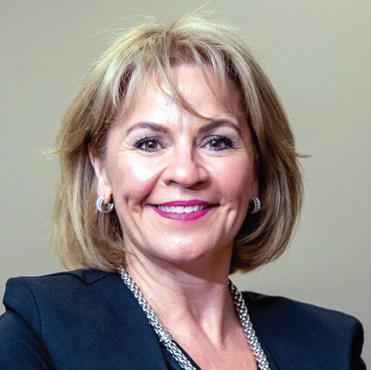
Private parking enforcement tends to be very different to on-street, as Imperial’s experience of working with hospitals and university campuses shows
People visiting hospital shouldn’t have to think about parking, so processes must be easy, fair, streamlined, seamless and ultimately supportive. However, we need to recognise that especially for hospitals in towns and cities, the estate must be managed in order to preserve parking for the core requirement. This is a challenge, but a supportive approach can ensure allocation of space for those who need it. Key technologies here include permits, driver self-service, business processing, enforcement officer management, handheld scanning tools, and notice/appeals management.
Universities tend to be highly focussed on the sustainability agenda, and often aim to use their parking estate to ‘nudge’ people towards green mobility options. As such, highly flexible permit rules are often found in these locations, taking into account a range of factors such as distance from home, public transport options along the route, childcare drop-off and collection requirements and more. With universities, key technologies tend to include permits, ANPR cameras, business processing, patrol staff management and notice/appeals management.

With the private parking sector there are a range of technologies that will facilitate a supportive, compliance-focussed approach. Some of the those that fit well here are outlined below.
Modern permit systems are highly flexible, catering for authorised vehicles and visitor vouchers with variable permit types and costs. Simple online applications and approvals streamline processes and enable motorists to ‘self-serve’, accessing services whenever and wherever they wish, thereby reducing back office workload. Where staff are allocated spaces, they can even be paid for through salary deduction.
For more ad hoc visits, motorists should be able to easily pay for their parking via app, online or text, with options to extend a stay without returning to the vehicle. A streamlined user experience requires no prior registration, with text confirmation of vehicle registrations to eliminate phone misunderstandings.
Parking estate owners can manage patrol beats in real time with location updates, patrolling positions and PCNs issued displayed on a map. Thus armed, managers can oversee multiple sites or events, allocating staff to specific sites in order to ensure efficiency and quickly address any issues arising, such as vehicle obstruction, overstaying or parking in wrong places.
With ANPR, high-definition infra-red cameras positioned at entry/exit points capture vehicle number plates of all vehicles. The system identifies any rule breaking and issues a parking charge notice to the registered keeper of the vehicle. While ANPR is a powerful tool, in a compliance-focussed approach it should be aligned with actual people in place to manage the site, deal with enquiries, support customers, and manage access for emergency vehicles.
Imperial Civil Enforcement Solutions is a UK-based provider of parking, environmental and traffic management systems with over 30 years’ experience in providing fully-integrated business processing and IT solutions to public authorities, universities, hospitals and private enforcement contractors. The Imperial team brings a combination of sector insight, technology skills and the experience of a number of successful service partnerships; providing the capacity, experience and expertise needed to deliver integrated enforcement solutions. www.imperial.co.uk
This article was produced in partnership with Imperial Civil Enforcement Solutions
Technology can improve processes relating to appeals: by providing motorists with a single information portal for all evidence and messages, parking operators are able to ensure greater efficiency, transparency and consistency of processes. This kind of technology can even proactively advise motorists of the likelihood of success were they to appeal, based on available evidence and the site-specific policy in place, thereby providing a valuable service that minimises confusion and stress, and also reducing the number of appeals by around 30%.
While much of the parking process can now be automated, it is important to provide experienced customer-friendly call centre staff to assist with any queries or problems. Specialist call centres, or business processing outsourcing (BPO), offer an essential support infrastructure, taking advantage of all available technology, including those outlined above and more.
 Johnson from Taranto Systems
Johnson from Taranto Systems
keeper – the hire or lease company – to the person liable for the parking charge is costly and time consuming.
And, of course, hire and lease vehicles account for a significant and increasing proportion of those on our roads. According to figures from the Finance and Leasing Association (FLA), the UK personal new car leasing sector grew by 28% in the 12 months between November 2020 and November 2021.
Most Parking Review readers will be aware of the uncertainty in the private parking sector following the temporary withdrawal of the new Code of Practice for review of charges and additional fees. While the outcome of the review remains to be seen, it seems that it may involve changes to parking charge values, which will directly impact private parking revenue streams.

Given the circumstances, parking operators and owners of parking estates are naturally keen to streamline processes in order to reduce costs as much as possible.
As this article outlines, I believe there is an opportunity to achieve this objective by more effectively managing parking charge notices (PCNs) relating to hire and lease vehicles – which for many organisations are highly costly and time consuming.
Hire and lease vehicles present a major headache for private parking operators, fleet owners and motorists themselves because the offender tends not to be the registered keeper of the vehicle. Manual processes to re-route correspondence from the registered
This is consistent with what we at Taranto are seeing: looking at current data from across our customers, the proportion of notices that are from hire and lease vehicles ranges from between 8% and 19% of the total.
An article in Business Motoring pinpoints rising costs of car ownership as a factor in this increase, which certainly seems likely, but I believe demographics are also important here; I am sure we have all seen many reports documenting why young people today are less likely to own a vehicle.
The point about demographics is particularly relevant to private parking operators: university campuses naturally have a higher proportion of younger people, which will result in a greater volume of hire and lease vehicles at such locations.
For private parking operators and landowners there is significant manual administration involved in Transfer of Liability (ToL) processes, resulting in operational inefficiency and additional costs relating to scanning, printing and postage.
Added to this burden is the fact that DVLA enquiries to identify the registered keeper can cost more than £2.50 per lookup for private operators. This adds to an already costly process.
Barry
believes effective management of notices relating to hire and lease vehicles is essential for the private parking sector
While there is little we can do regarding legislative changes, we can have a significant impact on the processes relating to identifying registered keepers, thereby minimising the requirement for DVLA enquiries.
By integrating with major fleet owners’ databases, private parking operators and landowners can interrogate vast databases of vehicle registration marks (VRMs) to identify matches: fleet owned vehicles that have contravened parking terms and conditions. Notices for any such vehicles can then be proactively addressed without the need for a costly DVLA enquiry.
If this sounds familiar, it may be because I am not describing a new solution. Taranto released this functionality in 2019, and that system – called Taranto Fleet Bureau – won the Parking Technology Award at the 2019 British Parking Awards.

In the three years since, this technology has become even more relevant as we have been able to partner with more hire and lease companies, increasing the size of the fleet database, which currently stands at some 900,000 VRMs.
The size of this database is critical, because the efficiencies in terms of DVLA enquiries and time savings are realised when the vehicle is identified within the system. The more VRMs in the database, the better the chances of a match.
More recently, an additional layer has been added to this technology to make it easier to integrate with third-party solutions, and companies that don’t currently use Taranto’s enforcement system. By integrating with other parking systems, we have opened the door to more operators, enabling them to take advantage of a solution that is proven to increase efficiency, save time and reduce costs.
In truth it wasn’t the vision of myself or the Taranto team that spotted the need for a Fleet Bureau solution. We were fortunate to have been managing enforcement for the Dartford Crossing and London’s Congestion Charging Zone – two of the largest ticket issuing schemes in the UK.
There are three essential elements to consider


of database
Automation of hirer liability processes is hugely powerful – but only if the fleet vehicles can be identified. Therefore, the size of the database which can be accessed is of critical importance. The Taranto team has spent three years continually expanding a database which today contains some 900,000 vehicle registration marks (VRMs) from major fleet companies including Enterprise, Volkswagen, Hertz and ALD Automotive.
Integrating the fleet bureau with the parking and enforcement system will minimise delays in the Transfer of Liability process, improving cashflow, and ensuring that PCNs reach the public in good time.
Fleet Bureau was developed alongside industry experts from the private sector, fleet sector organisations, the British Vehicle Rental & Leasing Association (BVRLA) and UK local authorities. It is proven in the field, delivering measurable benefits for both operators, and hire and lease companies.
It was inevitable that through being involved in these schemes we would spot an issue which was causing major issues for fleet companies and other organisations inundated with the need to send, receive and process literally hundreds of notices for fleet companies every day.
By working with hire and lease companies, private parking operators and local authorities, we have been able to develop a solution which digitises the Transfer of Liability processes, ensuring that 70% of tickets are issued within two to four days of a contravention.
Such a rapid turnaround has clear cash flow benefits as well, but let’s not forget the motorist here: nobody likes receiving a notice, but where they are required, it is far better if they reach the recipient promptly. A letter through the door months later, long after the contravention has been forgotten, only deepens an already highly emotive situation.
But for parking operators and landowners the primary motive is clearly cost management. I believe that this kind of technology will become essential as we navigate present uncertainty and upcoming legislative changes.
Barry Johnson is senior technical director at Taranto Systems, where he leads a team of more than 25 software developers focussed on delivering innovative technology solutions that support the enforcement and management of parking and traffic violations, parking permits and more. Barry has been central to the delivery of many of the UK’s most noteworthy enforcement implementations including London’s LEZ/ULEZ and congestion zones, the Dartford Crossing, and parking systems for more than 50 UK councils.
tarantosystems.com

Bureau technology will become essential as we navigate present uncertainty and upcoming legislative changes
Barry JohnsonThis article was produced in partnership with Taranto Systems Taranto’s Chris Murphy and Lewis Wray accept the Parking Technology trophy from Shaparak Khorsandi at the British Parking Awards 2019 MATTHEW
John Siraut provides an economist’s perspective on encouraging compliance with parking and road traffic regulations
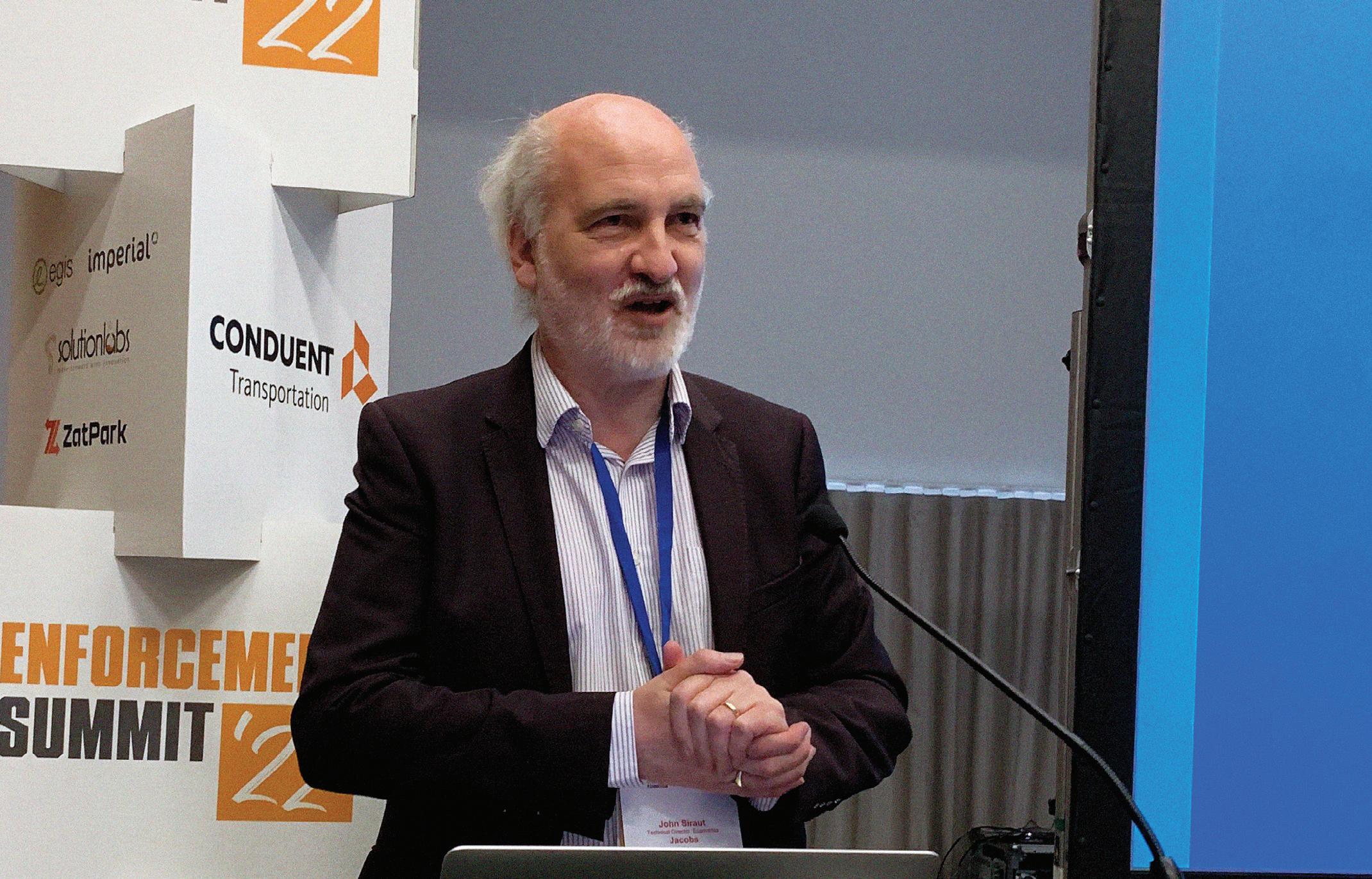
Economics and enforcement, what on earth do they have in common? If we ran the world smoothly there would be no need for conferences like the Enforcement Summit or magazines like Parking Review because everybody behaved themselves.
But sadly, people do not follow the rules. Therefore, we have people who enforce those rules and who make a living from doing so. Economics can help improve the level of enforcement, or rather the level of obeying the rules.
Let’s start off with why do we need enforcement? The answer is simple: people break rules. There are a number of reasons for this. They include people:


• not knowing the rule exists
• not understanding the rule
• not accepting the rule
• not understanding likelihood of being caught
• not fearing the penalty if caught
• weighing up the benefits breaking the rule.
The first two have nothing to do with economics. They are really about sorting out the signs and lines, which would address the people who do not know about a rule in the first place. The next main reason why we often do not follow rules is we don’t accept them. We have seen a lot of backlash recently about the introduction of 20mph zones and Low Traffic Neighbourhoods (LTNs). In the London borough where I live people who have rejected the idea of having LTNs have gone out and vandalised the signs.
Even if you do accept the need for rules, you will be going through some rational decisions when complying. What is the likelihood of actually being caught breaking those rules? Is there
no chance being caught? You may feel that breaking a rule is not actually having any impact on anybody. And, if you do get caught, what are the penalties for being caught? The key thing from an economics point of view is the weighing up of costs and benefits. If you get caught, you have to pay a charge or some sort of penalty. But what if the benefits of breaking the rule are actually greater than the cost incurred by breaching it?
Now for a history lesson. Back in the 1960s. The world of motoring was the real Wild West. Speeding limits were basically driven by the fact your car might fall apart if you went too fast rather than anybody actually enforcing any rules. People went out drink-driving with impunity. And you could park anywhere you wanted. As we moved forward, things started to improve. But even in the 1980s you could park almost anywhere with impunity.
The number of traffic wardens that police authorities were allowed to employ was dictated by the Home Secretary sitting in his office in Whitehall (and it was a ‘he’ in those days). Back in the early 1980s, the Metropolitan Police was limited to having 1,200 traffic wardens. The cost of just paying their wages was actually greater than the revenue brought in by the fixed penalty notices that they issued.
It is thus understandable why the police were not interested in enforcing parking. They lost money doing it. It may have been an exaggeration, but when the local authorities were lobbying government to decriminalise parking enforcement, for example in Kensington & Chelsea, they argued that only 1% of illegally parked cars were actually ever given a fixed penalty notice. So, you had a situation where even when you did have enforcement, the chances of you being caught were extremely limited. Why would drivers obey rules when nobody was enforcing them?
Carry on a few years and we saw the decriminalisation of parking enforcement which led to a whole new industry and sector being developed, an incredibly successful sector in the
If you get caught, you have to pay some sort of penalty. But what if the benefits of breaking a rule are greater than the cost incurred by breaching it?
John Siraut
sense of how it radically improved the chances of people being caught if they were to break the law. While it started off with parking enforcement, the sector’s canvas has expanded to encompass enforcement of speed limits and the violation of bus lanes, yellow box junctions and banned turns.
There was a newspaper article a number of years ago in which a journalist investigated how efficient parking enforcement was. They parked a number of cars around London in different boroughs to see how long they would take before they got a penalty charge (PCN) put on them. The longest time it took for a vehicle that had been illegally parked to be issued a PCN was about 10 minutes.
The newspaper had given us as a great example of local authorities screwing the motorists and extracting large amounts of money. The flipside, of course, was that the headlines showed the huge efficiency improvements that were being driven by the private sector working in conjunction with the public sector to actually enforce the rules and keep traffic moving on the network. Now we had a situation where the chance of being caught had changed dramatically.
We know price changes people’s behaviour. Remember the days when you used to get free plastic carrier bags given to you at supermarkets? Then the Republic of Ireland became the first country to introduce a very small charge – 10 cents if you wanted a single use plastic bag. Usage of carrier bags fell from around 300 bags per person per year down to just over 10. A very small charge had dramatically changed people’s behaviour. So surely, a very small charge will change people’s behaviours in terms of enforcement of traffic regulations. Well, you’d think so.
How do we explain the fact that in 2020 to 2021, which was when we were in the middle of the pandemic, when there were lockdowns with people being told to work from home if possible, we still managed to issue 11 million PCNs in England alone? Six million of those PCNs were for parking. One and a half million PCNs were issued to people who forgot to pay the Dartford in the Thames, a charge of about £2.50.
What is going on here? Why aren’t people changing their behaviours? In London, we see on average around 5 to 6 million PCNs issued per year. There was a dip in about 2008, but that was more to do with the situation in the economy rather than people changing their behaviours.

Let’s consider speeding. Many people do not like 20mph zones. Not only do they not like them, they don’t follow their rules. Over 80% of motorists exceed 20mph speed limits across all vehicle types. Around 20% exceeded by more than 10mph. Things get slightly better when you look at 30mph speed limit. Slightly better. But when you look at motorways, you get an interesting picture. Some 50% of car drivers and light goods vehicle (LGV) drivers exceed the motorway speed limit. But virtually no heavy goods vehicle (HGV) drivers do, for the obvious reason of speed limiters in their cabs. They actually cannot break the speed limit.
We fine people for parking illegally or driving too fast, but in certain instances we also give people points on their driving licence. There are different behaviours between genders. It probably does not come as a surprise to discover that men are twice as likely to have points on their driving licence than women. It is probably not surprising either that the younger you are the more the likelihood is you have points on your licence. But remember, the points on your licence normally only stay there for three years, depending what you have been found guilty of.
In theory, when we get to 12 points we are banned from driving. But the reality is that 20% of drivers who have 12 points on their licence managed to persuade the magistrate’s courts not to ban them and they continue to drive. You have seen the newspaper stories about people are still driving around with 30 or 40 points on their licence. We try to change people’s behaviour by giving them points on their licence. But again, does it really change their behaviour?
Proportion of driving licence holders who have points by age and gender
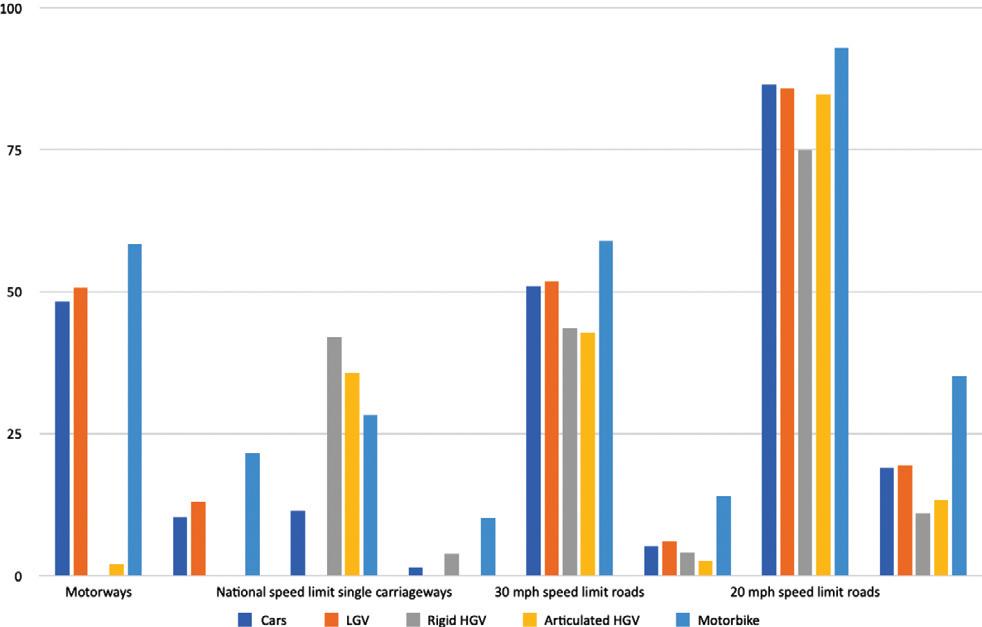
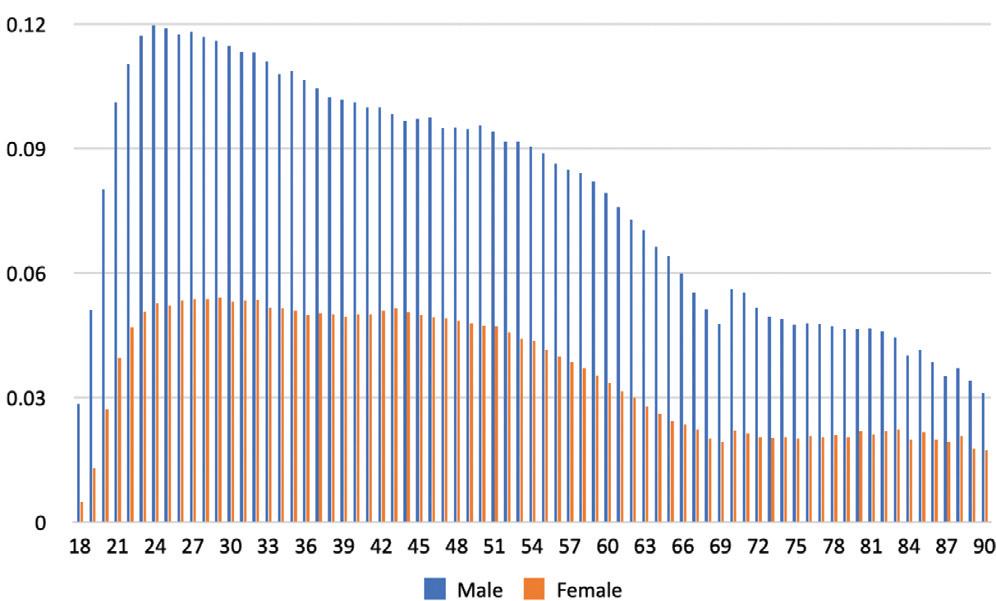
Things comes back to costs and benefits. We issue fines to parents who take their children on holiday in school term times. If you were to take your family out and go on holiday one week outside the half-term period you could save yourself anything from £800 to £1,600. The fine for taking your children out of school is £60 per child per parent. So, if a family of two parents and two children who take their children out of school could potentially be fined £240, who would not make a rational decision and say: “I am going to save up to £1,600 on my holiday.” In this context, deciding to pay a £60 fine for taking their children out of school makes perfect common sense.
This is a classic situation where the benefit is far, far greater to you than the costs of fine. That is, if you actually get fined, as lots of local authorities will not bother.
It is very hard to find figures for costs and benefits of parking. So let’s go to New York, where figures suggest around a third to a half of all parking fines are issued to commercial vehicles. New York has a system called the Stipulated Fine Program. Businesses that sign up to the programme pay a discounted fine on the condition that they do not pursue an appeal.
New York has a quite a complicated system of fines that depend on the violation committed. For example, if you were to park outside a fire hydrant you will be fined $400. For this type of fine, 50% of the appeals are successful, so the Stipulated Fine system assumes that if you appealed half your fines would be set aside. Therefore the discount given will be 50% for that particular violation. Commercial fines in New York paid by the companies which are signed up to this programme came to over $180m in a year, with two companies paying the biggest share of that: FedEx paid $14.9m and UPS $33.9m. The latter tellingly said: “UPS pays for parking tickets that result as a cost of doing business in order to support the flow of critical commerce.”
On the streets of London
Now for three stories about vans in London. Westminster City Hall is within a two minute walk of a Royal Mail sorting office. The loading restrictions come on there at 8am. Parking attendants will have a briefing session at Westminster City Hall, come out of the city hall at 8am and the first thing they do is to go around to the Royal Mail and issue a PCN on the waiting Royal Mail delivery vans. A journalist went out with the parking attendants for the day to see what they were doing.
The reporter noted one of the registration plates of the Royal Mail vehicle and put in an Freedom of Information (FOI) request to Westminster City Council to find out how many times this vehicle had received a PCN in the year. The vehicle had received 75 PCNs. This is a cost of doing business that was not changing behaviour. It is just issuing its penalty notices.
Another story from Westminster. There is currently a problem with ice cream vans that park on Westminster Bridge, which is a high security location with double red lines. This was regularly raised as a complaint because people queuing up to buy their ice creams were standing in what is actually a cycle lane. Transport for London comes along and tickets the ice cream vans every day. The Metropolitan Police said: “We are aware of this issue and the vehicles are issued with red route TfL fines. We are working on a longer term solution as this enforcement clearly does not deter them and we will provide you with an update when we can.”
The problem recurs because the profits made by the ice cream vans are far higher than the fines.
Now the third tale. Jacobs carried out a study for Westminster City Council on street markets a number of years ago. What we
found from talking to the stallholders was they were quite prepared to see their vans ticketed every day for parking on the street market because they wanted the van close at hand in order to get to their stock. To hire a place in central London to keep their stock will be astronomic, so it was cheaper for the traders just to take accept the fact that they will probably get a fine. Or, if they were hanging around the van when the parking attendant comes, they probably would not get ticketed. Again, it was just a cost of doing business.
How do we address this? To increase the chances of people being caught, we could follow an American exam ple and introduce bounty hunters. In Austin, Texas, they are thinking about introducing a ‘bike lane bounty’ where people who spot a car using a cycle lane get a proportion of the fine that vehicle has to pay. It’s an interesting idea. Maybe we could introduce that in the UK and see what happens.
There are other ways that we can change people’s behaviours and economics. We talk a lot about behavioural economics, which is about the nudges we have to put in place to change people’s behaviours.



The impact of the drink-drive message is made clear in this US college poster
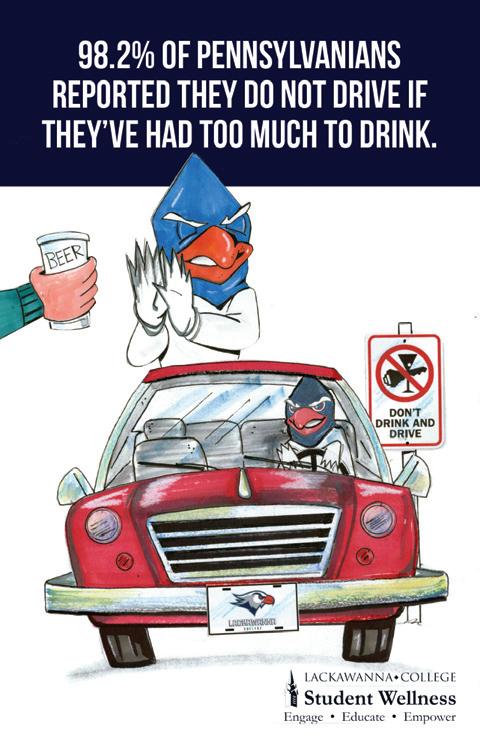
Time for another history lesson. Back in the 1970s drink-driving was all too common. People went out for a drink on a Friday night, had a few pints jumped in their cars and drove home and nobody thought anything about it. Lots of people did it. Then we had a massive campaign against drink-driving. There was lots of media coverage and the police went out and enforced the rules. It worked. We radically change behaviours so that it became completely unacceptable to drink-drive. Most people now would say they would not drink-drive. Indeed, they think it is completely wrong to do so.
Human beings are quite conformist. If I stood up on a conference platform in boots, a kipper tie and flared trousers, you would think that was extremely odd. Just as we conform with things like fashion, we conform in our behaviours. If we think everybody else is doing something, then the chances are that we will do that as well. Studies about corruption indicate that, if a country is regarded as corrupt, more corrupt behaviours take place because it is seen as a way of behaving.
In Britain, while we have changed behaviour regarding drinkdriving, we have failed miserably when it comes to speeding. Speeding is endemic. We have not changed people’s behaviours on speeding because we have not been able to persuade people that there is a downside to speeding for individuals.
We have the National Speed Awareness Course, which over a million people attend annually. The courses are offered to people where it is their first offence for speeding or jumping red lights. Yet, when we look at the likelihood of drivers re-offending based on whether or not they went on the course, there is actually very little difference between the two. The rate of reoffending is slightly lower if you have been on the course, but it still has not changed people’s behaviours enough in the same way we have done on drink driving. We still have a situation that, even where we have spent quite a lot of money and effort trying to re-educate people and explaining the downside of some of their behaviours, they still do not change what they do.
The danger created by ice cream vans plying for trade on Westminster Bridge was flagged up by cyclist Travis Nelson who travels with his deaf cat Sigrid
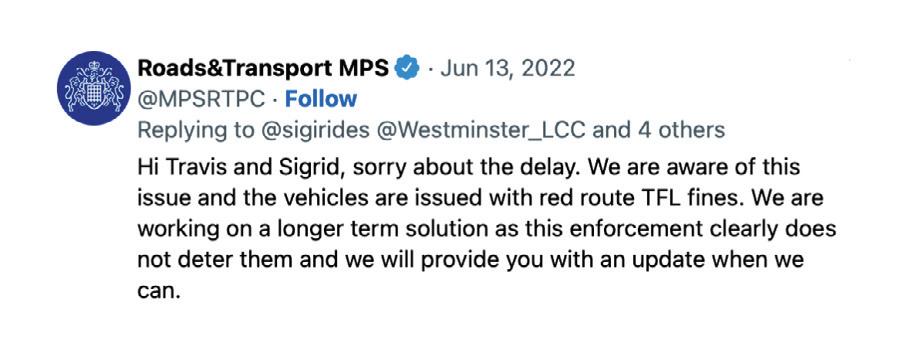
We do not like losing things. Take online booking sites that alert you that there are people looking at the same hotel or flight booking, or that you missed the boat on this one because it is fully booked. You are being warned you will miss out, so should act now to grab the opportunity. A lot of marketing and advertising



is based on encouraging “loss aversion” – the premise is that people do not like losing out to other people who are getting some benefit.
A number of studies have looked at how this sort of loss aversion impacts on people’s behaviours when it comes to things like parking. Take a campus university site where lots of people drive. There will be lots of issues with parking, so the authorities introduce parking fines where people are parking where they shouldn’t on grass and verges. But people just pay the fines. A bigger deterrent than a fine is being banned from coming into a car park for a period of time. To a driver the loss of parking is a greater loss than having to pay a fine.
So stopping people doing what they wanted to do is a big determinant. In South Korea, for example, once you collect a certain number of points on your driving licence it can either be suspended for a period of time, or it is revoked and you have to take your driving test again. Revoking the driving licence changed people’s behaviours more than just suspension, more than just points and more than just fines.
In Australia they have impounded vehicles to prevented drivers from using that vehicle. In the UK, clamping cars was actually a very effective method of changing people’s behaviour. If people could not jump in their car and drive away, that was a bigger deterrent than having yellow stickers placed on their car. But we have dropped the clamp because of a backlash against it.
We also don’t like doing things if they are a hassle, so it is great if you have a situation where you can be automatically enrolled. Consider organ donation. This used to be matter where people had to sign a card that signalled they had opted into to the scheme. Take-up was low. Now that the UK has an opt out approach to organ donation 80%-90% of people are in the scheme. This trend is seen in European countries that also have opt out schemes. But in those that have retained an opt approach, even with lots of publicity trying to persuade people to sign up to it, very few people join – less than 30%.
Making the payment of motoring fees automatic reduces infringements. On our roads, we have schemes for the London Congestion Charge and Mersey Gateway so that you automatically pay charges, even if you rarely enter the scheme area. These are good ideas, but still opt-in schemes. Now, imagine a parking app which actually could detect that you are parked somewhere and automatically pay – no penalty charge notices!
There are other measures that can be put in place using technology. Something like a third to a half of all PCNs are issued to commercial vehicles deliveries.
Here is a serious point. We have corporate manslaughter laws in this country. The directors of logistics companies know their drivers are breaking the law and almost require their drivers to break the law when they are making these deliveries. If there was a fatal incident involving one of these illegally parked HGVs, the directors of those companies could be legally liable because they
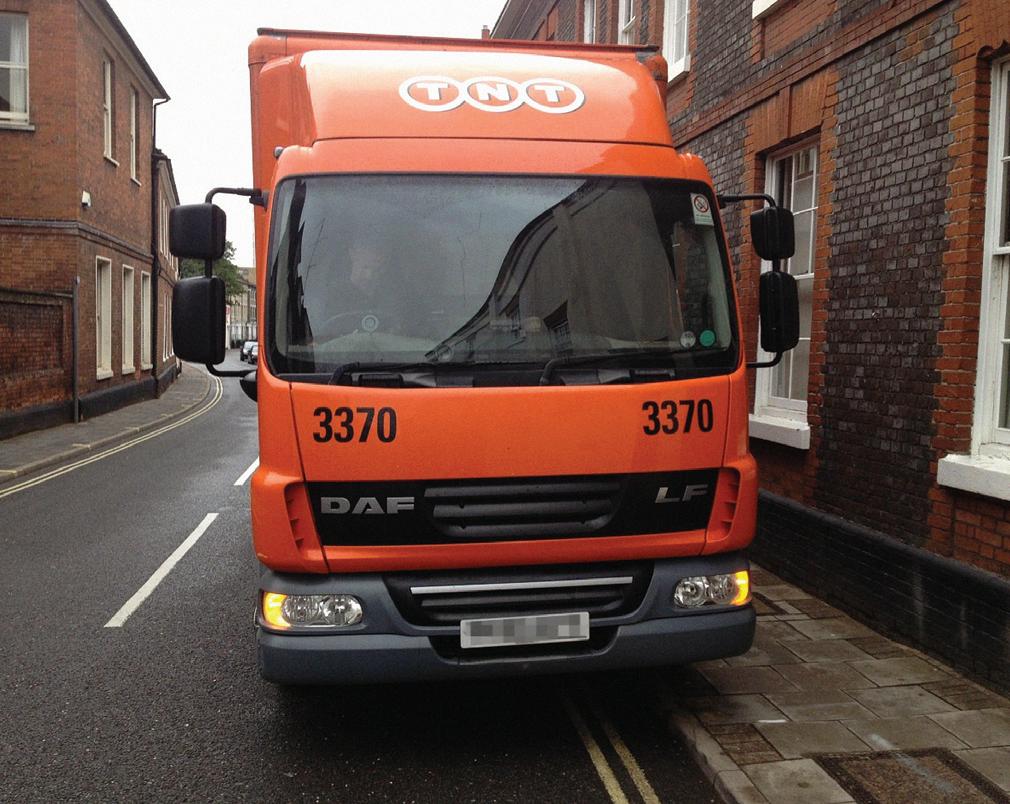
knew and turned a blind eye to what was going on. They knew their drivers were breaking the law and did nothing about it as it is a cost of doing business for them. If bad parking leads to a death or serious injury, they could then be liable.
There are solutions. Neil Herron, founder of Grid Smarter Cities, has devised the Kerb system which creates “virtual parking bays” along the kerbside which companies can book for designated time periods. Drivers arrive at designated time to unload and load. When the parking attendant comes along, they check that the vehicle has actually been booked on to a virtual loading bay. When you manage the traffic, you manage the safety implications.
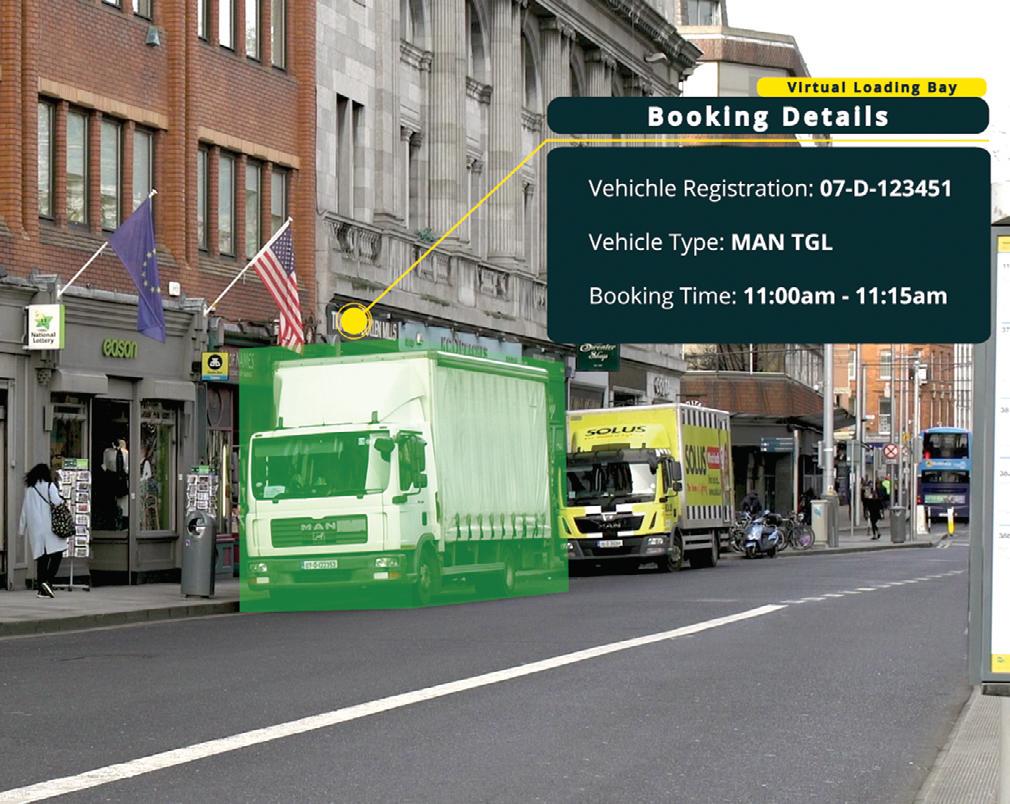
The end of enforcement?
Maybe the future is about nudging people’s behaviours to making them think about the implications of speeding and breaking rules. Perhaps we should be stopping people from doing some things rather than just giving them a fine. Maybe we should be finding ways of using technology to do what they are meant to do, but do it in a safe way.
We are moving towards a world of automated vehicles that will obey every single traffic rule going. But even here things become interesting. If you are in an automated vehicle that did not follow the traffic rules, who will be liable? You, a passenger, have no control over that vehicle. So it would be the company that made the vehicle who would be liable and would face penalties, or even damages, for breaking the rules. We know that works because we saw it with the speeding on the motorway network – HGVs do not speed because they have speed limiters in them.

Eventually, we will end up in a future where the computer stops us breaking the rules. Potentially, the future will be one where no enforcement is required.
John Siraut is technical director, economics at Jacobs www.jacobs.com

North East Lincolnshire Council won the Overall Winner trophy at PATROL’s 2022 Promoting Awareness of Civil Enforcement through Reporting (PACER) Awards. The competition recognises well structured, accessible reports that utilise the best available communication mediums. It forms part of PATROL’s commitment to promoting best practice in public information to increase understanding of traffic management objectives.
Laura Padden, director of PATROL, said: “On behalf of the joint committee, I’d like to congratulate North East Lincolnshire and all the other winners on their hugely impressive reports this year. The quality, creativity and scope of reports continues to get better, inspiring others to excel in their communications with the public, with yet more new authorities in the mix this time round. PATROL believes an annual report provides an opportunity to set out clearly and transparently the ‘what, why and how’ of an authority’s civil enforcement activities. In doing so, annual reports can provide the vital context around the traffic management objectives that lie behind enforcement, which are ultimately in place to meet the needs of residents, businesses and visitors.”
The team from North East Lincolnshire were presented with their award together with this year’s other award winners during a reception at the House of Commons on 12 July, hosted by Huw Merriman, MP for Bexhill and Battle and chair of the Transport Committee. The event was also attended by Transport Committee members Simon Jupp, MP for East Devon, and Ruth Cadbury, MP for Brentford and Isleworth.
The PATROL (Parking and Traffic Regulations Outside London) joint committee comprises over 300 local authorities in England (outside London) and Wales. The principal function of the joint committee is to make provision for independent adjudication in respect of appeals against penalties issued for traffic contraventions by local authorities and charging authorities in England (outside London) and Wales.
www.patrol-uk.info
Adjudication is delivered through the Traffic Penalty Tribunal (TPT). TPT adjudicators are wholly independent lawyers appointed with the consent of the Lord Chancellor and are supported by a small team of administrative staff.
The adjudicators decide appeals against penalty charge notices (PCNs) issued by authorities for parking, bus lane, moving traffic, Clean Air Zone and littering from vehicles contraventions. The adjudicators also decide appeals arising from road user charging enforcement, including from the Dartford-Thurrock River Crossing, Mersey Gateway and Silver Jubilee Bridge Crossings, as well as the Durham Road User Charge Zone.
www.trafficpenaltytribunal.gov.uk
The PACER Award winners were selected by an independent Review Group that included Lorraine Martin, parking services manager at Cheshire East Council, the winning authority at last year’s awards, Jo Abbott, former communications manager at the RAC Foundation, and transport consultant David Leibling.
“North East Lincolnshire’s report is attractively presented, easy to read and makes great use of statistics, graphics and imagery. It also features lots of engaging information putting the department’s work in context, content on new services, as well as useful guidance and links. It really is a standout entry and complete package, with lots of local character.”




“Dacorum’s report really puts the customer at the heart of its content, from a robust background on the service and recent statistics, to a section that identifies the different parts of a parking tariff sign – full of practical and useful information.”
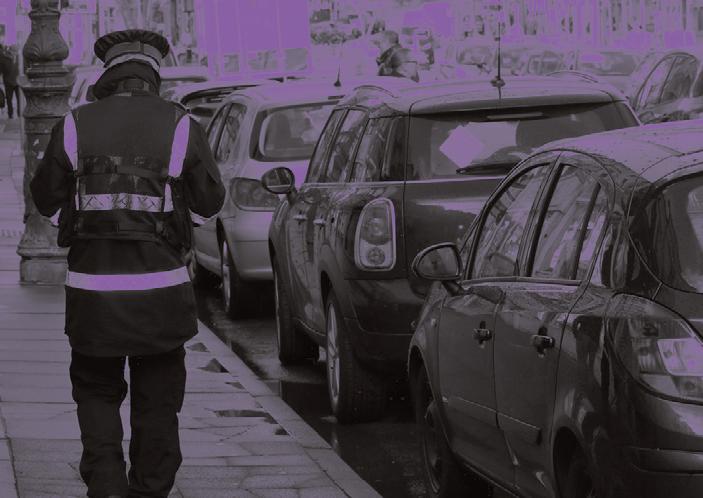


“The NEPP entry really stands out with a consistent and engaging design throughout, and great use of imagery to ‘bring to life’ and present information in a manner suitable for the content across the board. The report’s visual identity is matched on the service website.”
“Gloucestershire’s report dedicates lots of content to new and recent developments, from projects relating to electric vehicles and active travel, to how the team responded to the challenge of COVID-19, all vibrantly presented with good use of design and graphics.”
“Hampshire’s report makes great use of design to display, in a captivating, visually appealing way, a wide range of statistics relating to the operation and performance of the service.”
“The ‘less is more’ format to Devon’s report provides an excellent round-up of the service and team’s activities for the year in short, digestible sections, complemented by graphics that don’t distract from the content.”




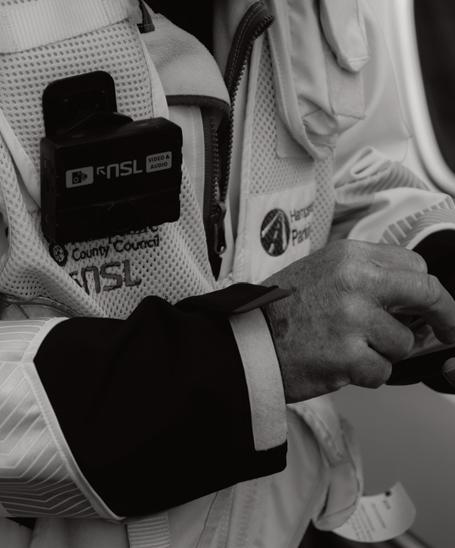




“East Sussex has produced a web-based report that features clear navigation and concise, digestible sections, including wellformatted financial figures and statistics. The online report is accompanied by a fantastic video in the introduction, presented by Cllr Claire Dowling, lead member for transport and environment.”
A scheme designed to improve the parking experience of disabled drivers, adult drivers with children and the drivers of electric vehicles has been launched.
ParkAbility enables drivers to use membership scheme cards that verify them as either being people with disabilities or as adults with children to gain hassle-free access to parking bays, electric vehicle chargepoints and a range of other services.
The scheme is the product an alliance between five companies: Osper, Nimbus, Project EV, Metric Group and Parking & Property Management.
ParkAbility was introduced at the Landor LINKS’s Enforcement Summit 2022 by Paralympian Mark Briggs, who is director of development at Nimbus.
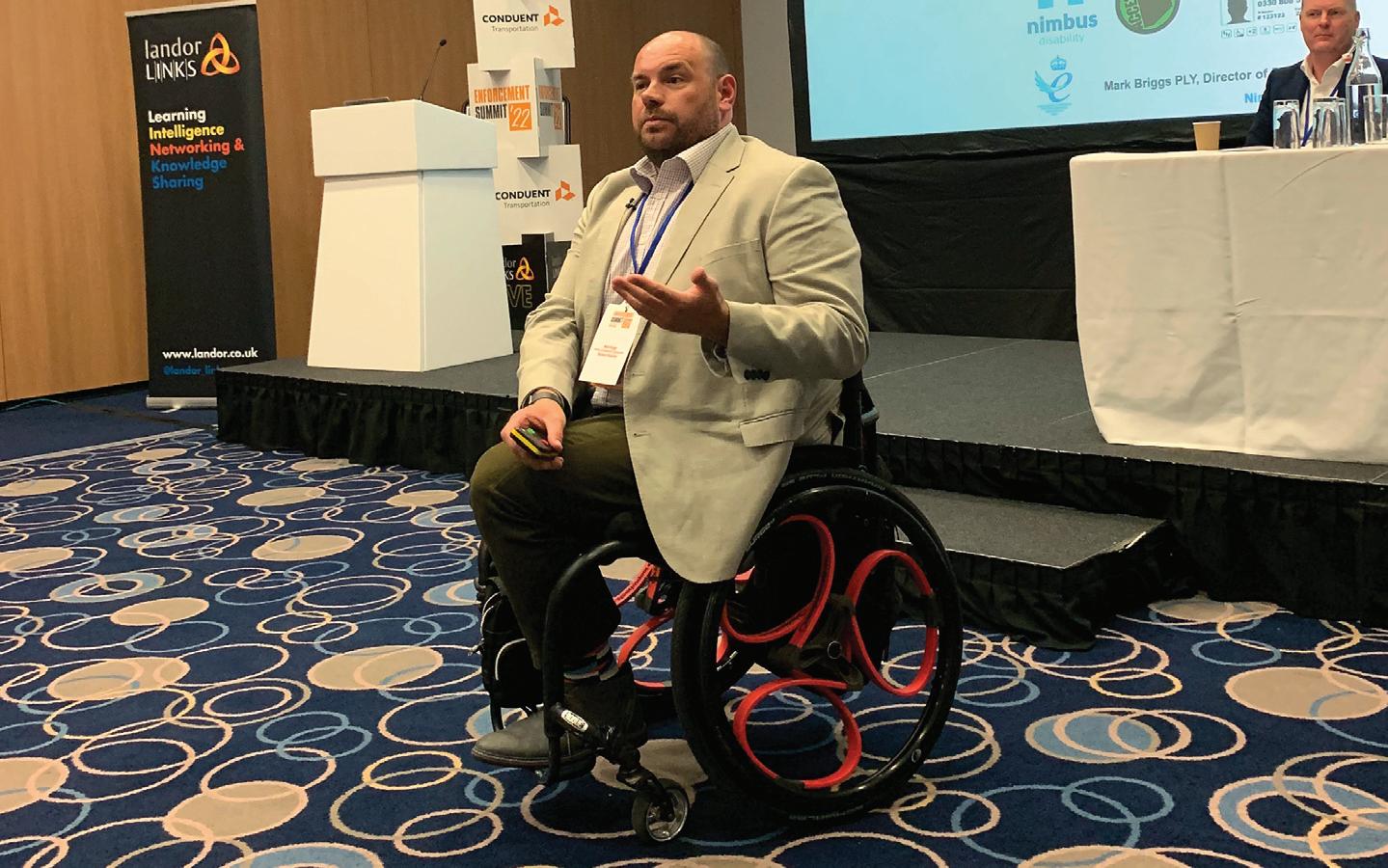
The parking service builds on the Nimbus Access Card, which has been developed for people with disabilities to alert retailers and other service providers to their specific needs in an automated manner.
“Our vision around ParkAbility is not to give a real-life opportunity to effectively park vehicles and charge EVs, but to protect these designated functions for disabled people,” Briggs said. “Our infrastructure is not just fully accessible and ring-fenced for those requiring it, but one that is implemented and ratified by those that will use it. We are proud to develop and protect a mobile future for disabled people.”
Also at the summit at Edgbaston Stadium was Karl Russell, director of operations at Parking & Property, and a founder of ParkAbility. “‘Parking’ and ‘parking spaces’ are normally associated with the negative
connotations of frustration, misuses and not being able to find an empty bay,” he said. “We have taken these under-utilised pieces of land and created a technologydriven product that will benefit everybody associated with their use.
“Primarily, ParkAbility is a fusion of separate technologies that have been brought together to promote, attract and identify certain demographics of drivers and customers, and empower them to use designated parking facilities with ease and without disappointment. The key to this solution is in our partnerships. In particular, our decision to link patent-pending camera technology with both the Nimbus Disability Access Card and Osper KidStart cars. In doing so, we have created a product that gives disabled drivers and adults with children more exposure to businesses, providing the opportunity to engage in a more mutually beneficial way.”
Ipswich Borough Council has installed a new parking guidance and management solution to reduce congestion and improve the driver experience throughout the Suffolk town.

Ipswich has several public car parks throughout the town centre and by the waterfront that can become extremely busy, especially during peak times. However, during its parking strategy review, Ipswich Borough Council identified inefficiencies in the existing process.
Clifford Oladun, parking services manager for Ipswich Borough, said: “These signs are helping people see where car parking is available when they are on their way into town. They are there to help people get quickly to where they want to go and this is part of the work the council are doing to make the town centre even more attractive and to assist the increasing number of those travelling to the centre of Ipswich. These signs have also been installed for their environmental benefits of reducing journeys and making air quality better.”
SWARCO Traffic was commissioned to deliver a
solution that encompasses both hardware and management software to meet their needs. In terms of technology, SWARCO has installed five variable messaging signs (VMS) throughout the town centre to display clear space availability arrows, featuring the number of free spaces in green or displaying ‘Full’ in red. This enables drivers to clearly see whether spaces are available or not in a particular car park from a distance and take the
Nimbus: Nimbus is a consultancy run by disabled professionals who help businesses. The Nimbus Access Card verifies disabled people’s access requirements and then digitally shares reasonable adjustments that businesses are required to make for them.

Osper: The Osper Card is a secure pre-paid debit card designed for under-18s.
Project EV: Project Better Energy has developed a range of fast and rapid electric vehicle charging points. Its Accessible EV Charging range is designed to be controllable with just a tap of the Nimbus Access Card.
Metric Group: Metric is a designer and manufacturer of solutions to meet parking and electrical vehicle charging needs.
Parking & Property Management: This parking operator specialises in the management of off-street car parks in a range of settings.
appropriate, safe course of action.
The VMS can also be utilised to display any image or text, so can be utilised for multiple purposes, including providing parking and traffic flow information, safety announcements and to clearly tell drivers and visitors of any events, maintenance works or road closures in and around the town. Data is sent to the signs by a series of integrated car park counters, control cabinets and inductive loops that record all vehicles entering and leaving a car park. It means the data and status of the car parks are presented in real time via SWARCO’s cloud-based remote management system, enabling the council to better manage parking availability and traffic flow.
Tony Gillings, project manager at SWARCO Traffic, said the main issue was co-ordinating traffic management: “Drivers were struggling to find available parking spaces, which led them to circulate through the town in search of somewhere to park, causing unwanted congestion and air pollution,” he explained. “Ultimately a solution was needed to improve the driver experience through clear communication that also reduced congestion.”
offer cashless and touchless payments without a bank account, charged directly to a mobile phone bill, or deducted from pay-as-you-go credit.”
Conduent Transportation has partnered with the Debit My Mobile (DMM) mobile payment service, which is a direct carrier billing service.
The direct carrier billing approach means drivers can pay for parking sessions and penalty charge notices (PCNs) via mobile phone with SMS text message capability.
Customers are presented with a QR code and mobile number printed directly on the PCN, allowing them to charge the PCN fine directly to their phone bill or deduct the payment directly from their pay-as-yougo credit. It can be used by those wishing to pay immediately or within the first 14 days. The solution can also support cashless parking payments.

Dean Fennell-Connell, Conduent’s sales director for UK parking and public safety, said direct
mobile billing gives drivers the option of fast, frictionless payments without the need for a bank account, credit card, or sharing personal data.
“Digital technology brings benefits to customers,” said FennellConnell. “With cash in decline, local authorities looking to reduce the number of pay & display machines, and customers

PayByPhone has expanded its UK operation with the addition of 21 new clients across England, Scotland and Wales between January and July.
The cashless payments specialist has won contracts from local authorities, hospitals, universities and a property company.
In England, PayByPhone added 19 locations across Hinckley and Bosworth Borough Council in the Midlands, and Southampton Council’s Active Nation outdoor sports facility, which covers two car parks.
PayByPhone also added five locations when it welcomed Whitehaven Harbour Commissioners, Cumbria, in May, to the client portfolio.
July saw Stoke-on-Trent, with five locations, one location in Oxfordshire with the National Parking Platform, and Staffordshire Moorlands District Council, with 19 locations, join the client roster.
Hospitals across England have also started working with PayByPhone during the first seven months of 2022. In London, Greenwich’s Queen Elizabeth Hospital and Lewisham’s University Hospital
were added to the PayByPhone portfolio. Outside the capital, the Northern Care Alliance NHS Group – with locations in Manchester, Bury, Oldham and Rochdale – and Leeds Teaching Hospitals NHS Trust have signed with PayByPhone.
PayByPhone took over from PaySmarti at four higher education sites – University of Bristol, Kent University, University of York and Imperial College. These contracts cover multiple car parks over 13 sites.
In addition, PayByPhone went live at the University of Southampton on 3 May and Mazecroft Properties in Leicester on 26 April.
In Scotland, PayByPhone won two new local authority clients. Aberdeenshire Council, with a contract covering 45 locations, saw PayByPhone introduced
becoming more reluctant to hand over their personal details, there is an increase in demand for cashless payments that are both convenient and low friction.
“Conduent can now offer a flexible payment solution that can sit alongside existing payment methods, giving customers added choice and a convenient alternative. Mobile payments
alongside the incumbent provider.
Ayrshire Roads Alliance, a public sector roads partnership that covers 57 locations, both on- and off-street, where PayByPhone replaced RingGo.
Also in Scotland, PayByPhone is now working with Edinburgh’s Queen Margaret University.
Two Welsh local authorities have also been added to PayByPhone’s portfolio. On 21 March, PayByPhone went live with Tywyn Town Council on the Cardigan Bay Coast across two locations. On 1 April , Flintshire County Council went live with a contract covering 35 off-street car parks.
Adam Dolphin, sales director for PayByPhone UK, said: “It has been a great 2022 so far, winning a wide range of business across England, Scotland and Wales. More local authorities and universities are trusting us with their parking payment needs over our competitors. We are committed to helping to simplify people’s journeys, especially those having to visit hospitals, where it is so important to ensure everyone has a stress-free parking experience.”
PayByPhone is subsidiary of Volkswagen Financial Services.
Chris Newman, Conduent Transportation’s UK regional director, added: “Our clients are interested in improving their customers’ experience with innovative solutions that are more convenient and easier to use. We’re looking forward to working with Debit My Mobile to launch this exciting new service this year and expanding the partnership to introduce new pioneering solutions in the future.”
Gary Corbett, director of Debit My Mobile, said: “We are delighted to be working with Conduent Transportation to implement mobile billing within local authorities. We see Conduent as an ideal partner given their position in providing payment and transport infrastructure and services to both central and local government clients.”

Rugby Borough Council has adopted the RingGo parking payment service. The two-year contract covers car parks.
The introduction of a cashless payment option follows requests from residents, said Cllr Derek Poole, Rugby’s deputy leader and spokesman for regulation and safety.
“Councils across the country were increasingly offering cashless payment for parking. The pandemic has accelerated the adoption of cashless payment across a wide range of our everyday activities, from banking to food shopping,” said Cllr Poole.
“During the pandemic we received a number of enquiries from customers who wanted to pay for parking via a cashless system, and our recent consultation showed that this is something most of our residents would welcome.
“We have listened to our car park users and introduced RingGo as a more convenient way to pay for parking.
“We haven’t forgotten about residents who don’t have a smartphone, however, as cash payments will remain available.”
Drivers will be able to pay for parking and settle PCNs via textsAdam Dolphin Carrier billing using QR codes
Urban Growth Company sets out plan to save space by consolidating parking in Solihull
The Urban Growth Company has submitted plans to build two new car parks next to the upcoming HS2 Interchange station in Solihull. The Urban Growth Company (UGC), a special-delivery vehicle set up by Solihull Council to maximise the growth opportunities associated with HS2’s arrival, has submitted a hybrid planning application seeking full consent for an initial car park and outline consent for a second.
Located at the 140-hectare Arden Cross development site on the outskirts of Solihull, next to the M42 motorway and near the NEC, the proposal is for the multi-storey car park to act as the key enabler for unlock ing broader plans to create a new destination known as the UK Central Hub, a project that could create thousands of new jobs and homes alongside new community spaces.

There is a pre-existing, legal requirement to provide car parking at this location and this was previously consented as 7,500 surface car park spaces. The UGC’s proposal is to consolidate those spaces in a phased multi-storey format, freeing up 30 hectares of land for high density development next to the station to create a vibrant destination consisting of homes and businesses.
The first of the multi-storey car parks would be constructed to support the opening of HS2 from 2029-2033. The structure would consist of approximately 4,000 spaces over nine floors, with the two lowest floors located below ground level, in addition to 500 surface level car parking spaces. This is possible as the site of a disused quarry has been selected as the site for the car parks, reducing their visual impact and making use of a location that would otherwise have been backfilled.

The second multi-storey, if required, would
be eight storeys in height, with one storey below ground level. This would comprise approximately 3,000 spaces and would be located on the site of the first phase surface car park. This would be constructed in time for the opening of HS2’s later phases.
The proposals for both car parks take account of current and emerging requirements relating to electric vehicle charging, as well as connected and autonomous vehicles in the future.
Jonathan Bretherton, managing director at the UGC, explained the strategic importance of the UGC’s alternative proposal for parking: “This application is about so much more than a car park; it’s about what it enables. The UGC plans mean that we will enable the creation of a world-class opportunity for new homes and jobs right next to the new Interchange Station and minutes from the existing Birmingham International station and airport when the HS2 people mover opens.
“This application marks incredible progress made by the public and private sector partners we work with, and it wouldn’t be possible without the £50m grant from central government and the £45m loan facility from the West Midlands Combined Authority. That collective commitment underpins an ambitious plan to create a truly outstanding destination which delivers economic and social benefits as well as unrivalled connectivity.”
A series of in-person and online engagement activities have been undertaken since March 2022 and feedback has been incorporated into the final applications. A decision from Solihull Council is expected in November 2022.

In November 2021, Vinci Construction UK was appointed by the UGC as its design and build contractor, with additional planning and architectural support being provided by Cundall, Associated Architects and Fira. The scheme being procured through Pagabo’s Major Works Framework. Vinci’s regional director Andrew Astley said: “We are delighted to be working with the Urban Growth Company and wider stakeholder team on such an important piece of major infrastructure that will support HS2 and substantially enhance the experience for commuters and visitors to Arden Cross. We are also working in collaboration with the growth company to maximise the social return on investment for the local area.”
Martin Faulkner, commercial manager at the Urban Growth Company, said: “The planning application and supporting design work are key to realising the internationalstandard development opportunity that is being enabled by the UGC around the planned HS2 station at Interchange. By committing to build the multi-storey car park, a £3.2bn mixed-use development proposal will become a reality for the West Midlands.”
Pagabo’s head of construction, Jonathan Parker, said: “We are really proud to be involved in this stand-out scheme, making sure that all of the infrastructure and development relating to the HS2 proceeds effectively and works towards making HS2 a roaring success. Submitting these hybrid plans is the first step in the journey, and we look forward to seeing the plans granted and continuing our working relationship with the Urban Growth Company and Vinci Construction UK as the scheme progresses.”
StructureCare
StructureCare has upgraded a basement car park in Leeds city centre. As principal contractor StructureCare was tasked with removing the existing failed floor paint coating system and undertaking substrate repairs, before applying specialist deck coatings and decorative wayfinding.
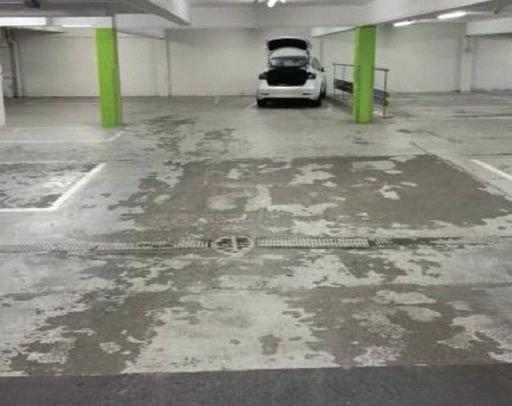

Due to the enclosed nature of the car park with a mere 1.77m height restriction, planning the works into minute detail were required.
StructureCare’s in-house logistics department arranged for plant and materials to be sent to site using suitable vehicles and unloading equipment.
Once site set-up was completed, the StructureCare team carried out a hammer tap survey to identify delaminated concrete, marked out the defective areas and undertook concrete repairs in accordance with British and European standard BS EN 1504.
Following the completion of the repairs the substrate preparation works were undertaken
which involved removing the existing failed floor paint coating system. This process was undertaken using captive blasting. This was necessary to ensure the specified deck coating system adhered to the substrate.
The final step involved apply-
ing protective deck coatings to improve the aesthetics within the basement car park as well as preventing further water and salt ingress into the concrete substrate.
Decorative wayfinding was also installed throughout including individual bay numbering.
The head of facilities management at South Parade said: “The StructureCare team were a pleasure to work with from enquiry all the way through to delivery. They really are experts when it comes to car parks, and I look forward to working with them on future projects.”
Wiltshire Council is investing £600,000 in the refurbishment of the Culver Street car park in Salisbury. The project started on June 18 and is expected to last for 16 weeks. The council awarded the contract to Logic Contract Services, which is working with renovation specialist Cemplas.
The work will see repairs to the structure, including to the columns, floors and brickwork, as well as full replacement of the flooring and ramps on all levels.
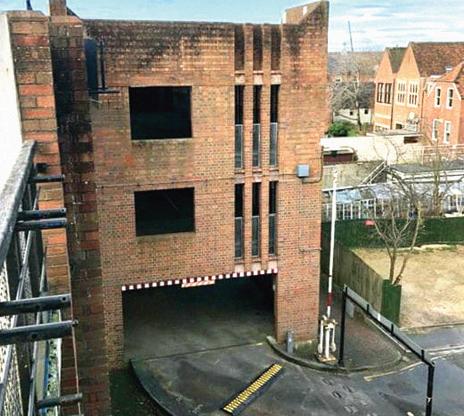
Repairs to the façade will involve the erection of a full external scaffold for brick pier repairs and strengthening. The external works include the removal of high level planters and new infill details.
The works include installation of new internal split level mesh panels and vehicle impact barriers.

gives city centre office parking a fresh new lookThe refurbished basement Culver Street The basement before works



